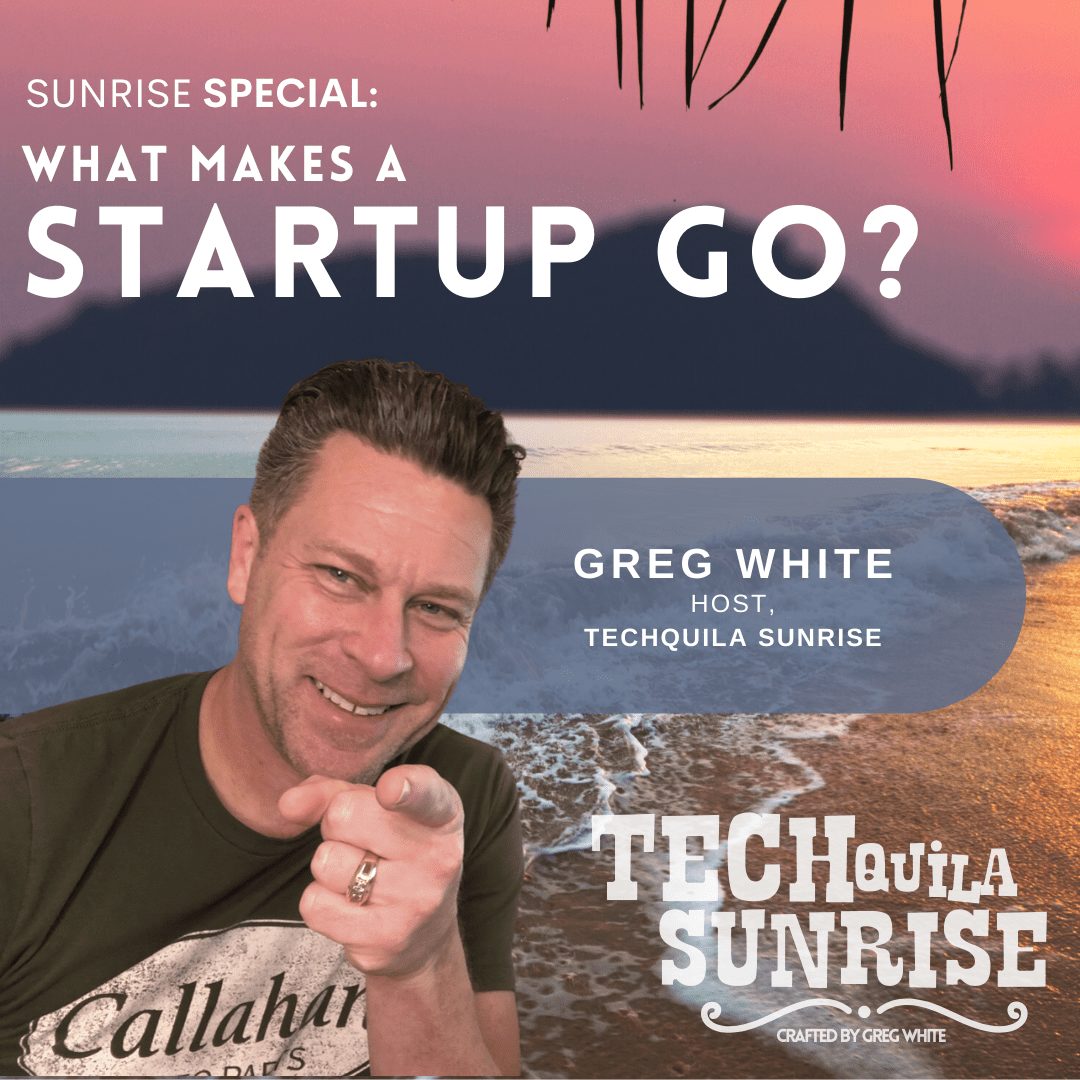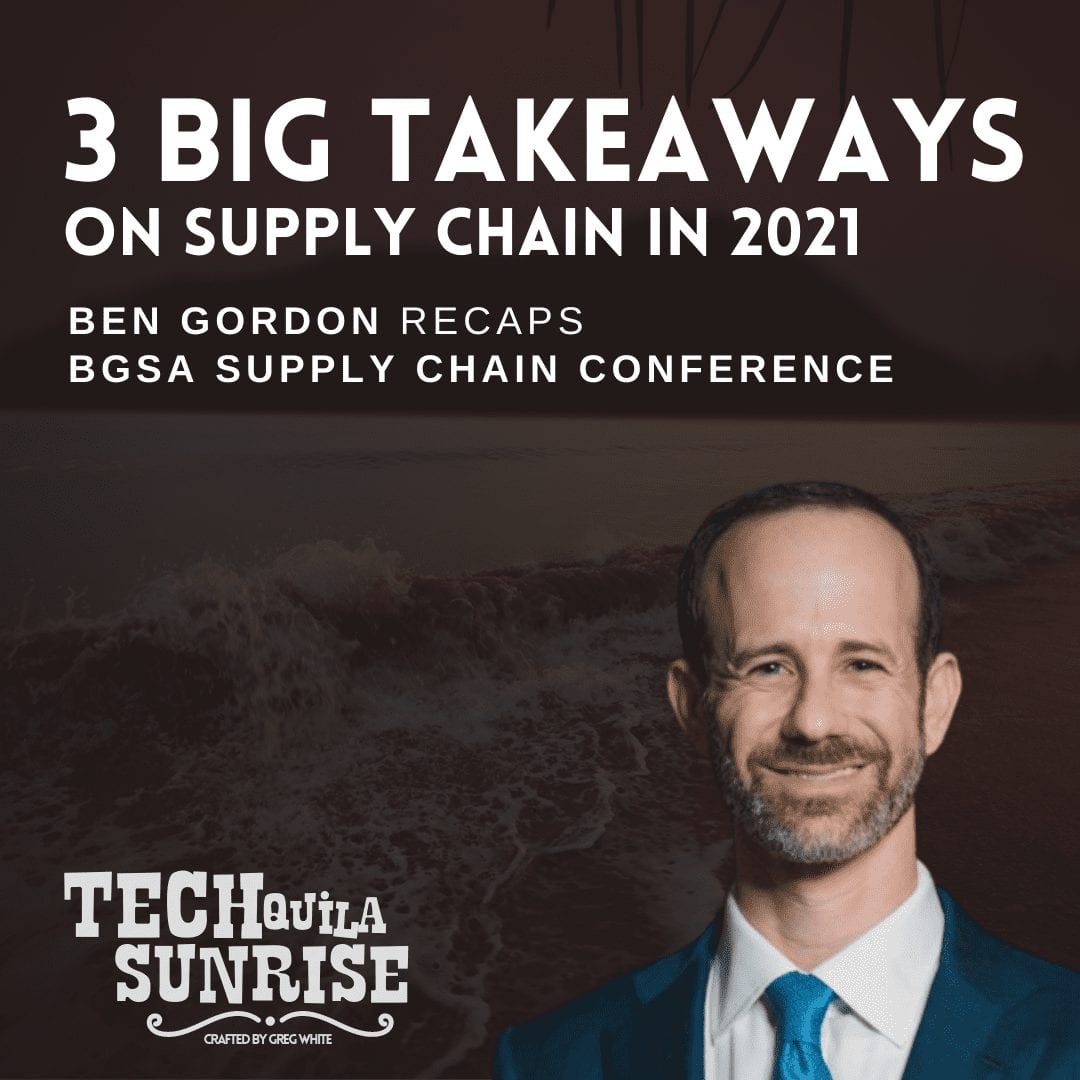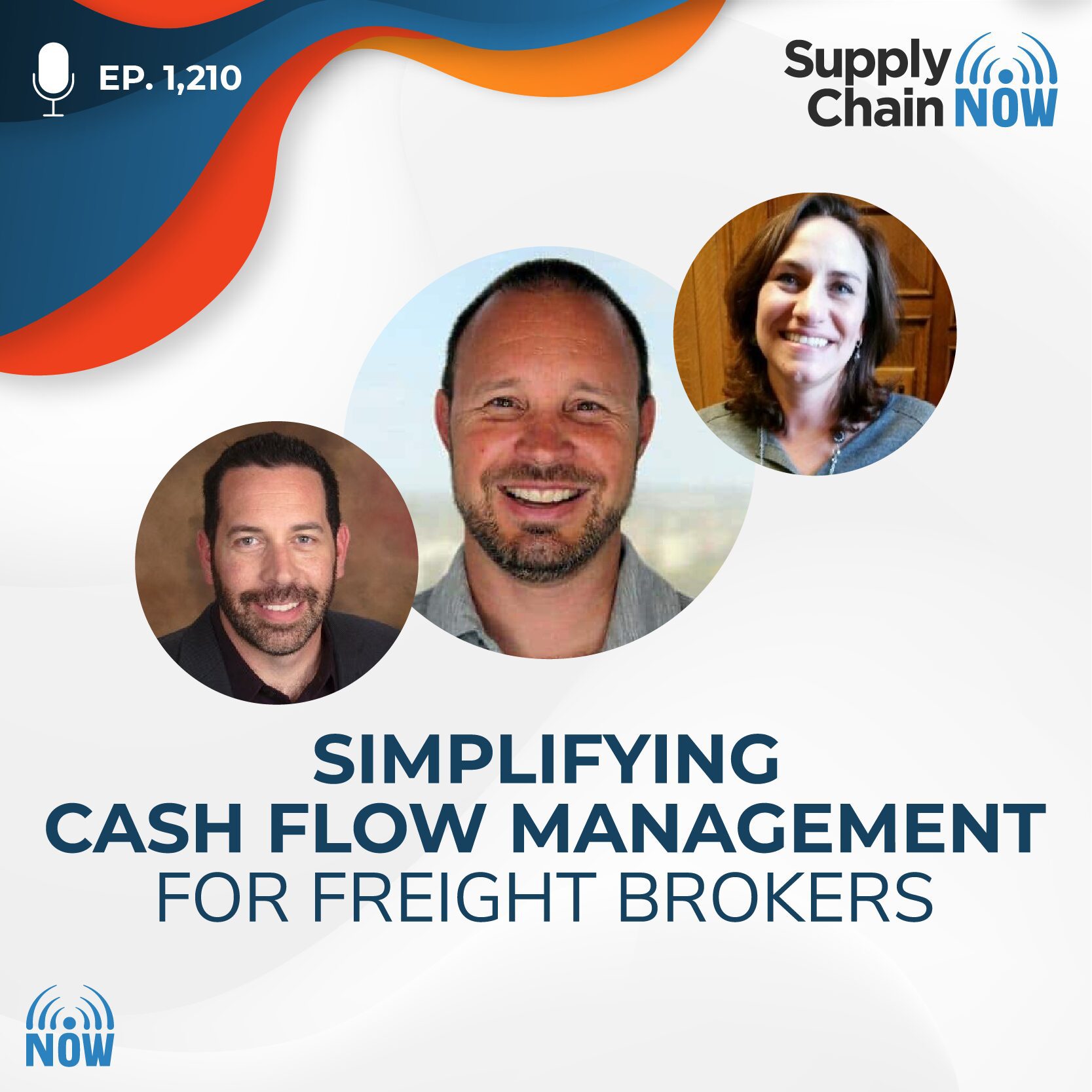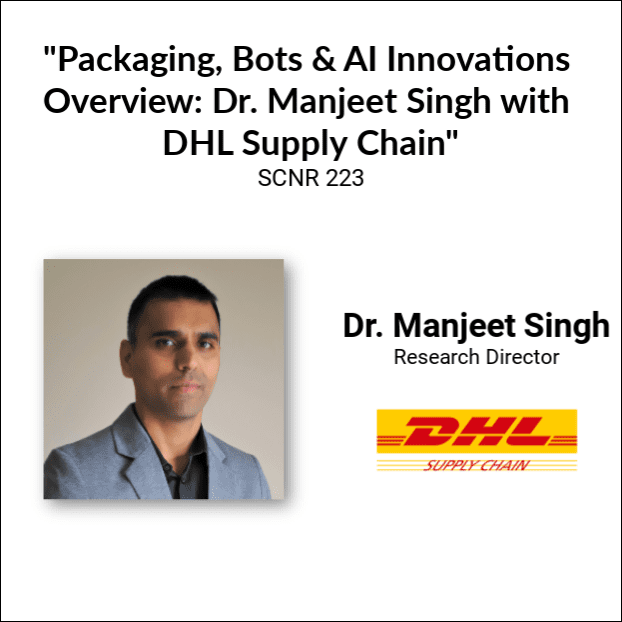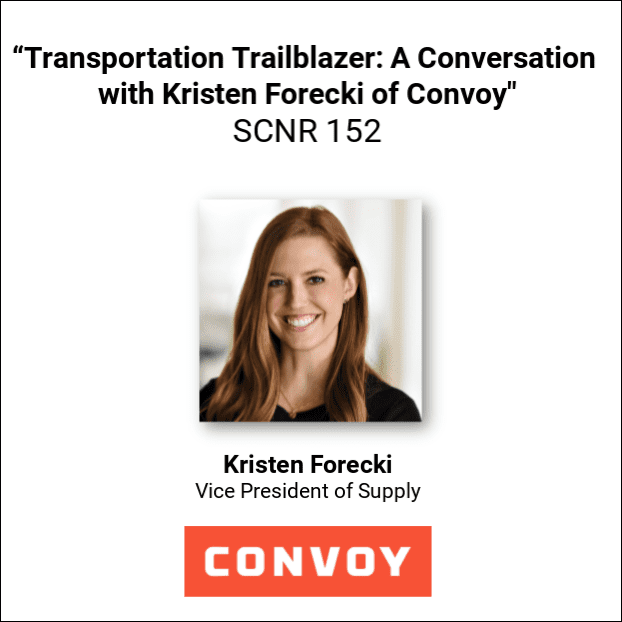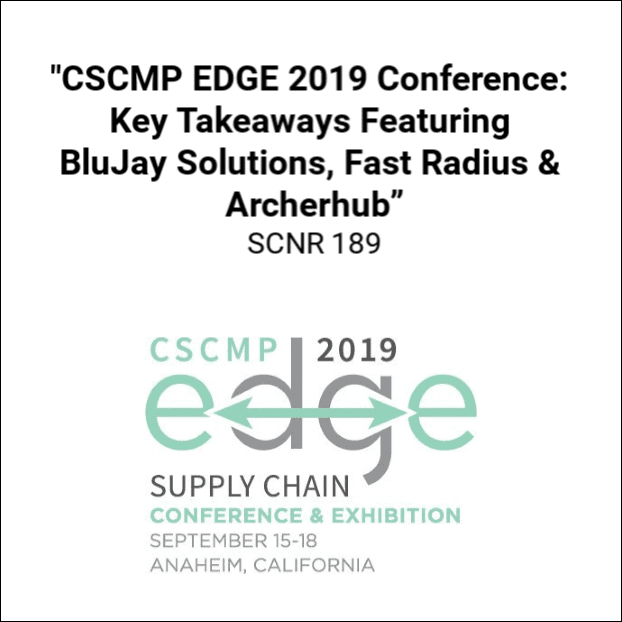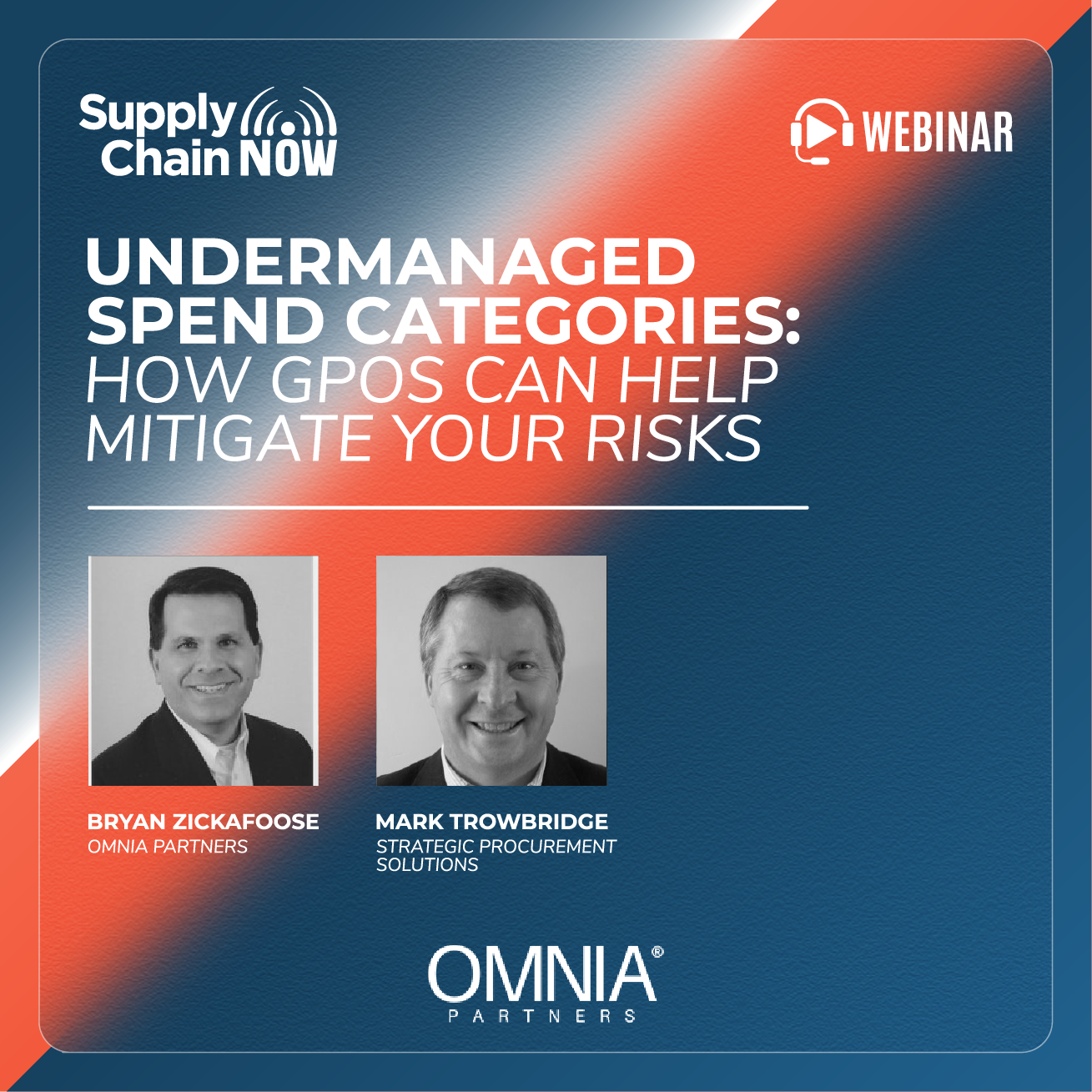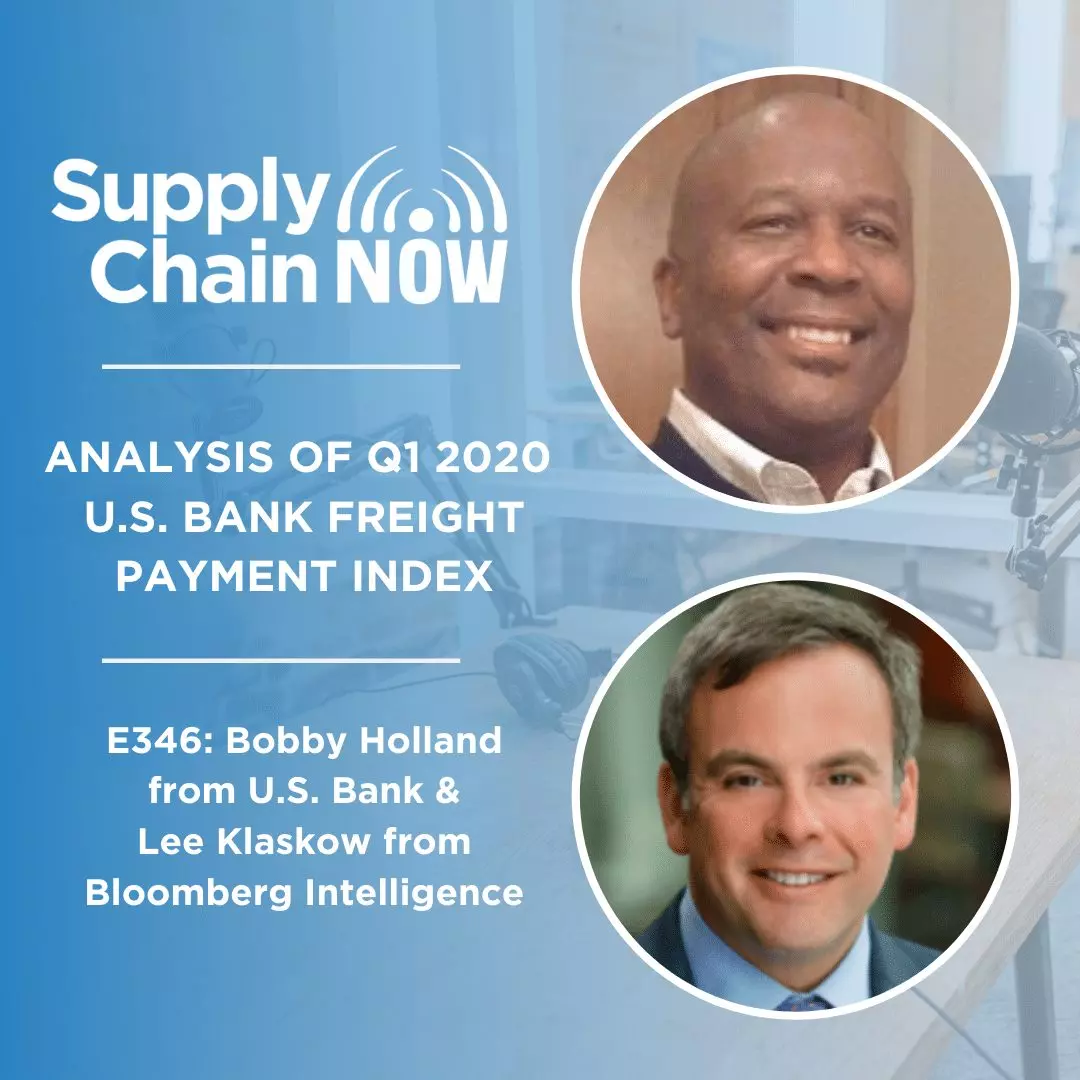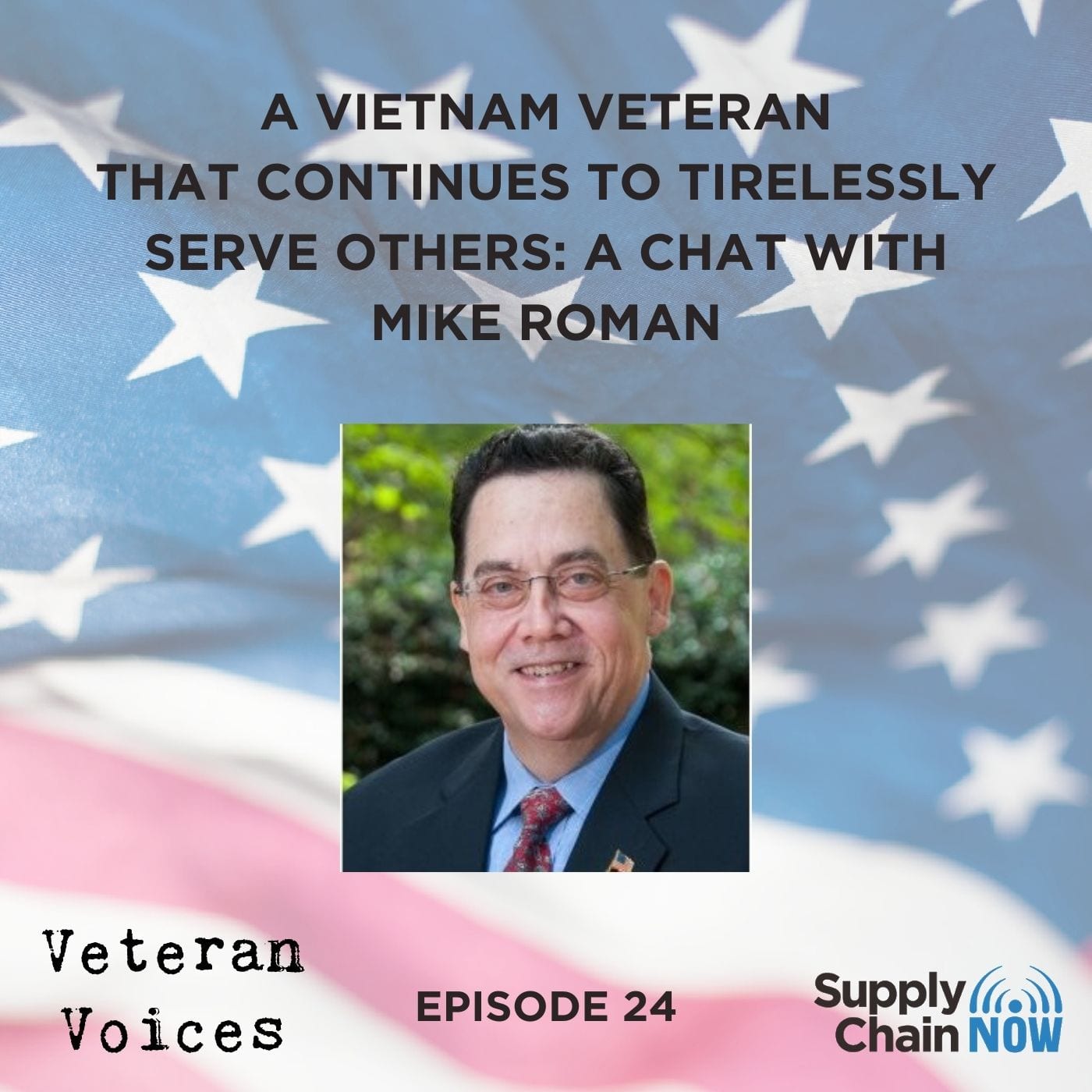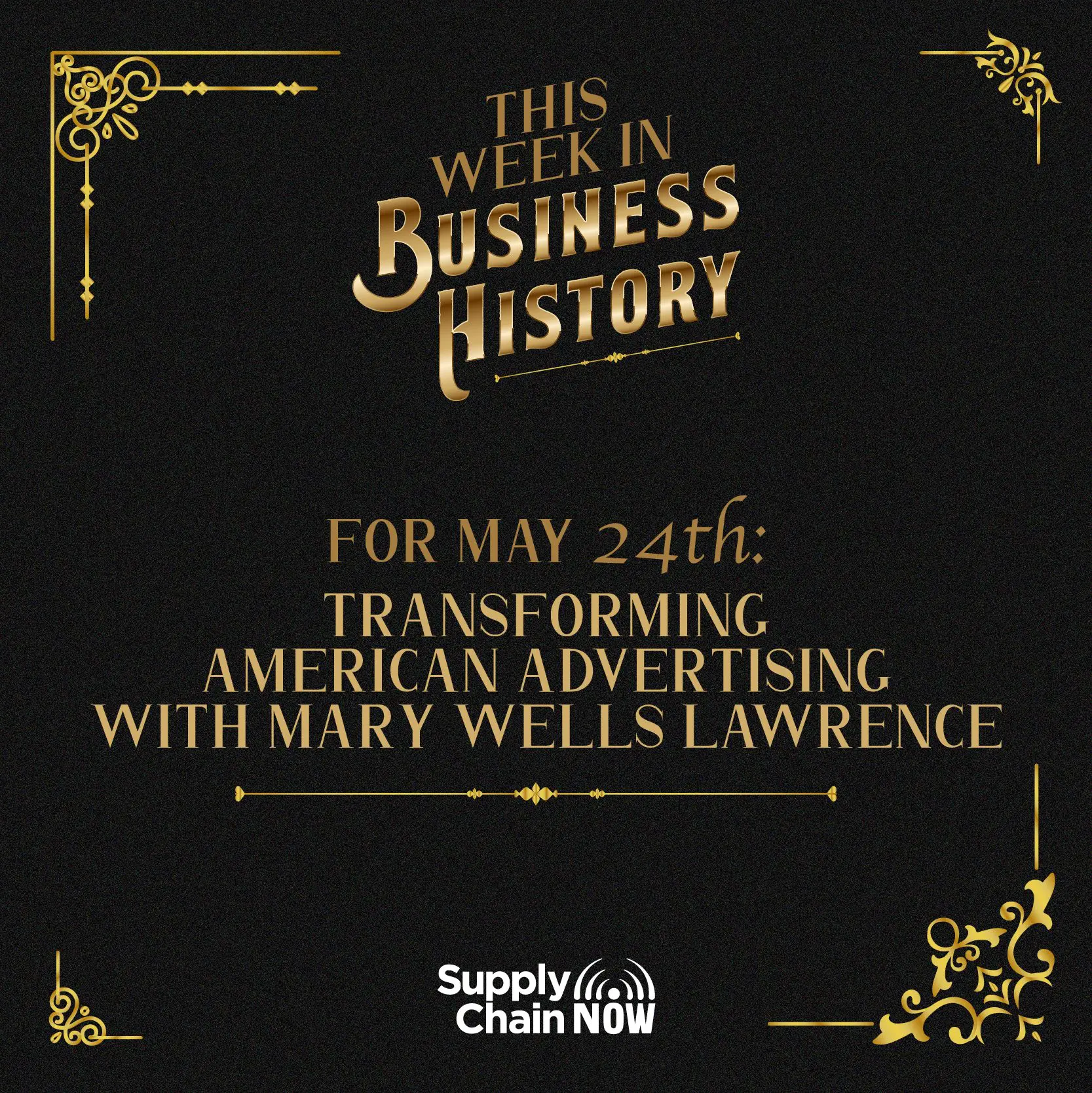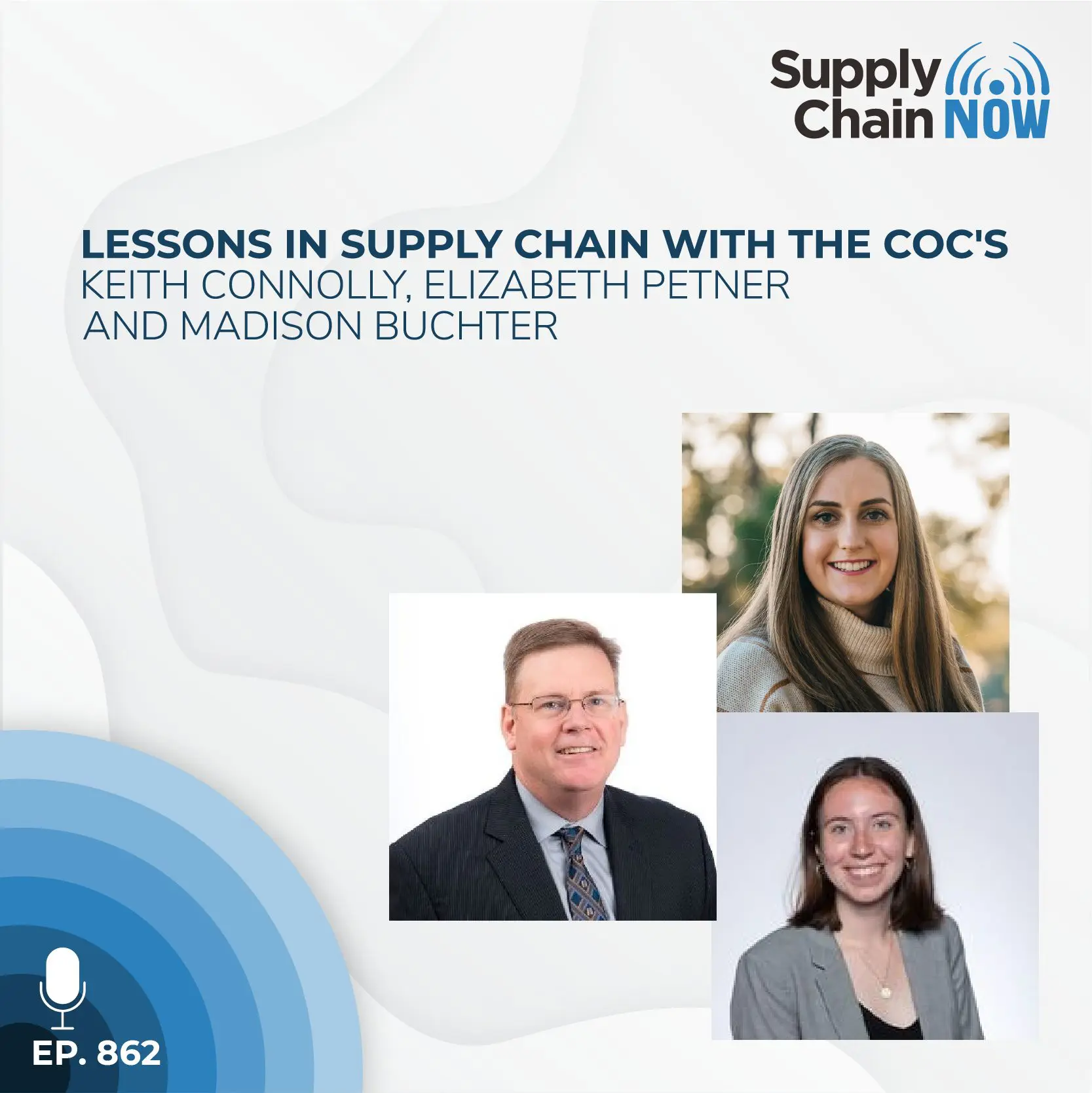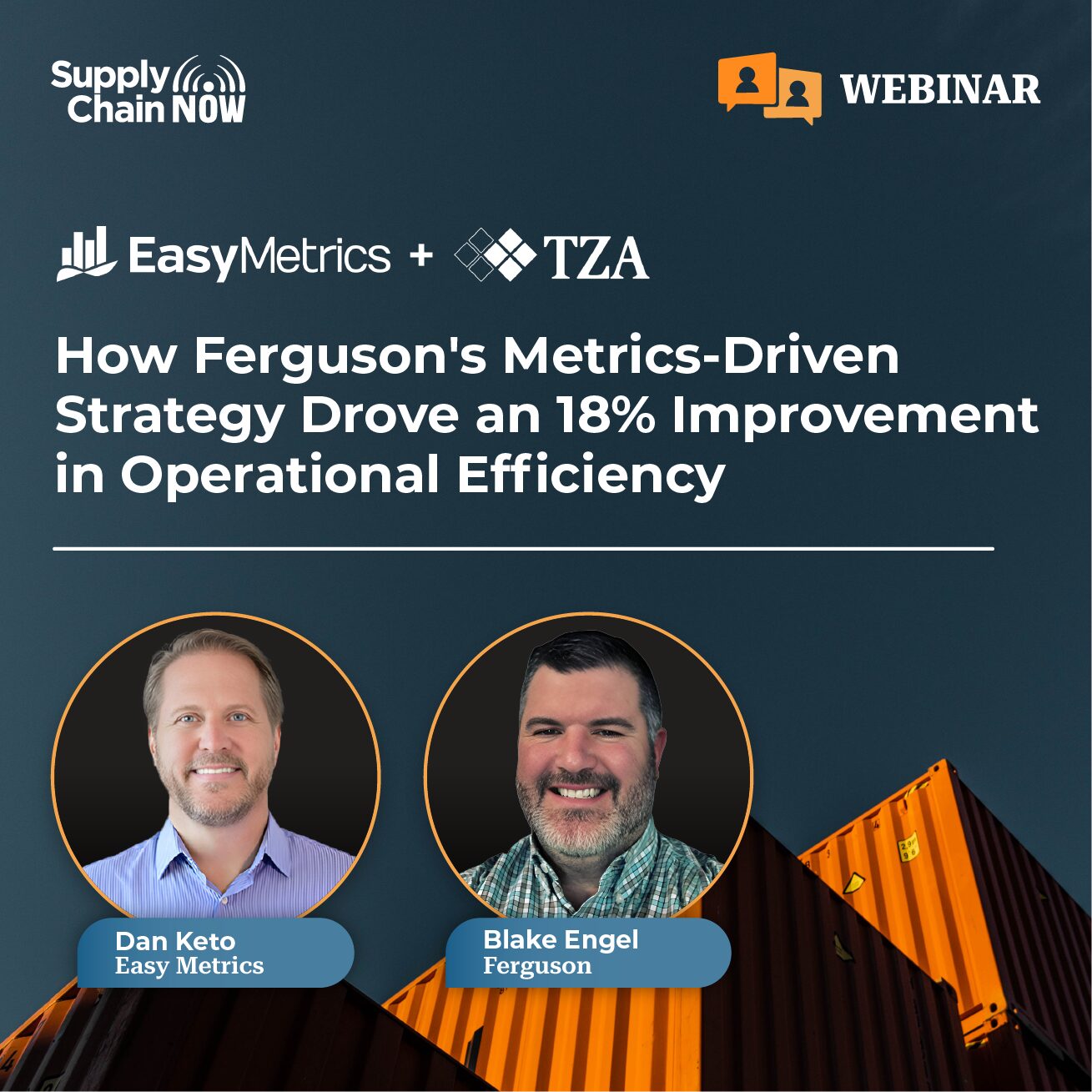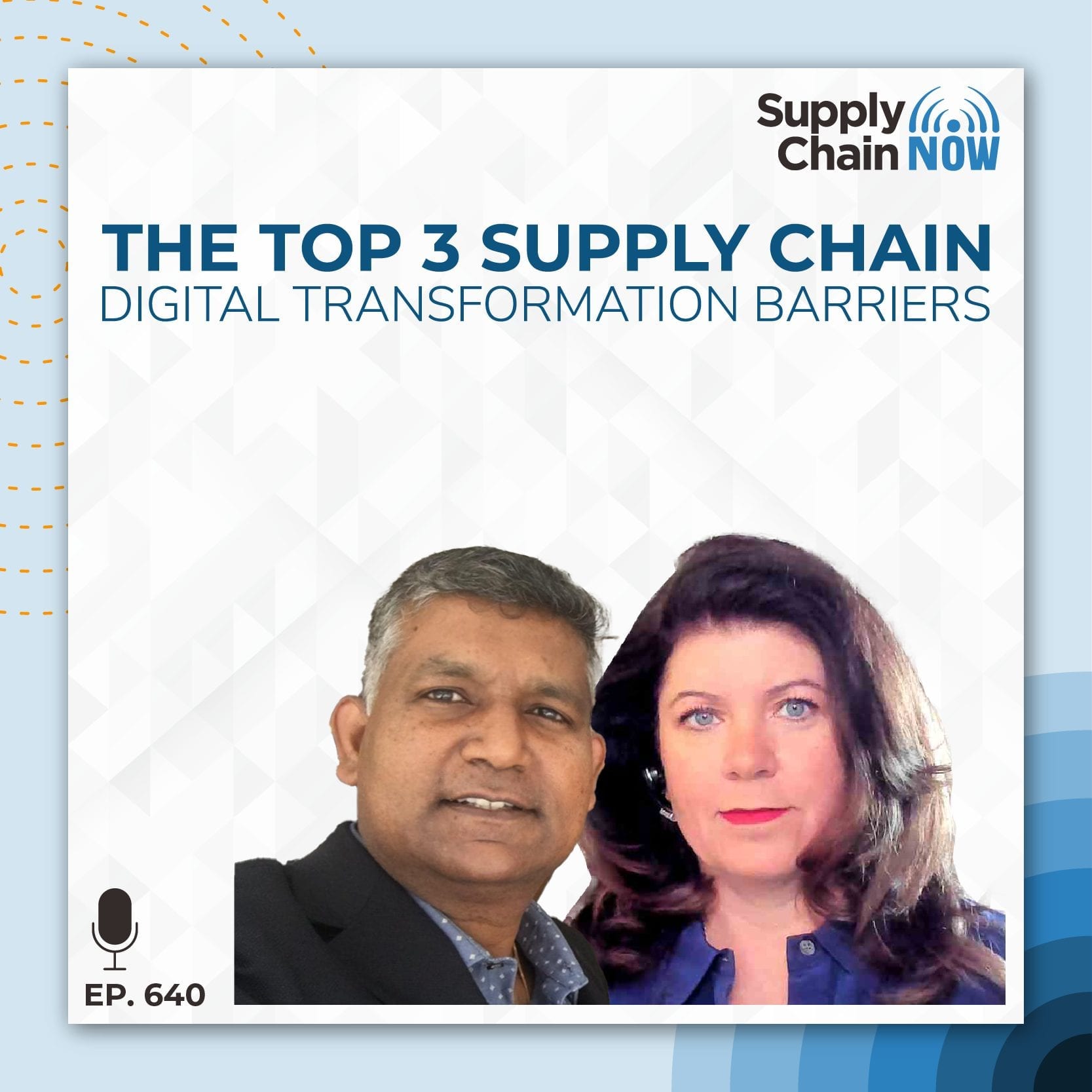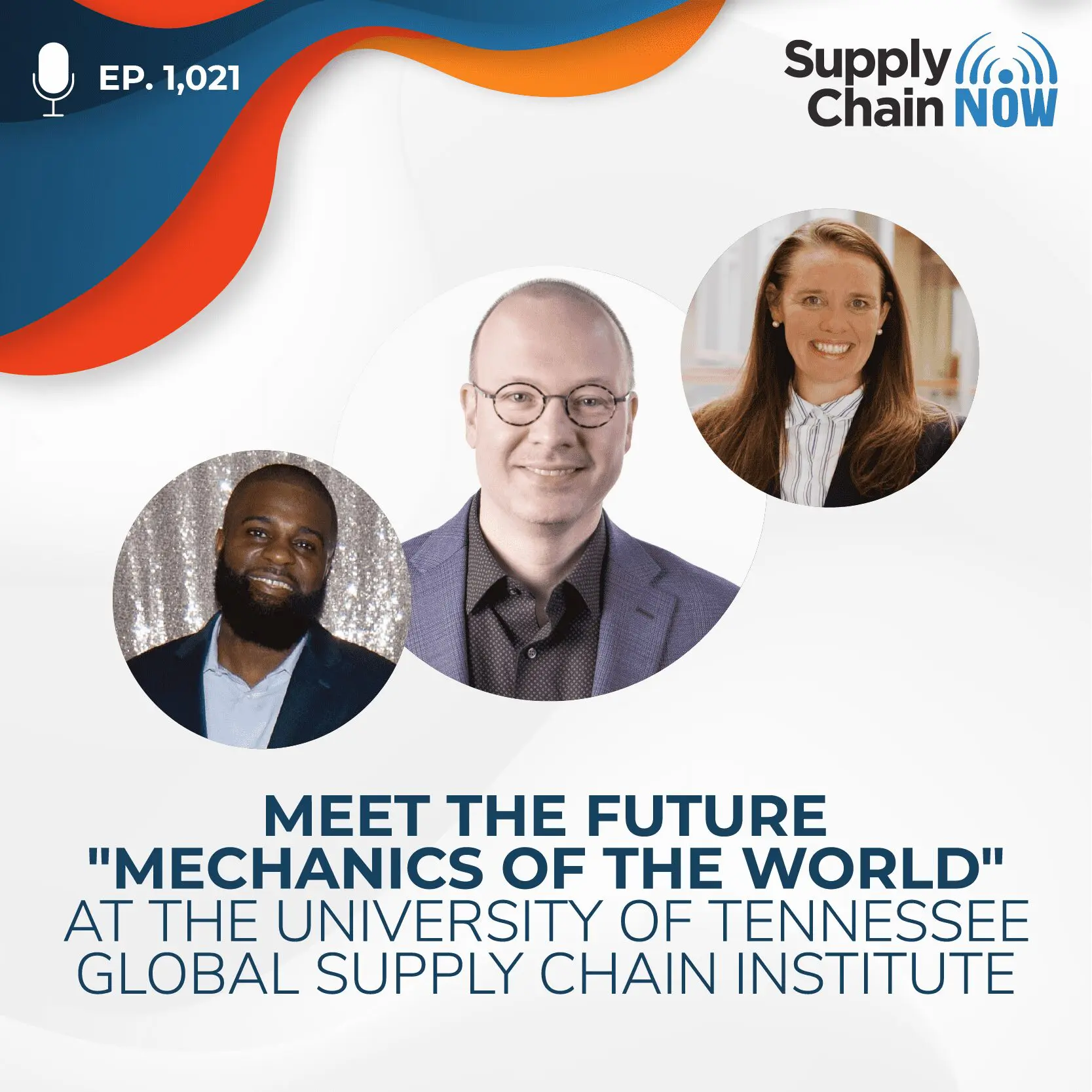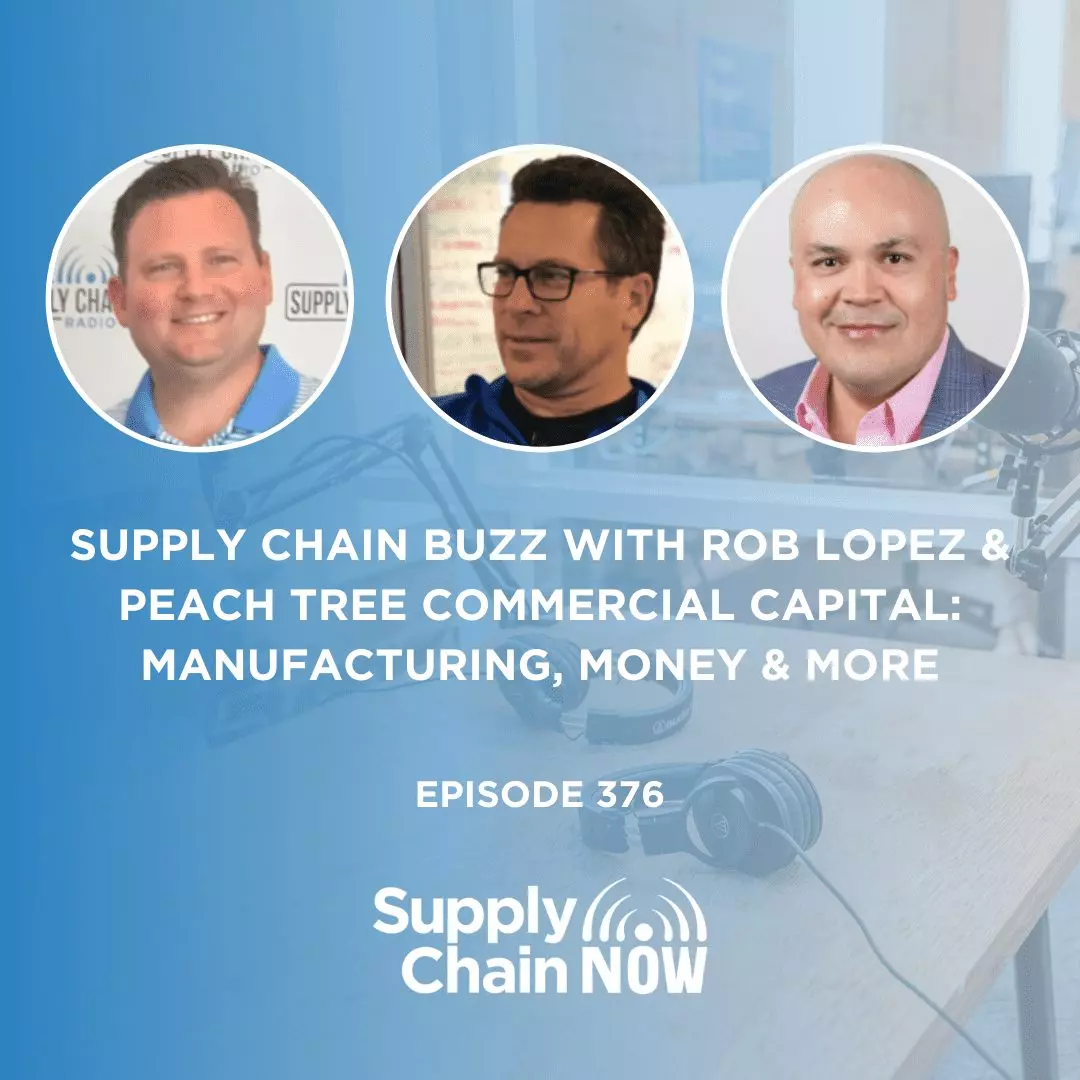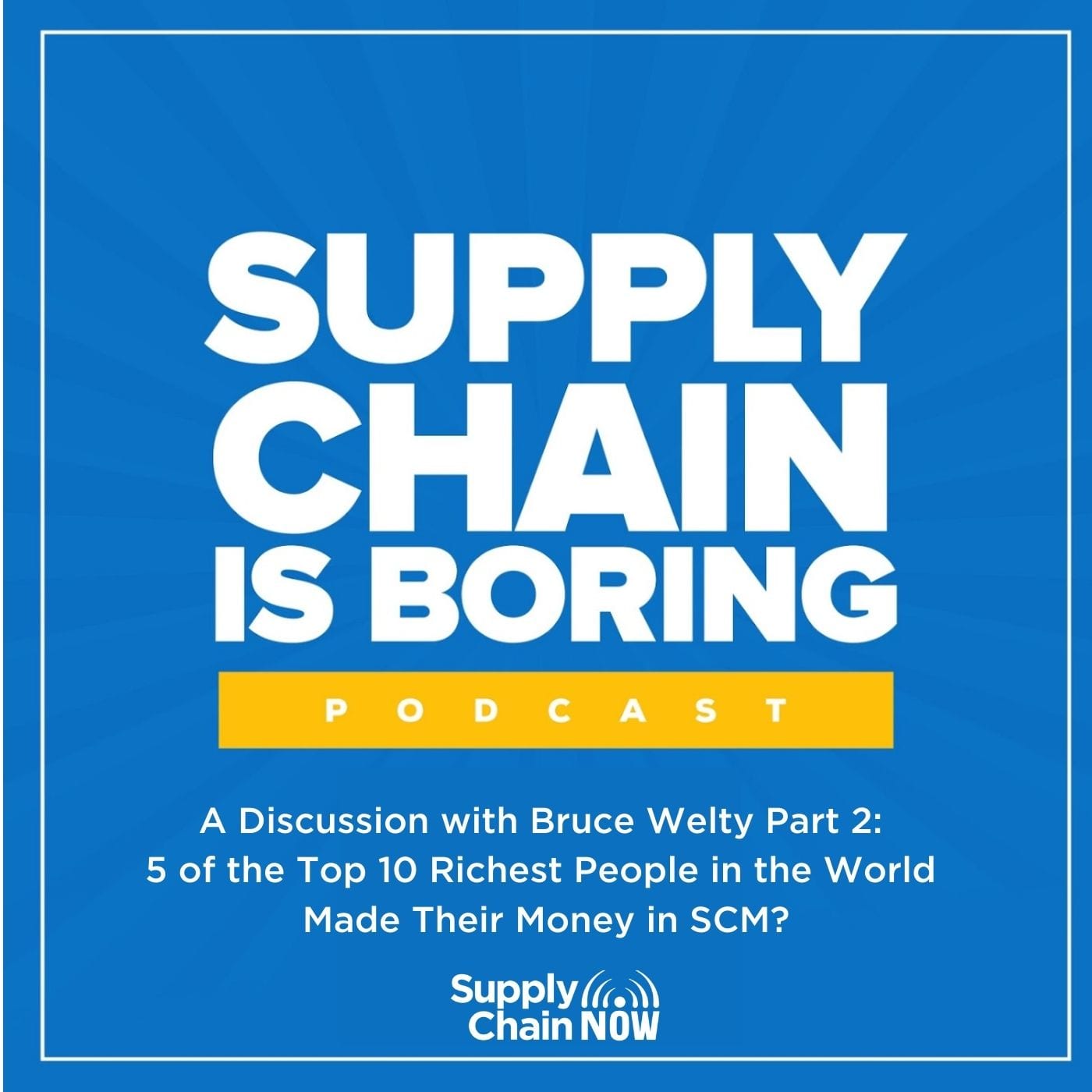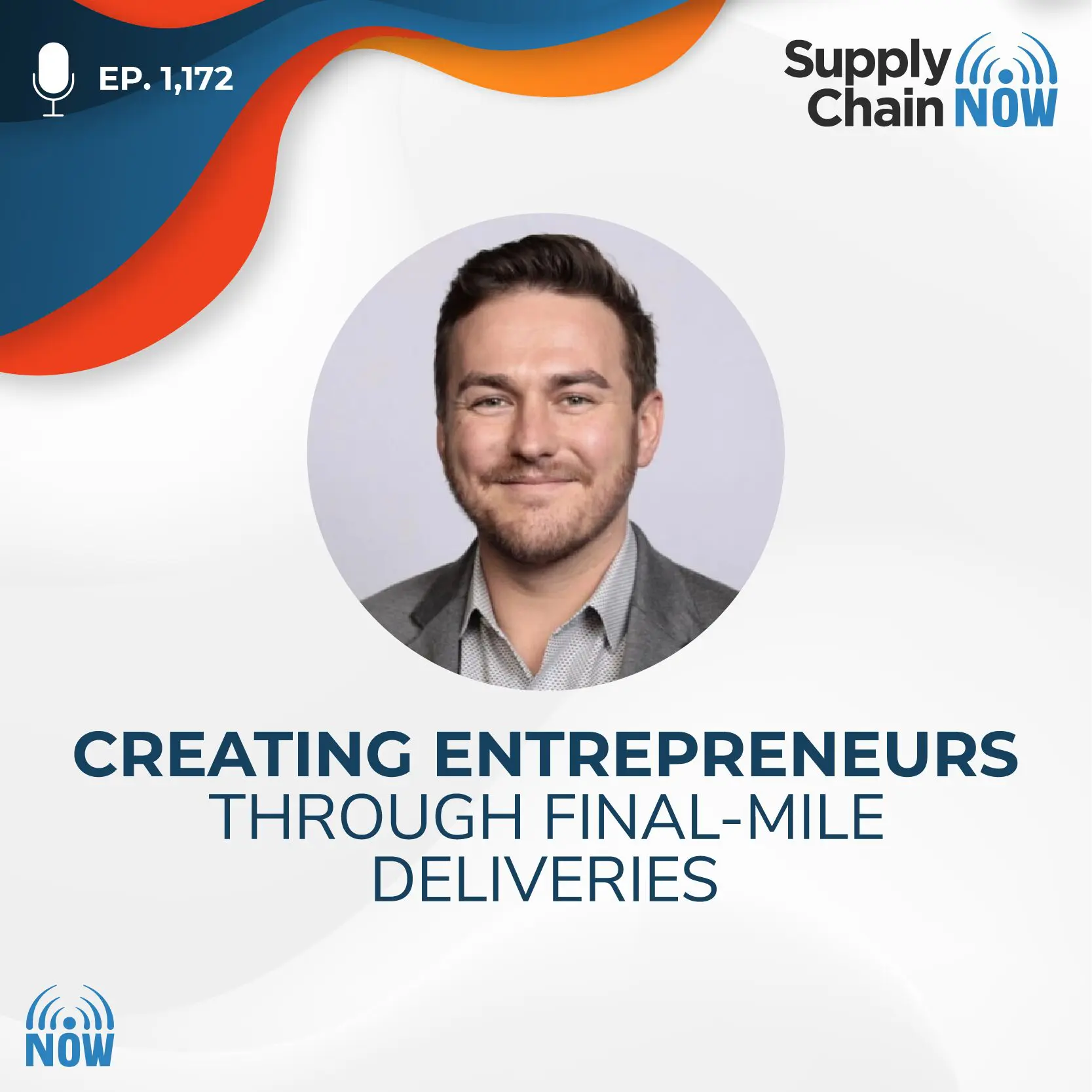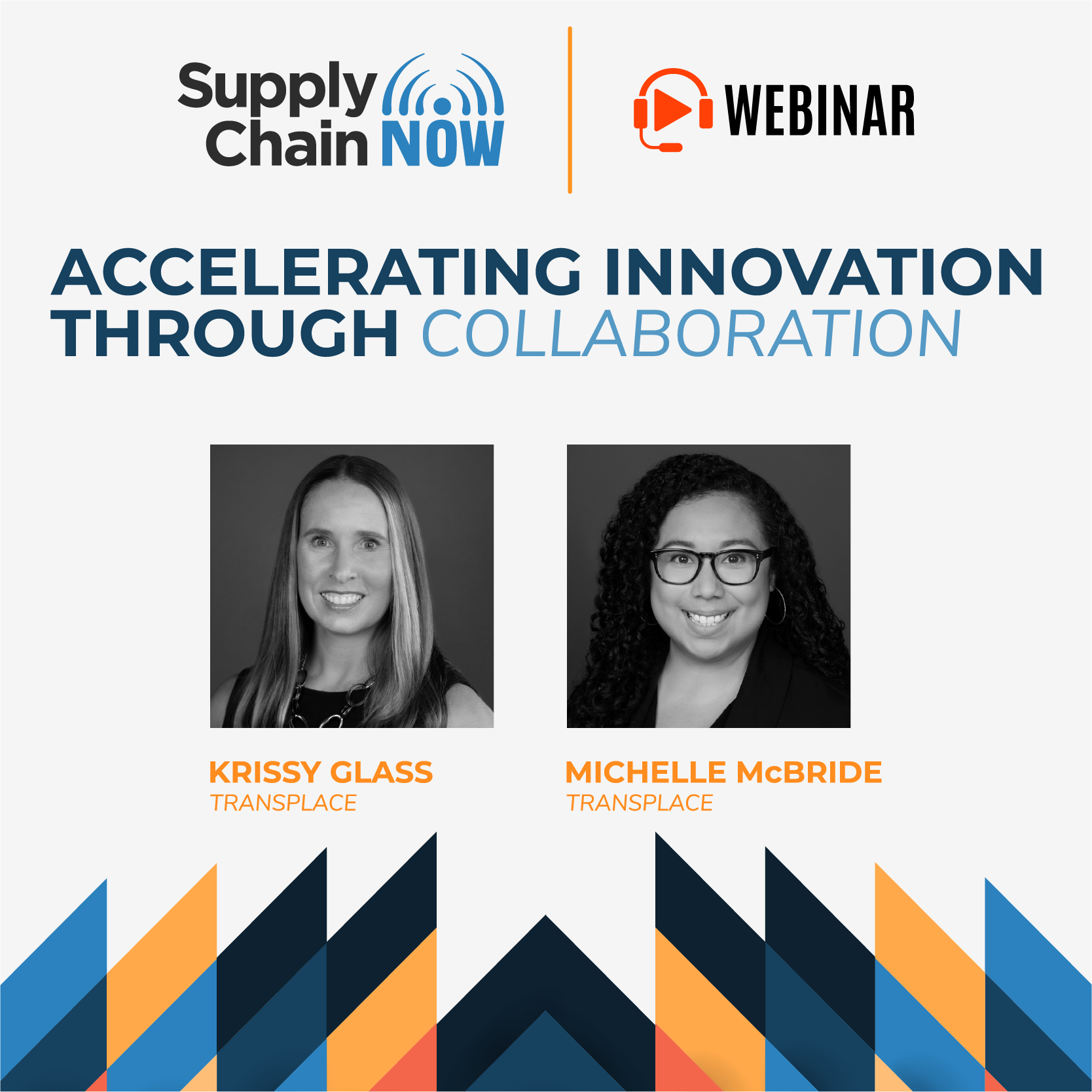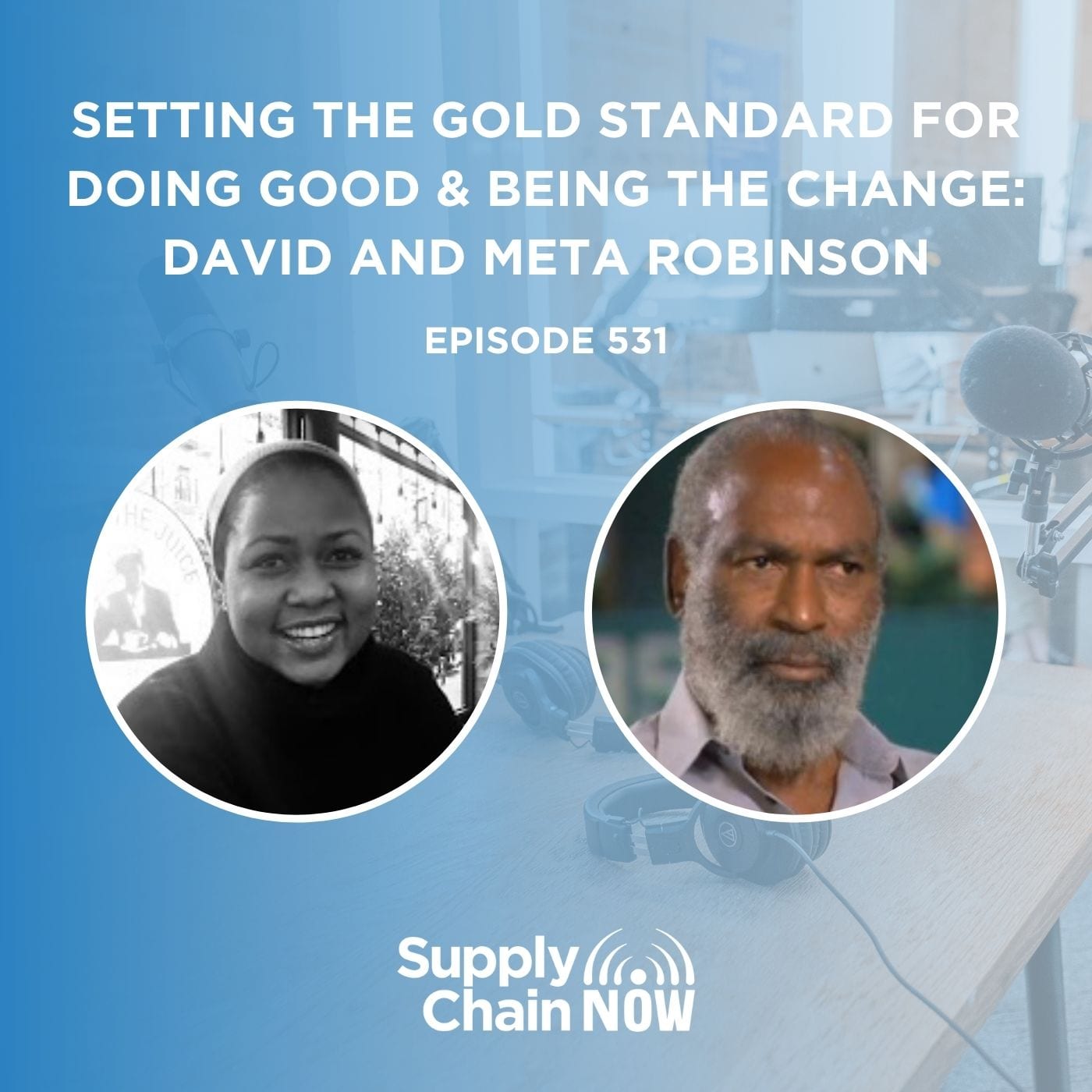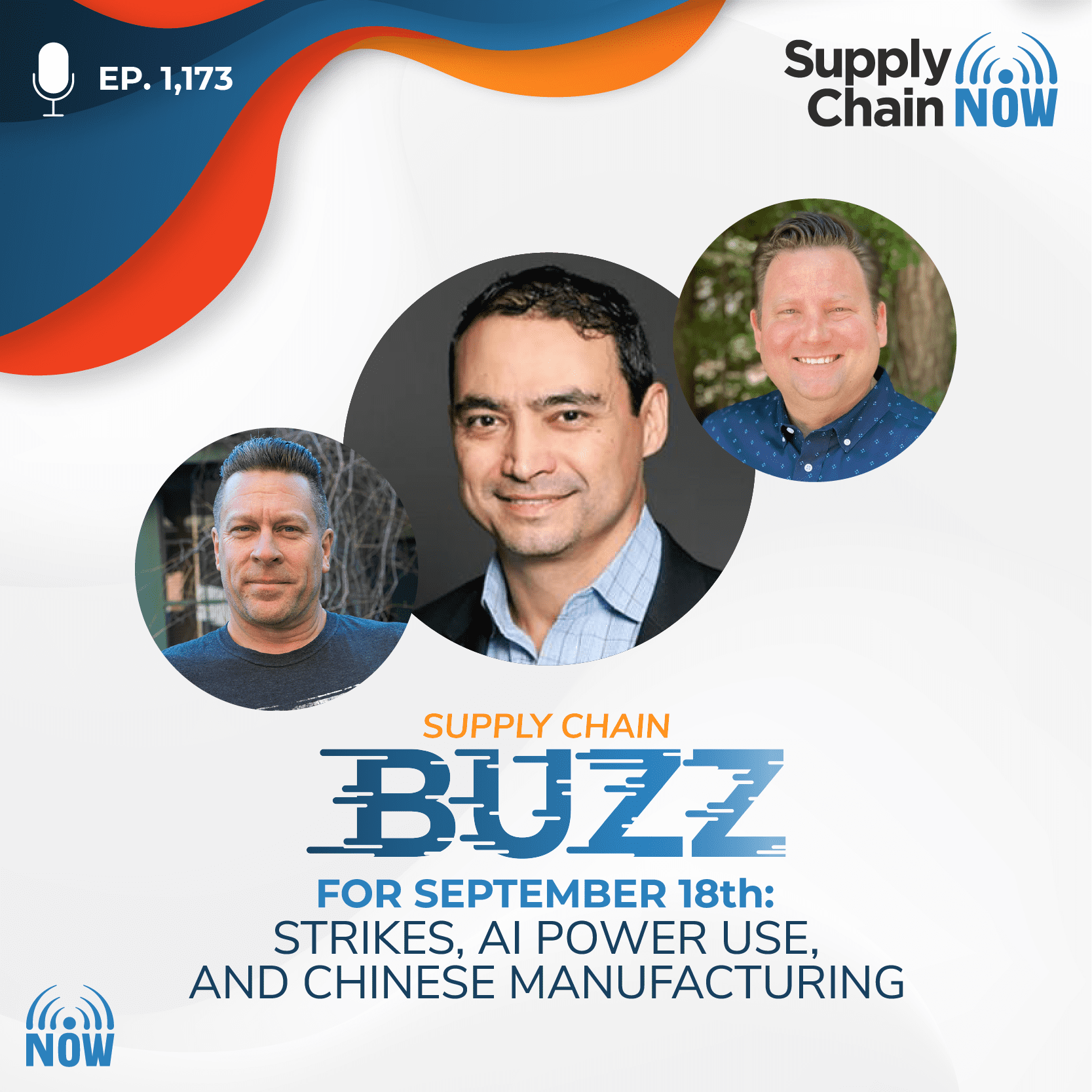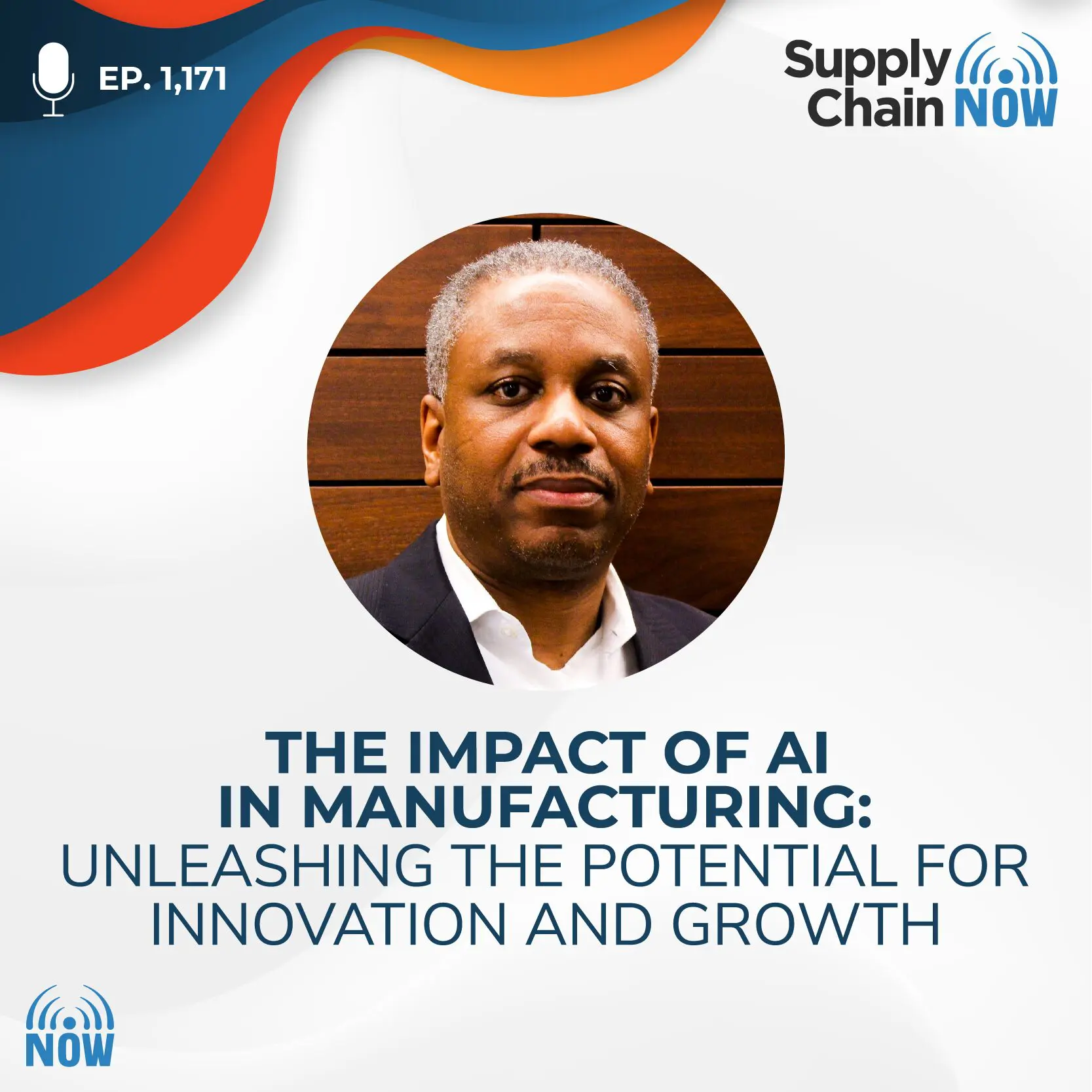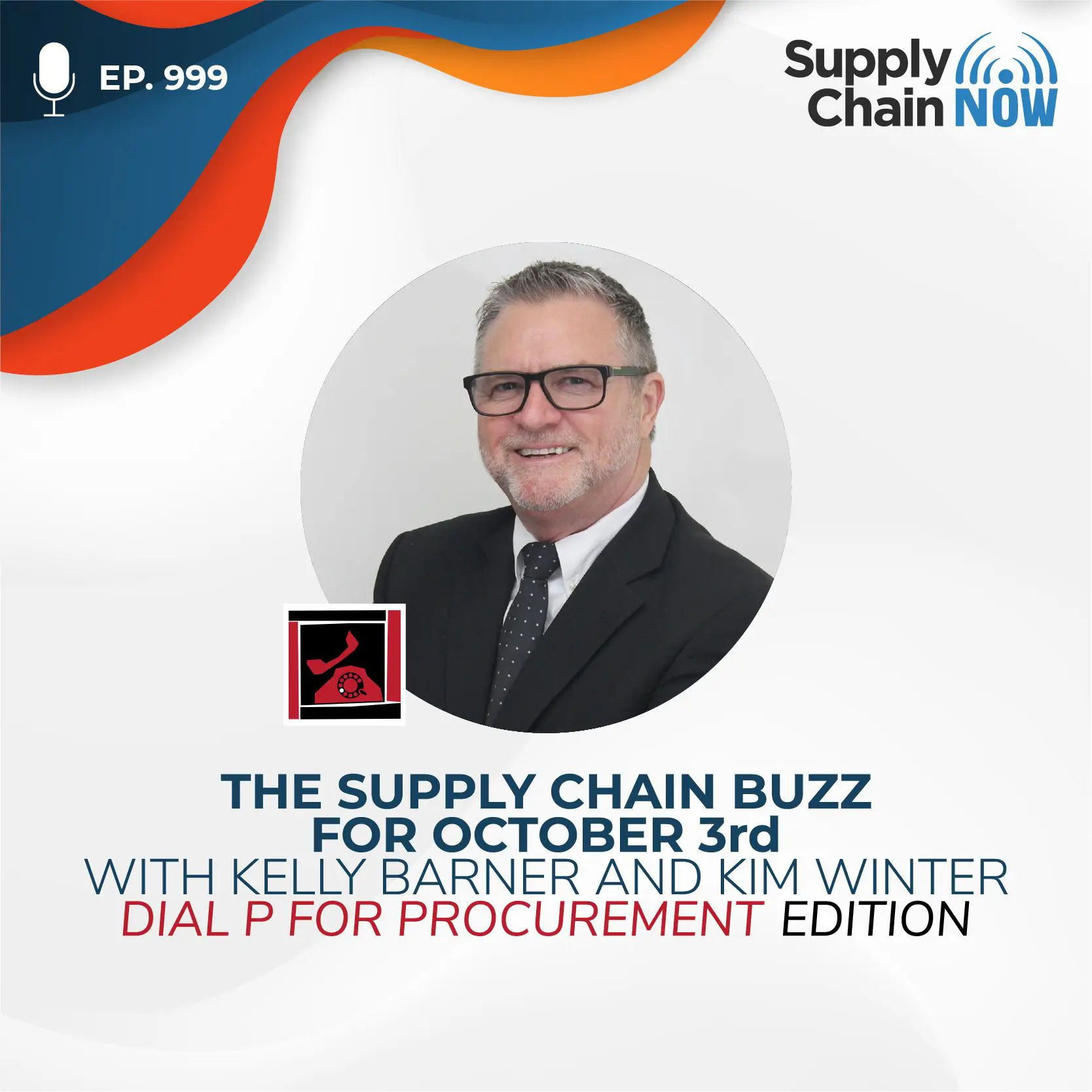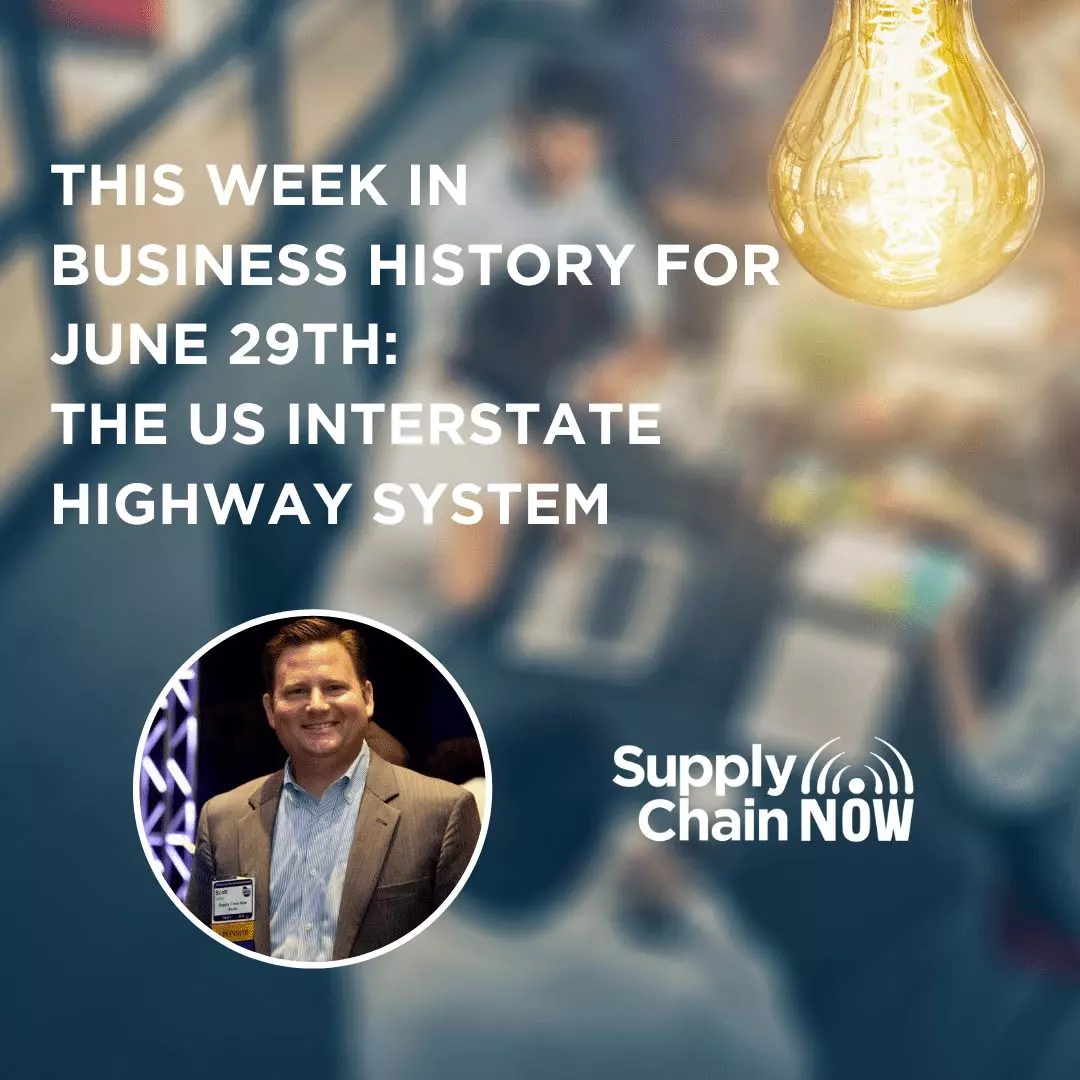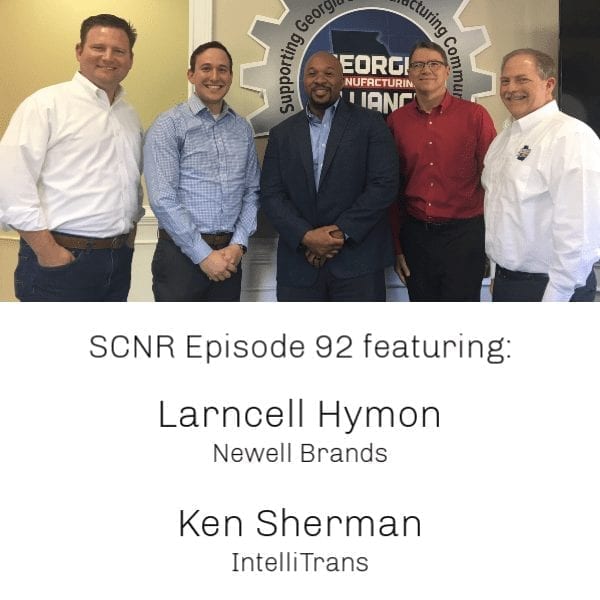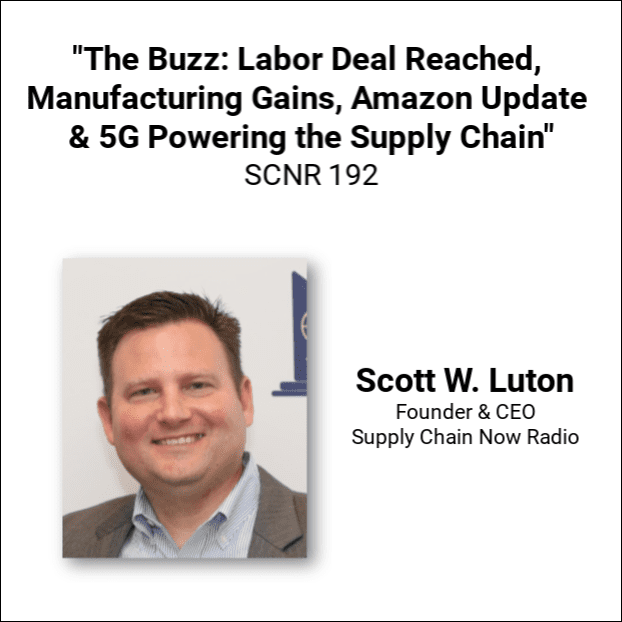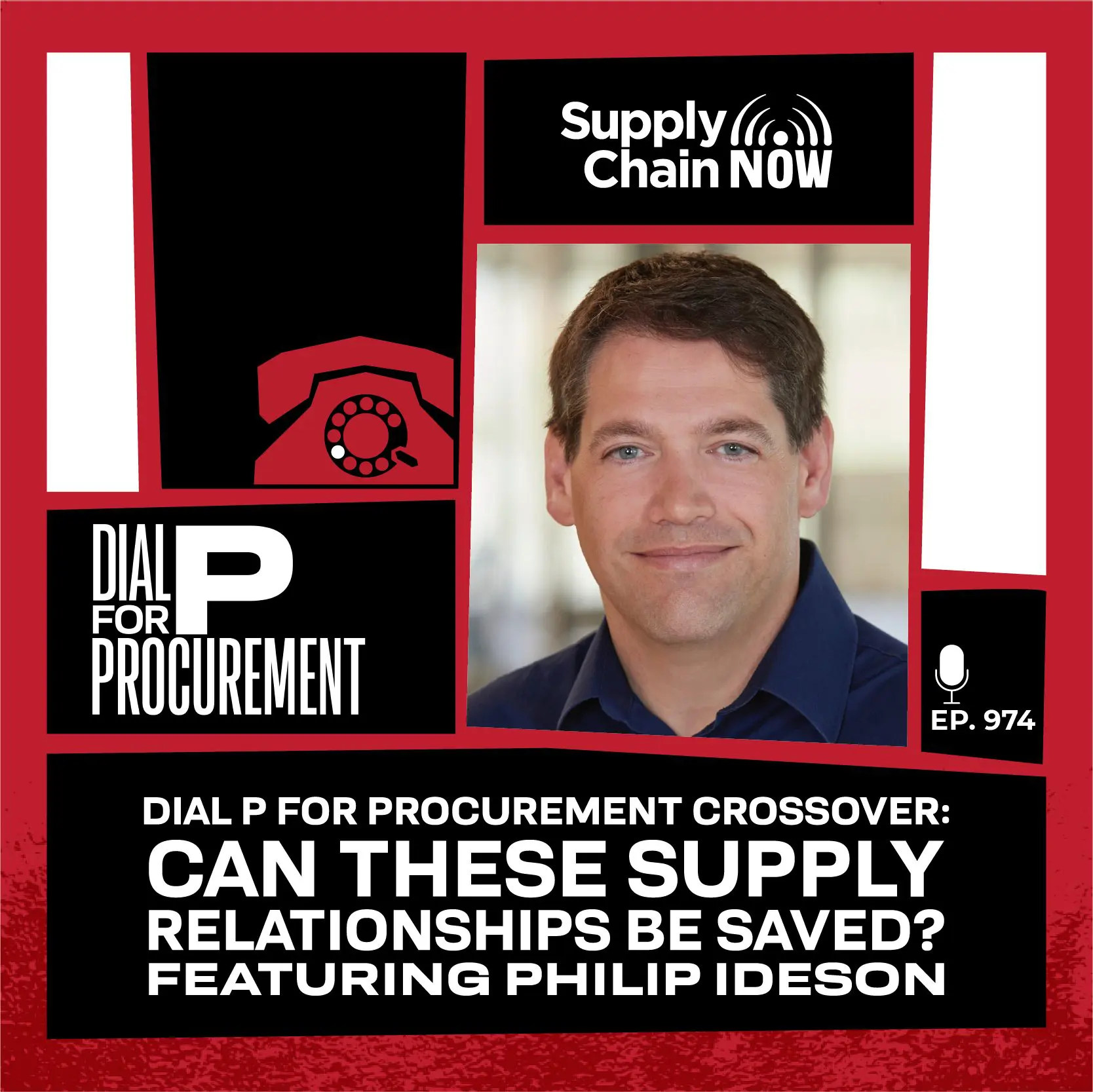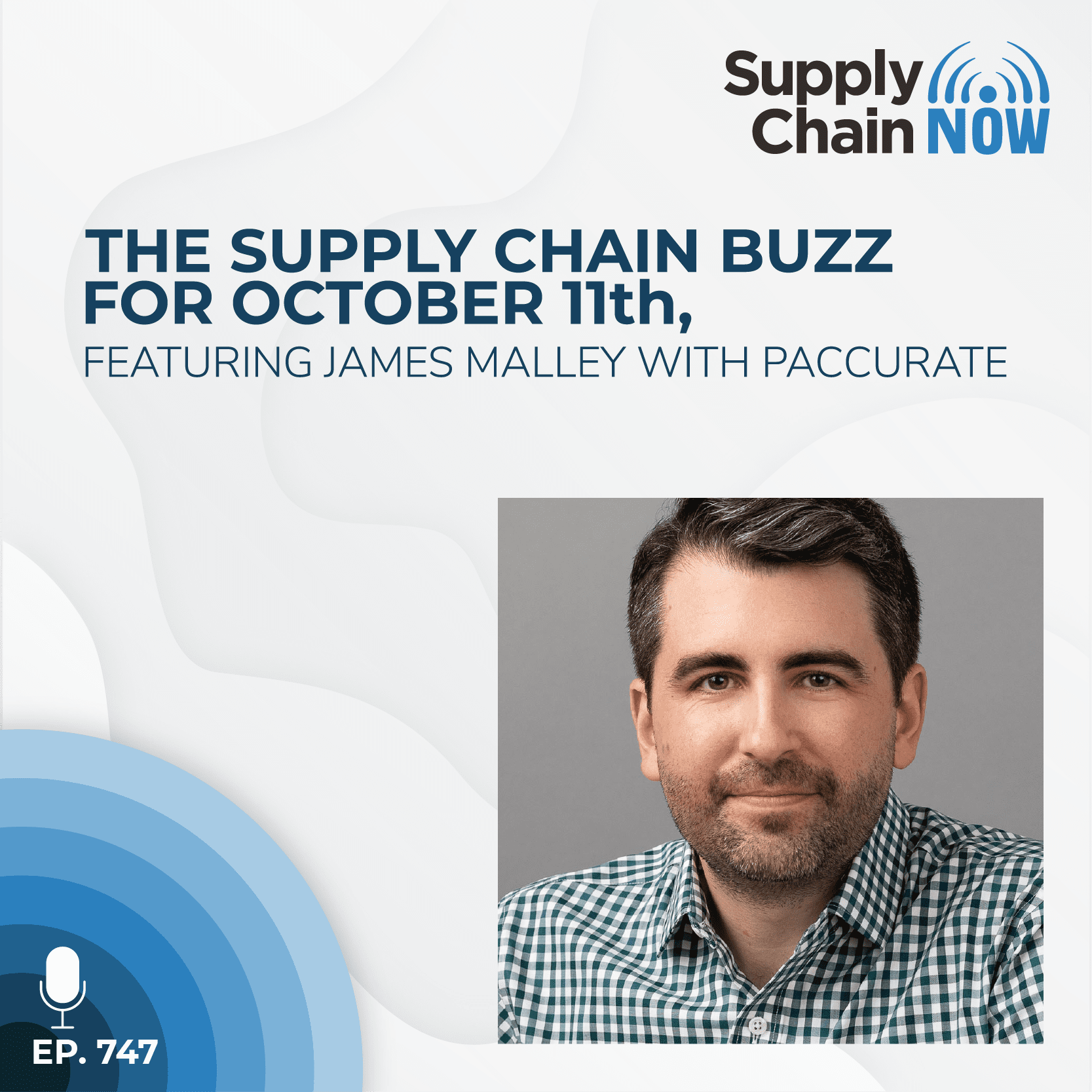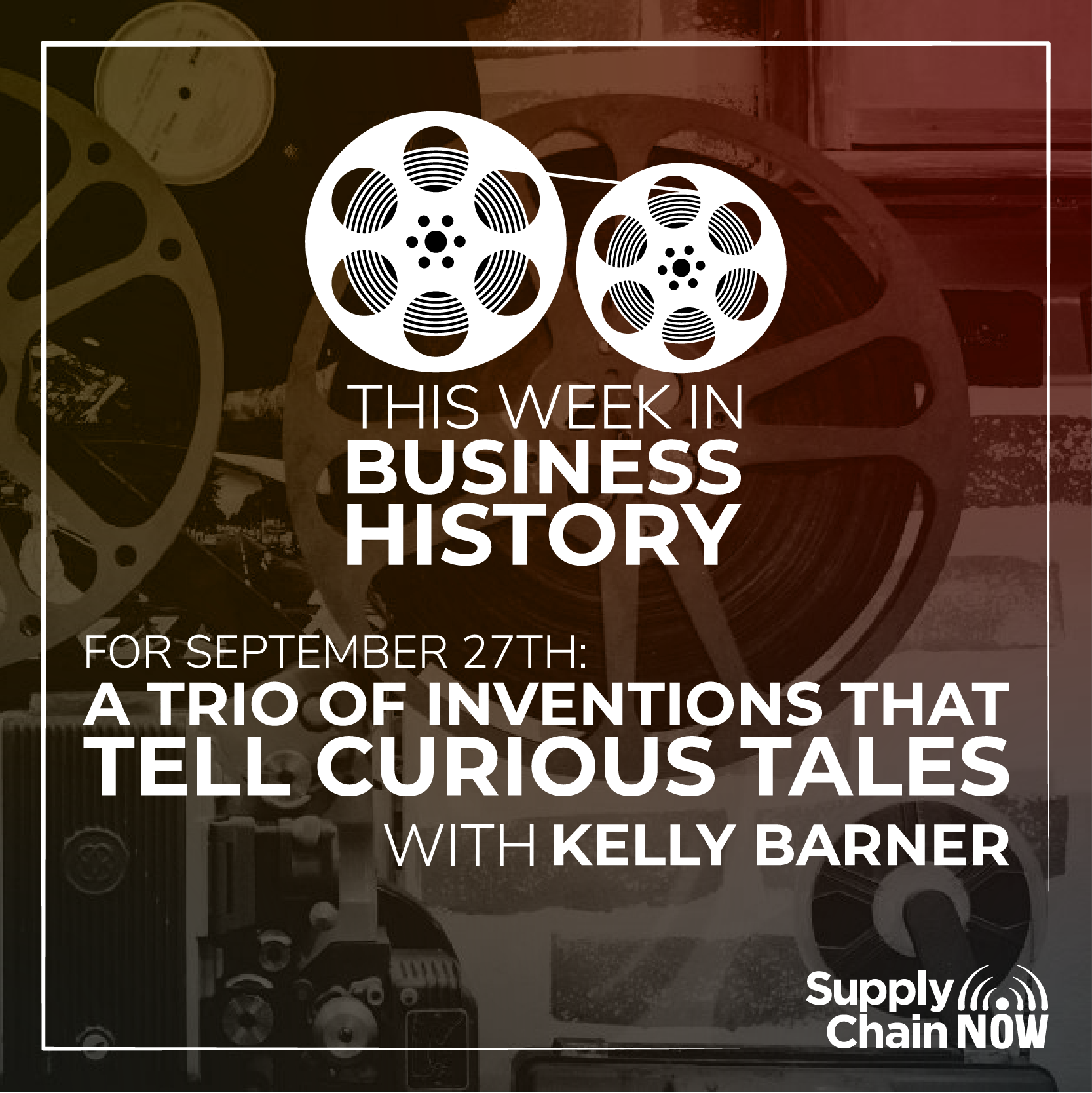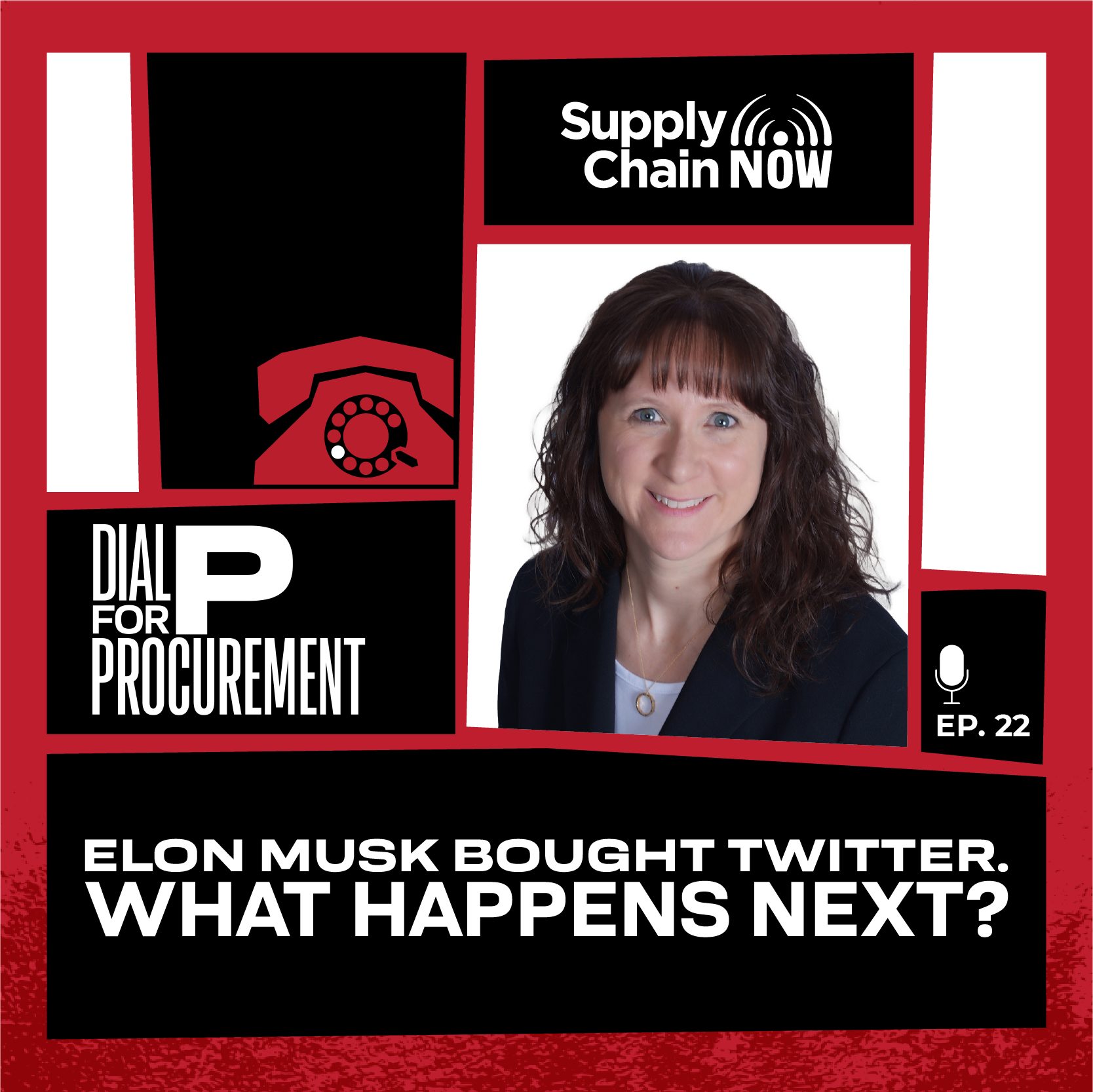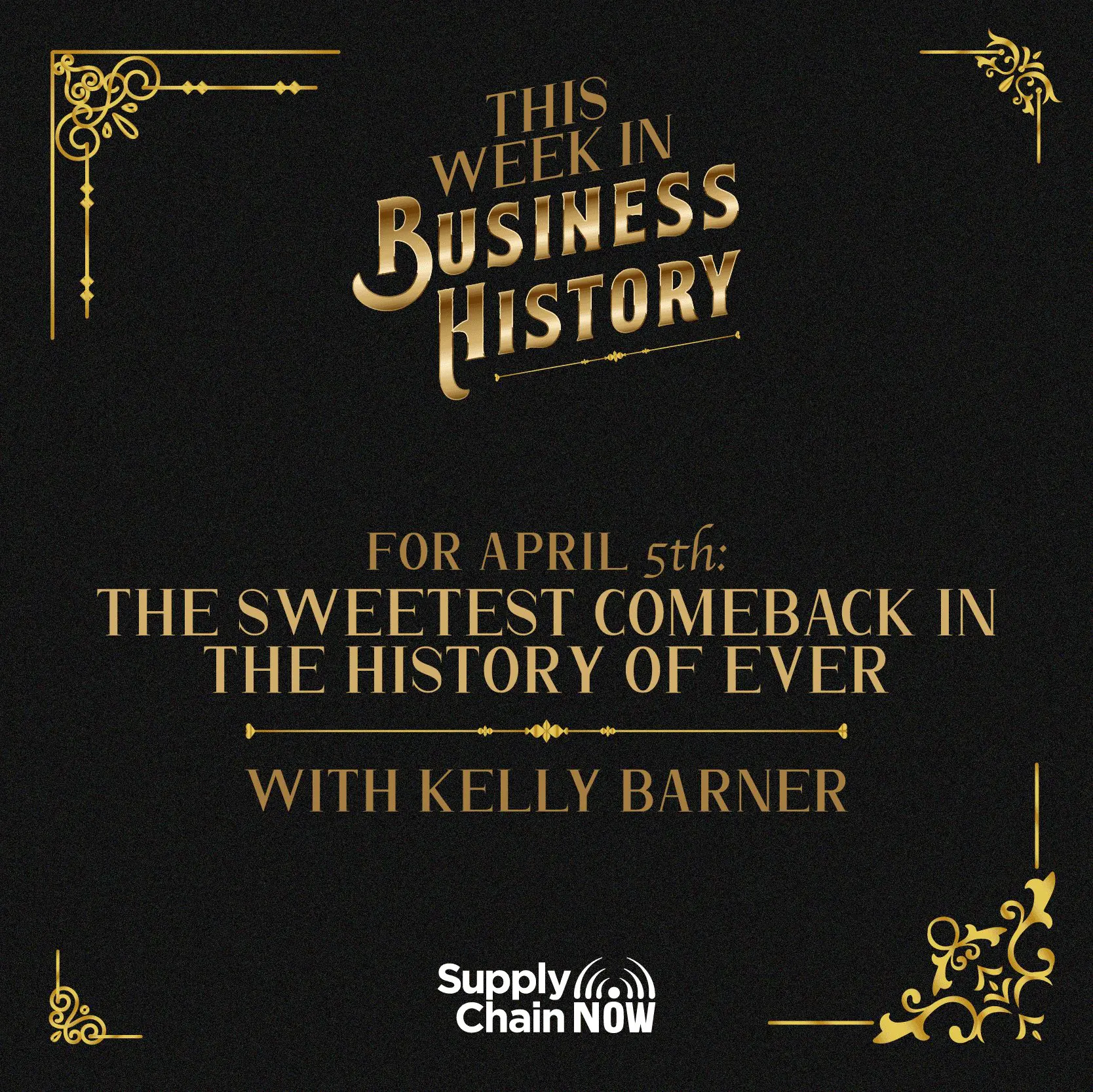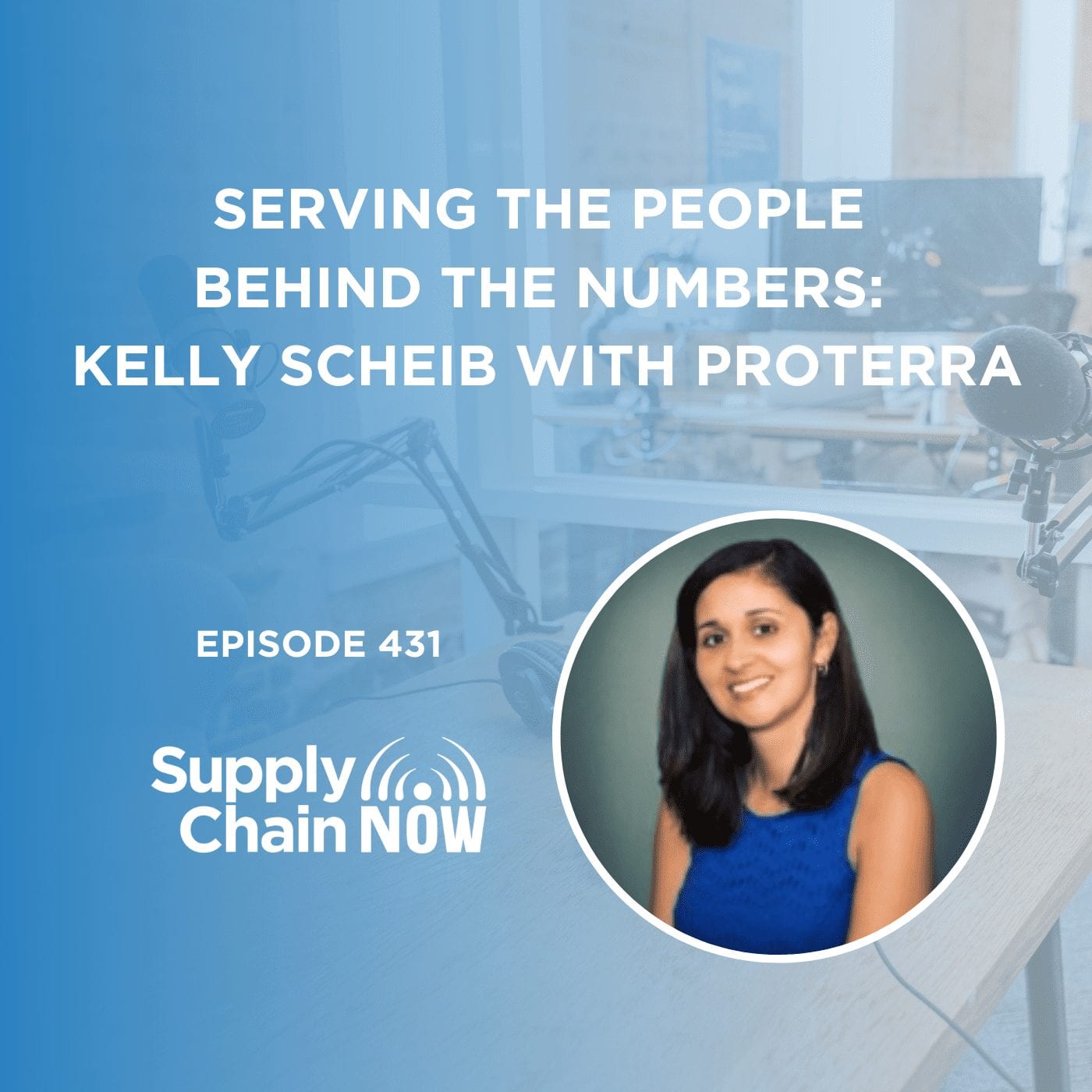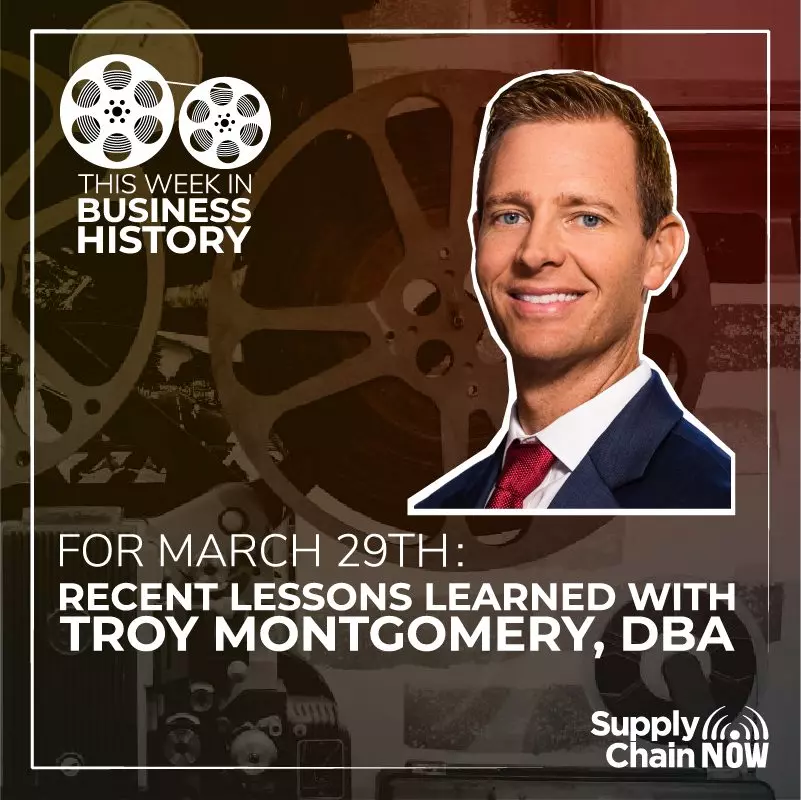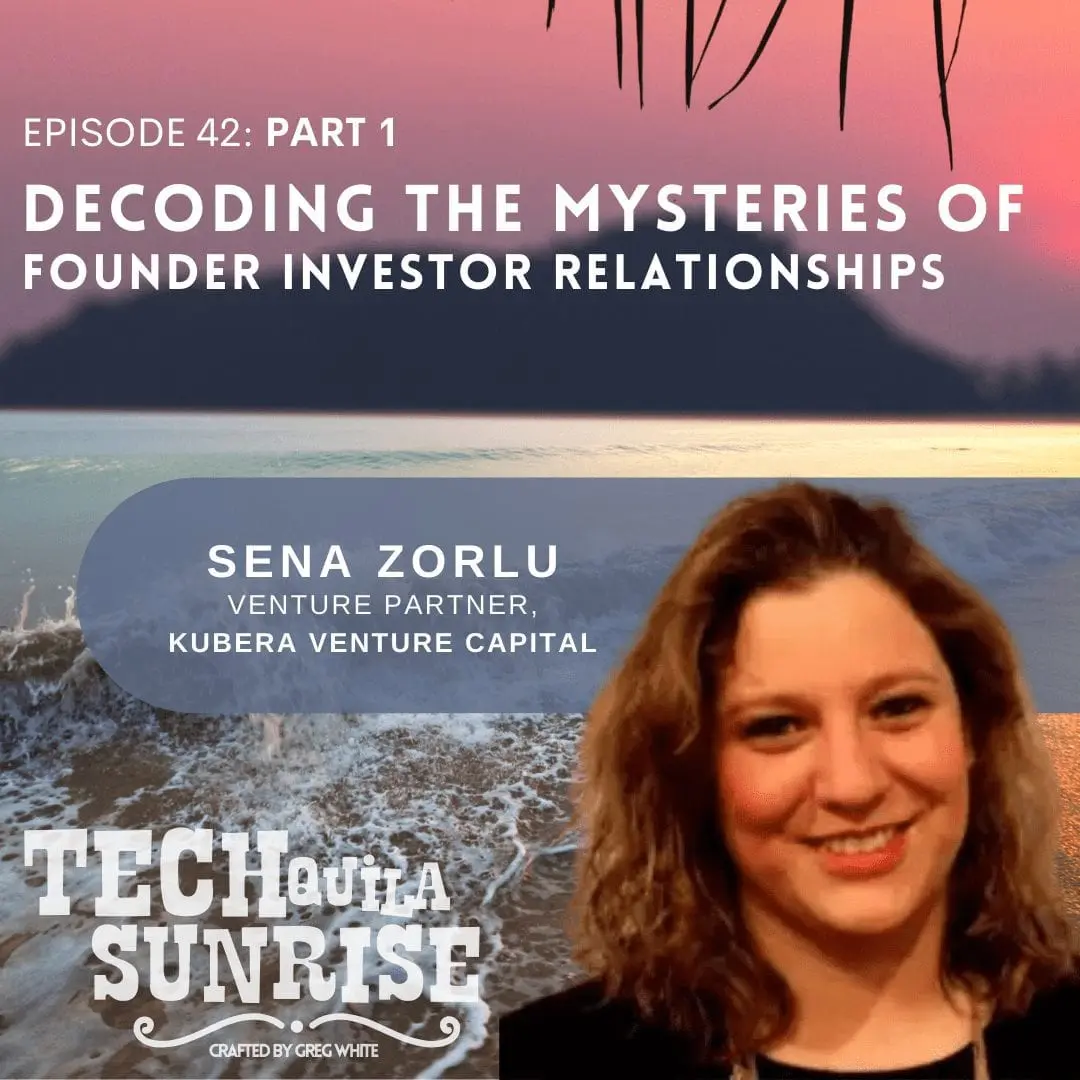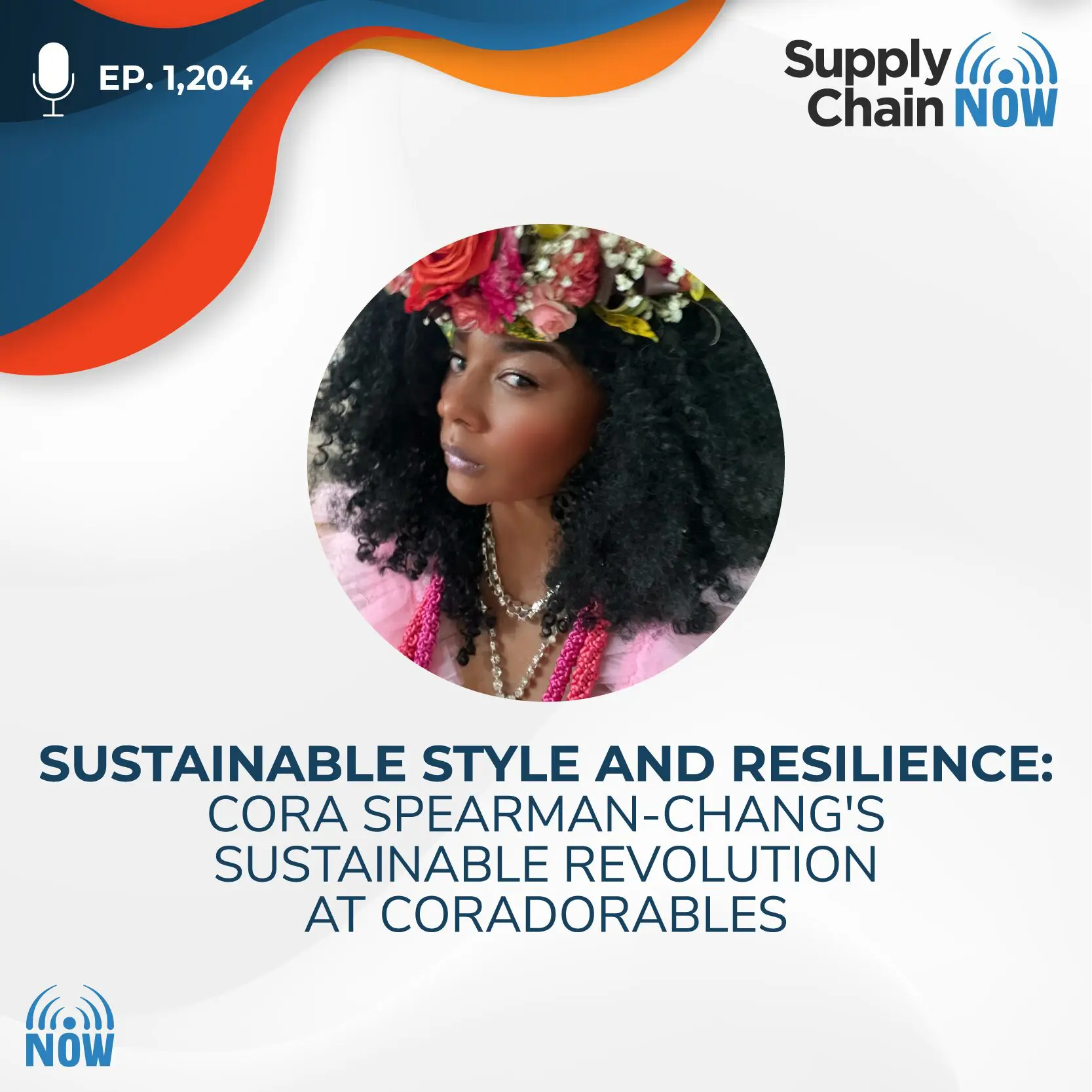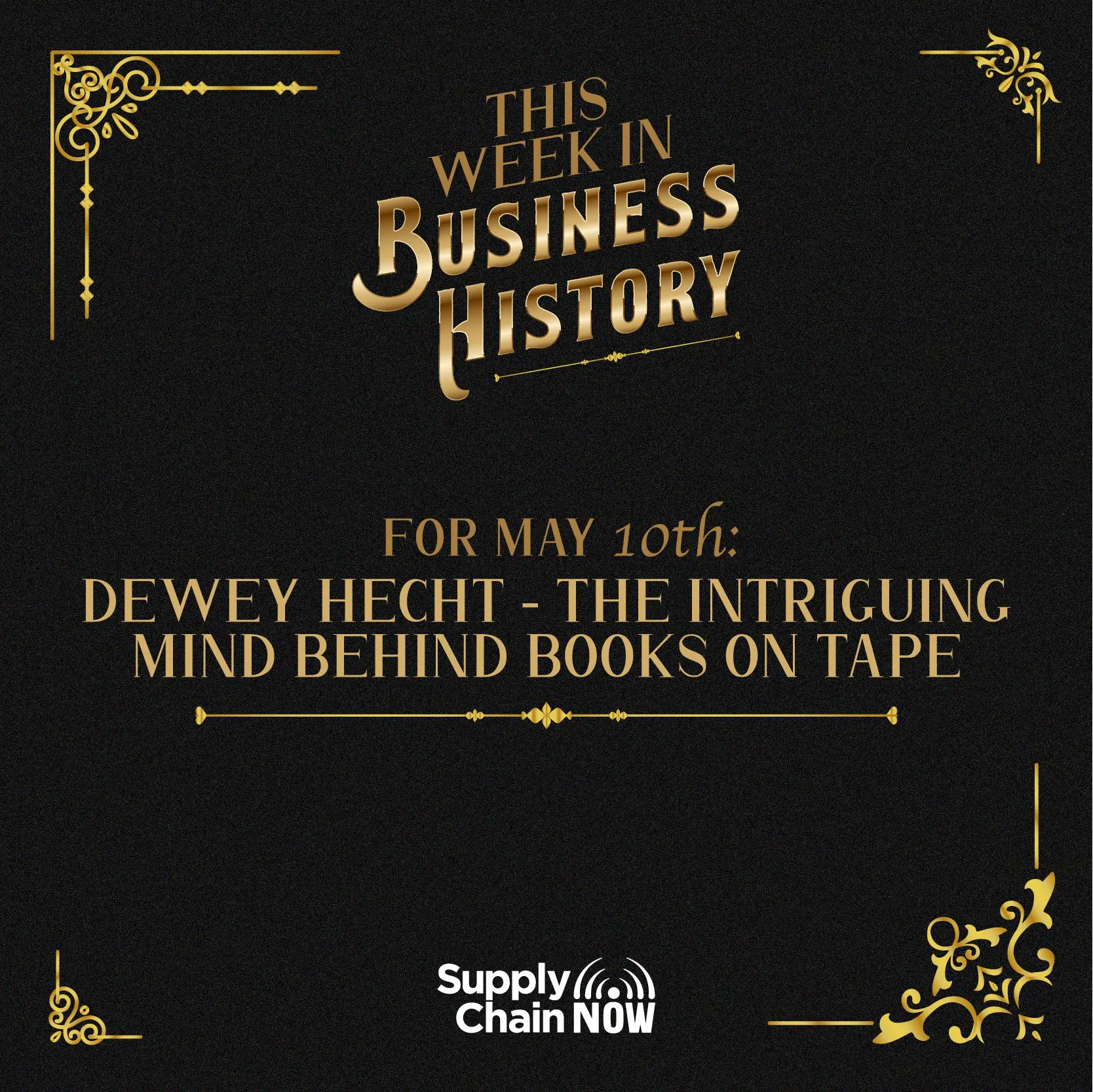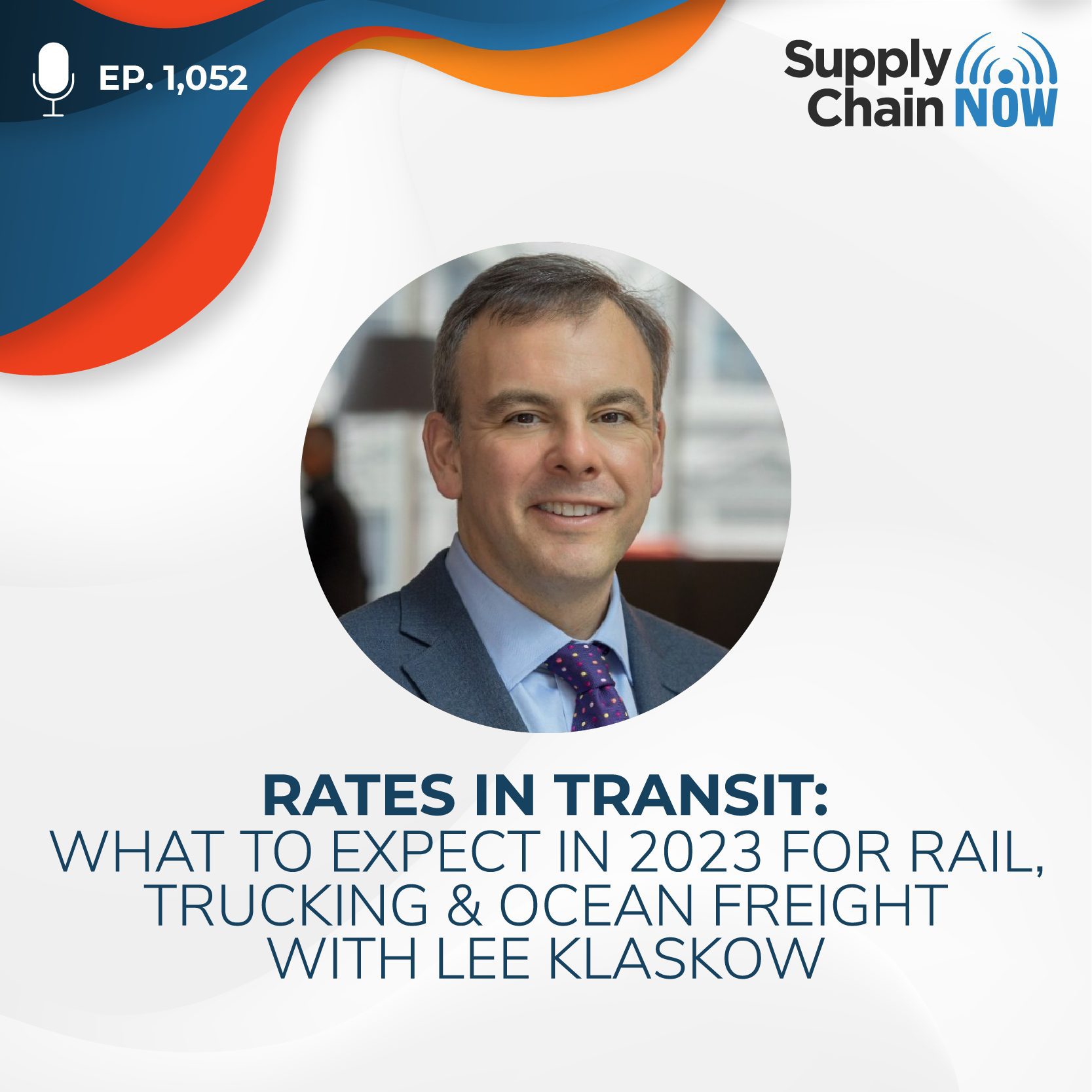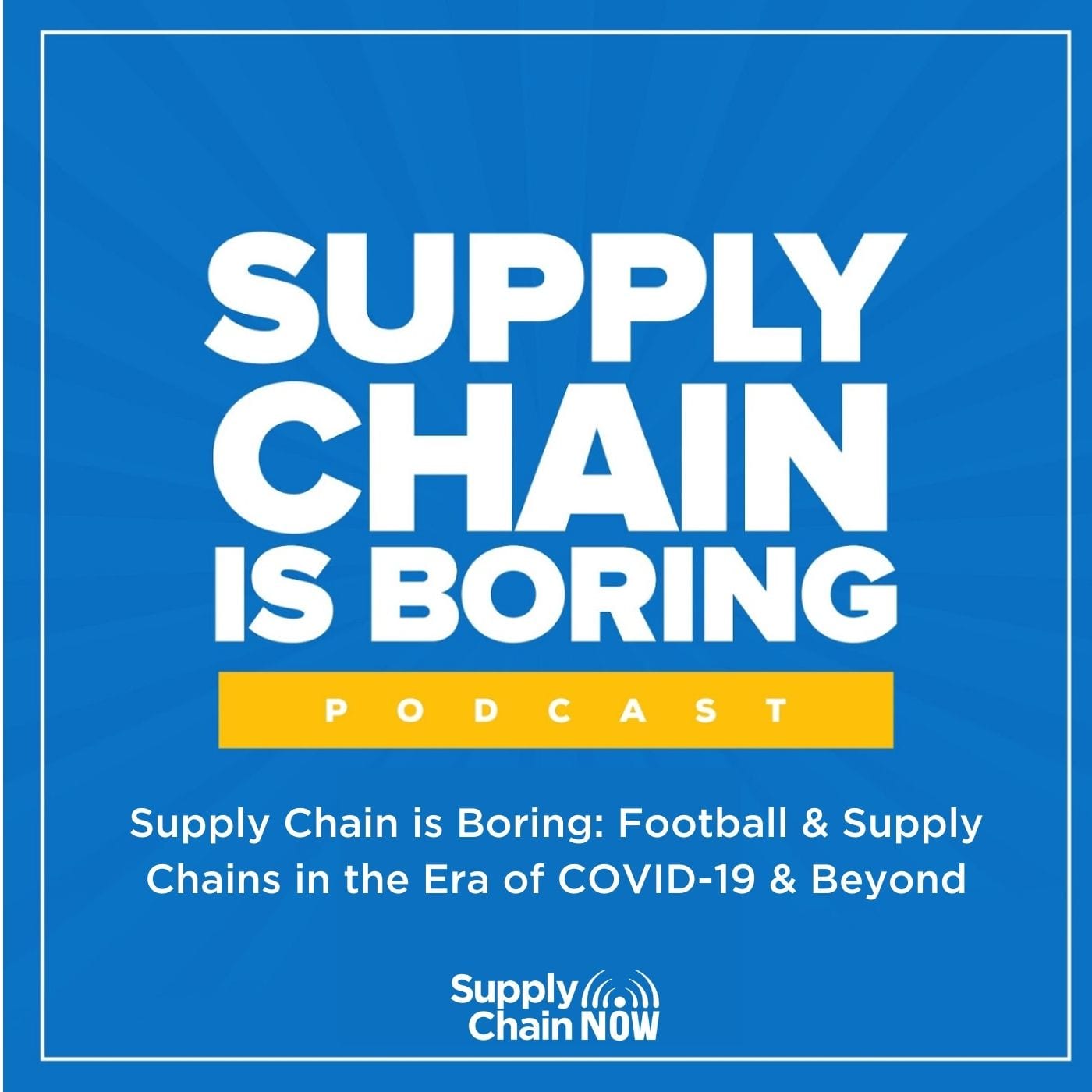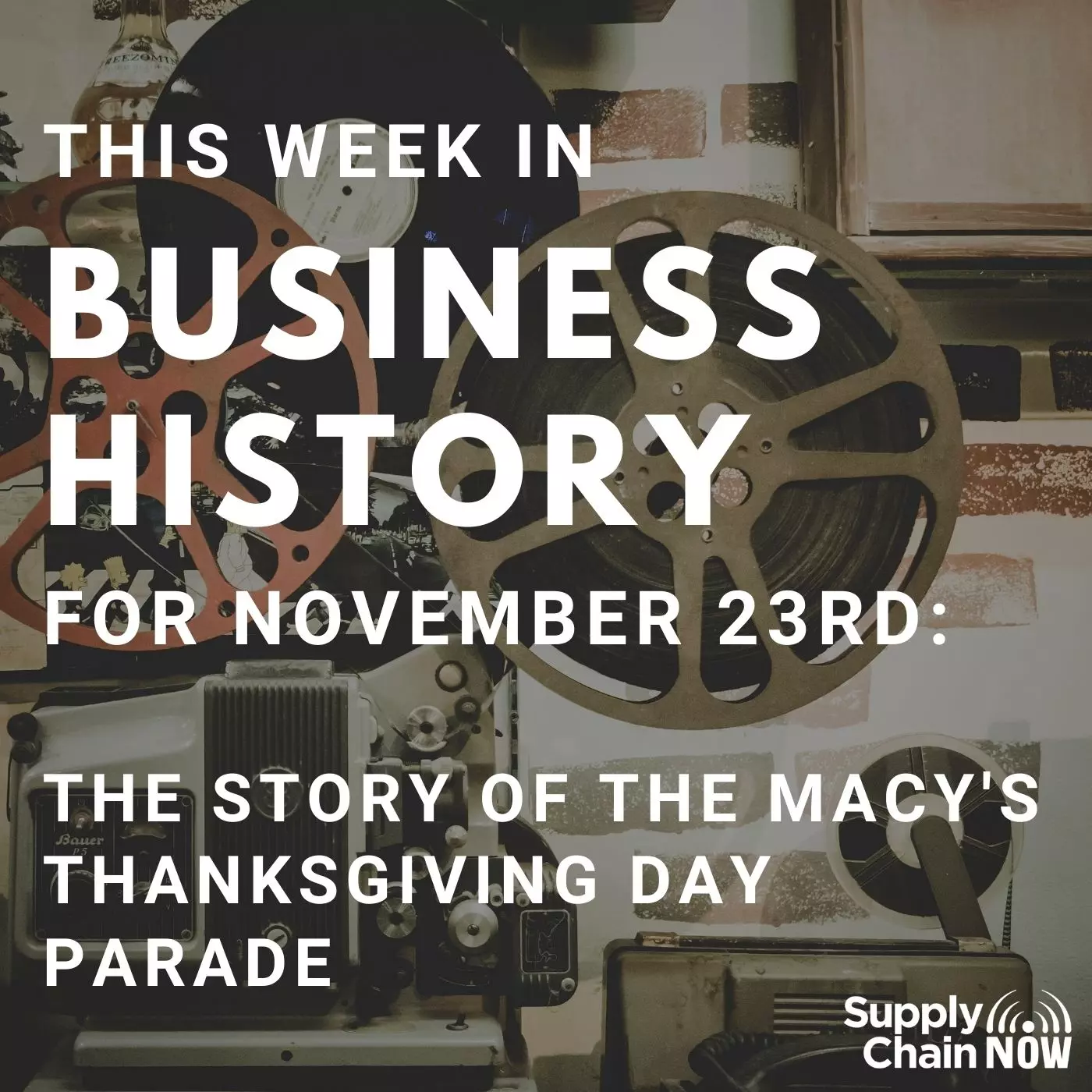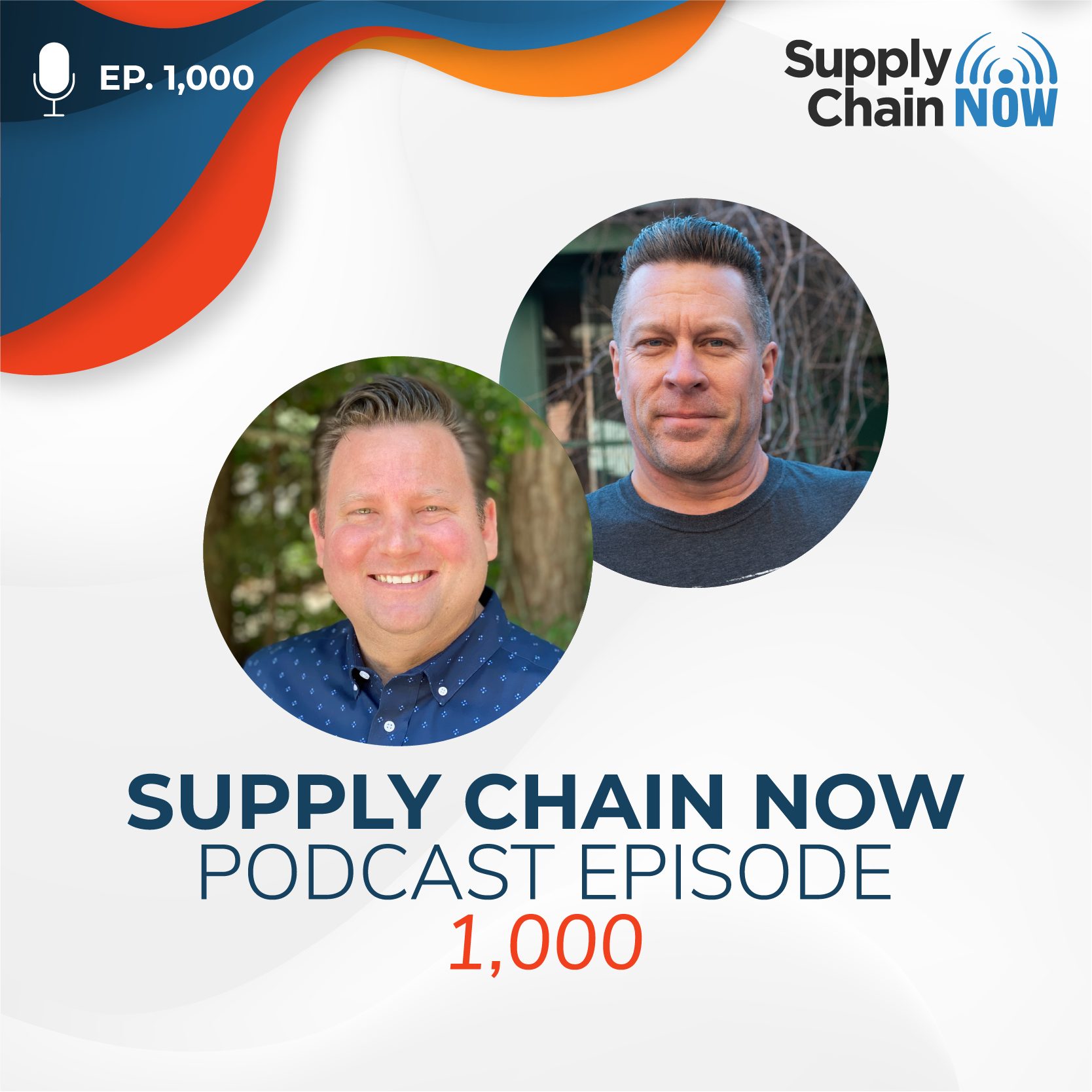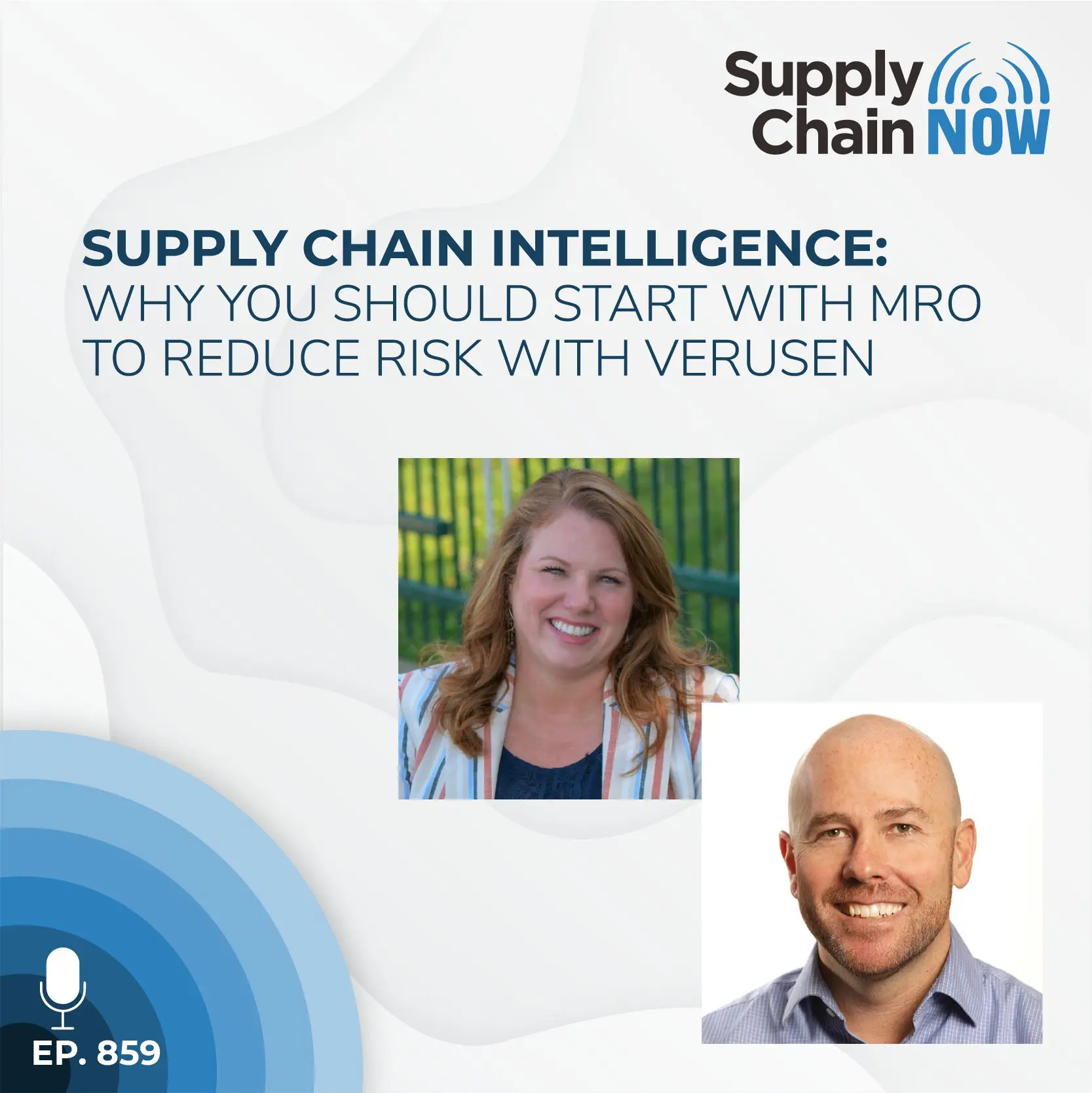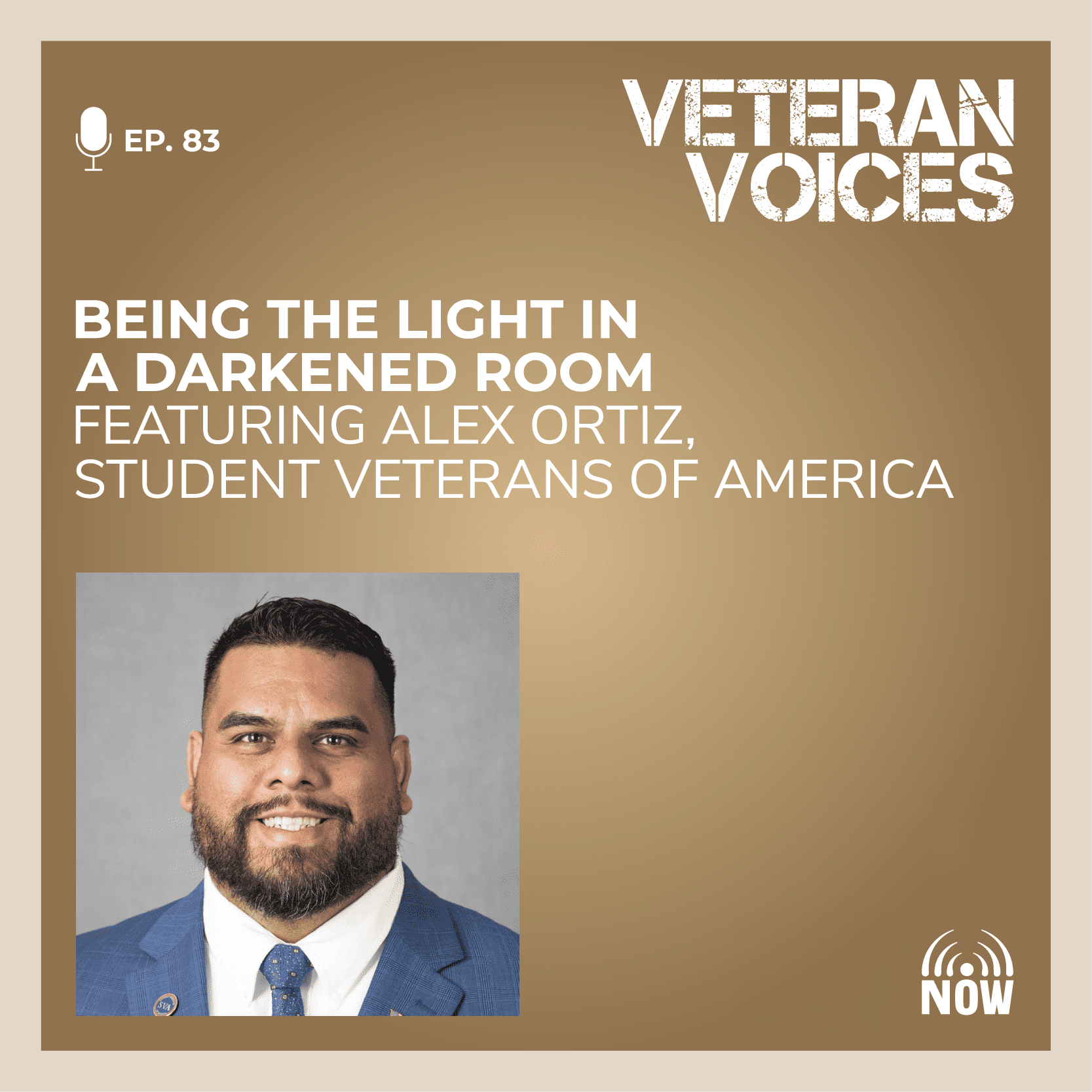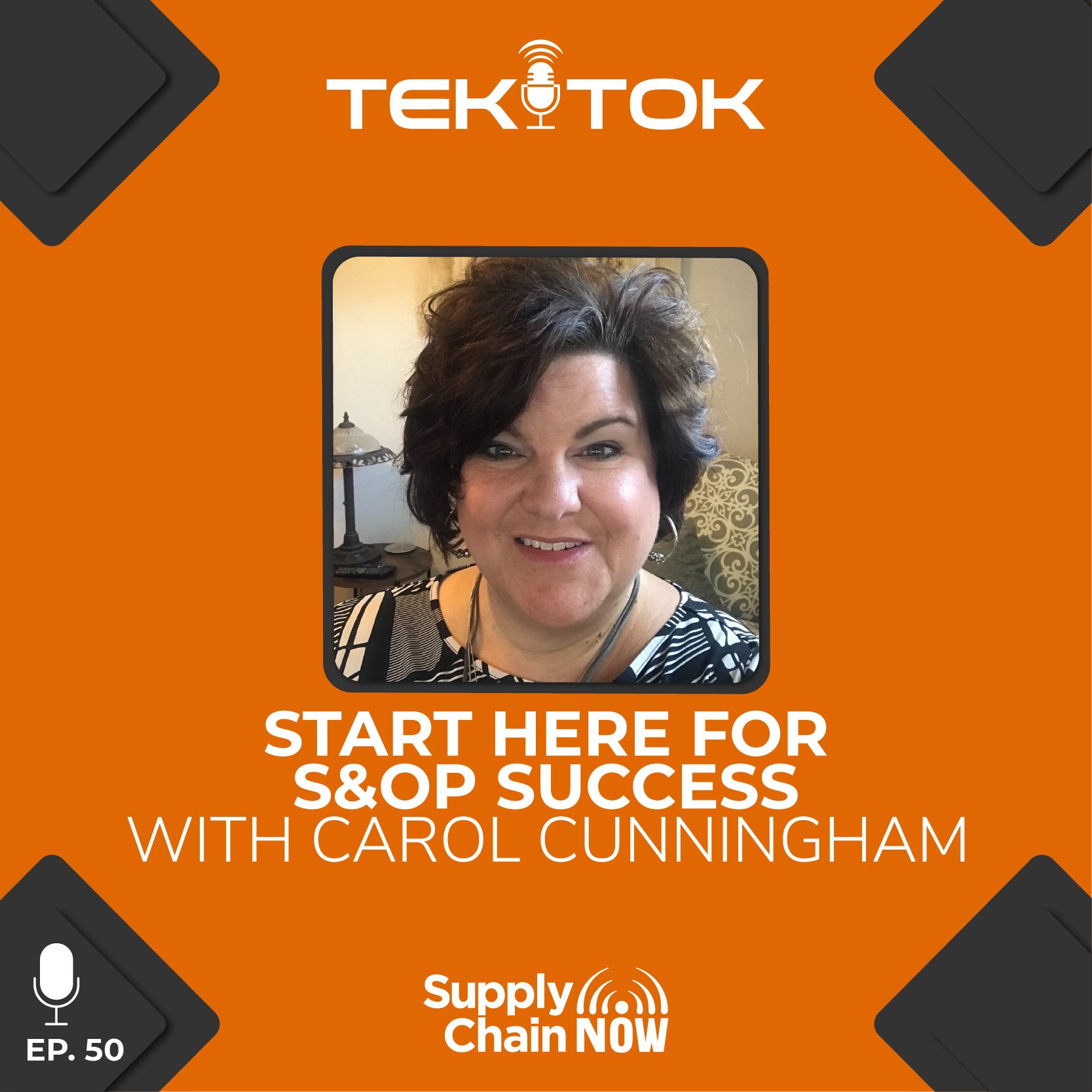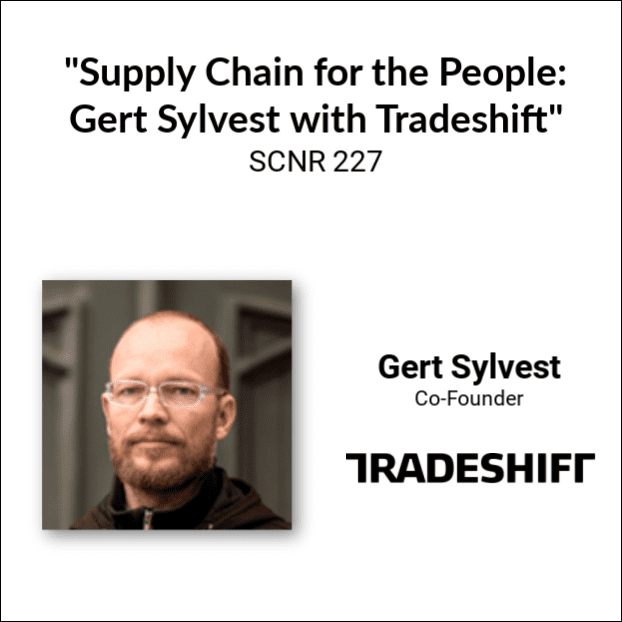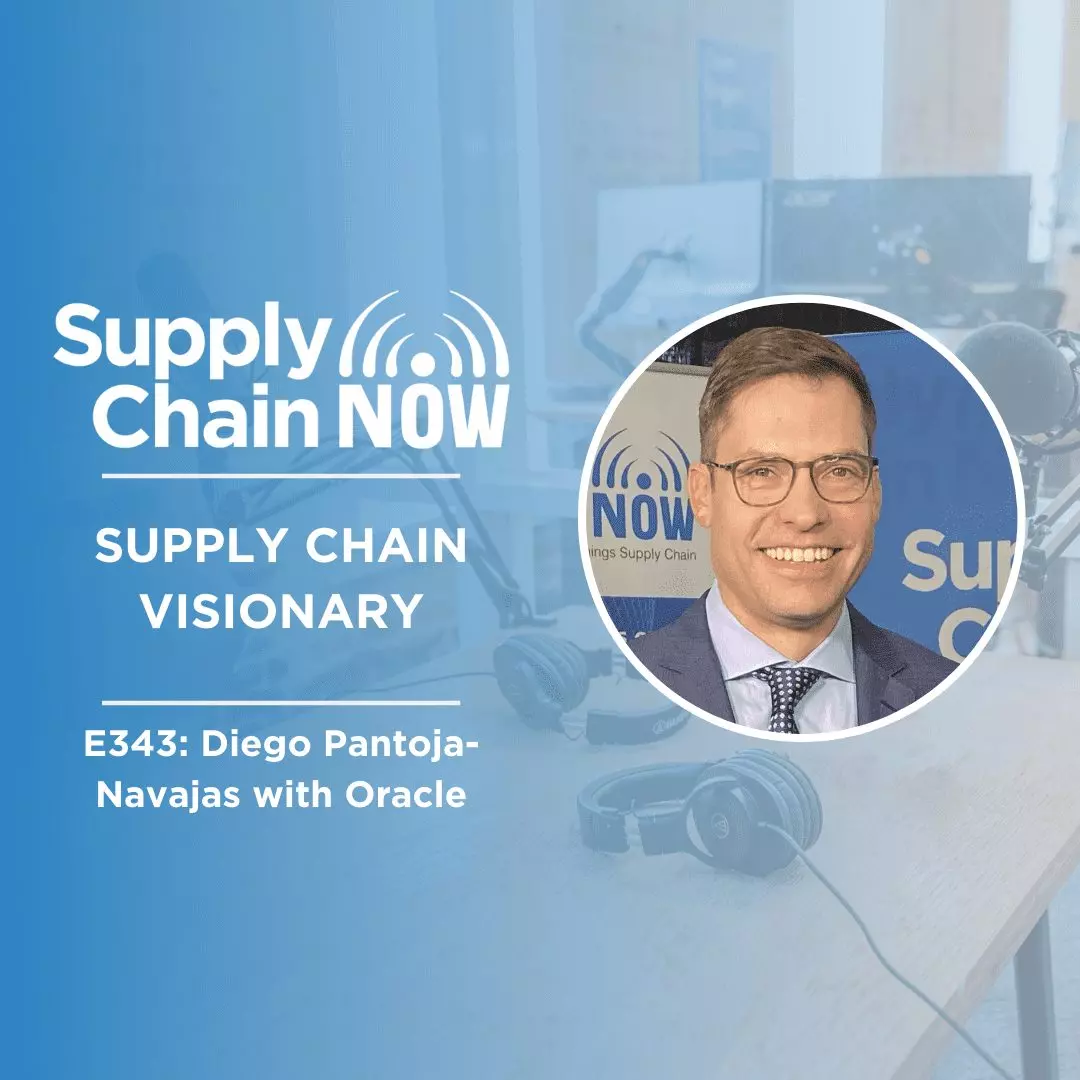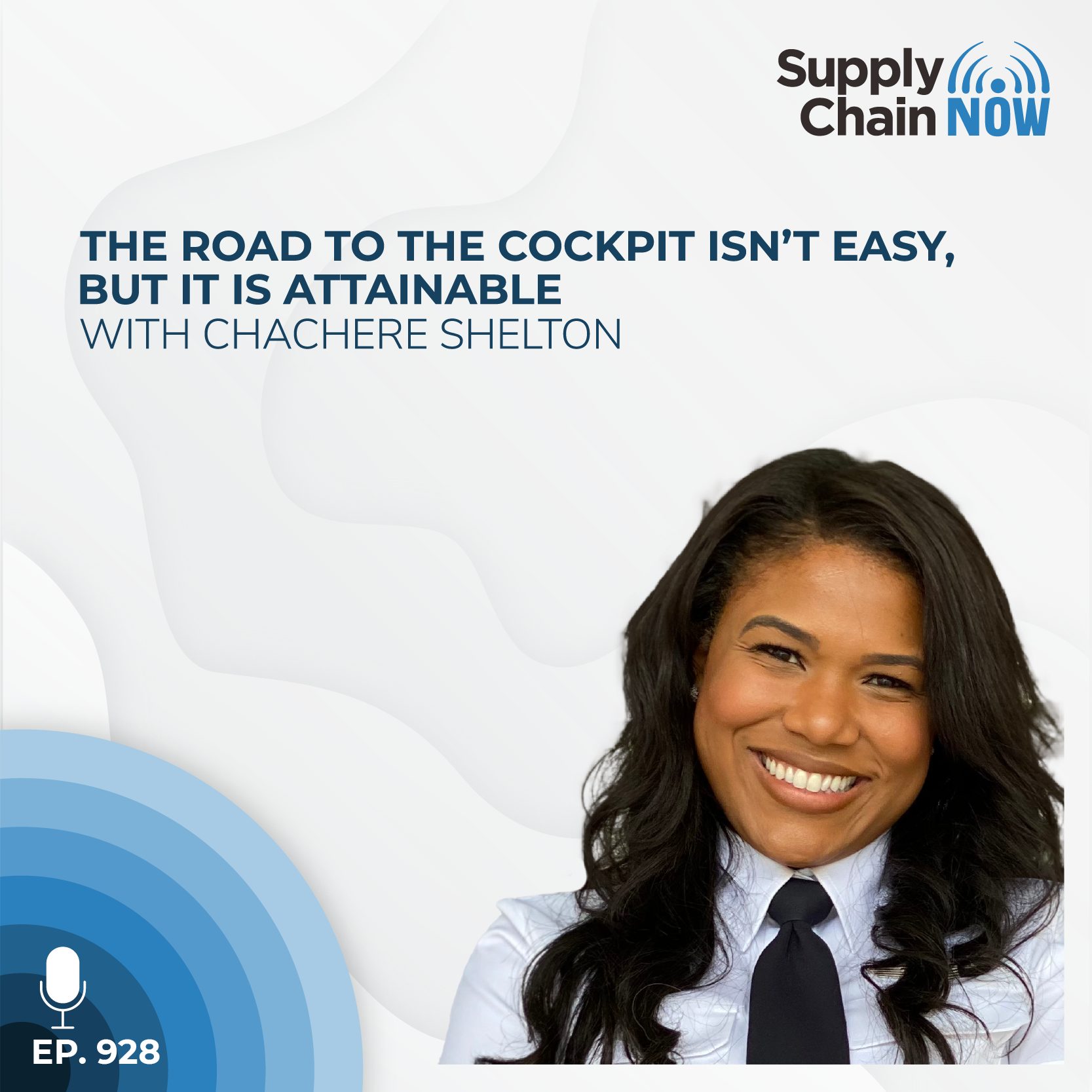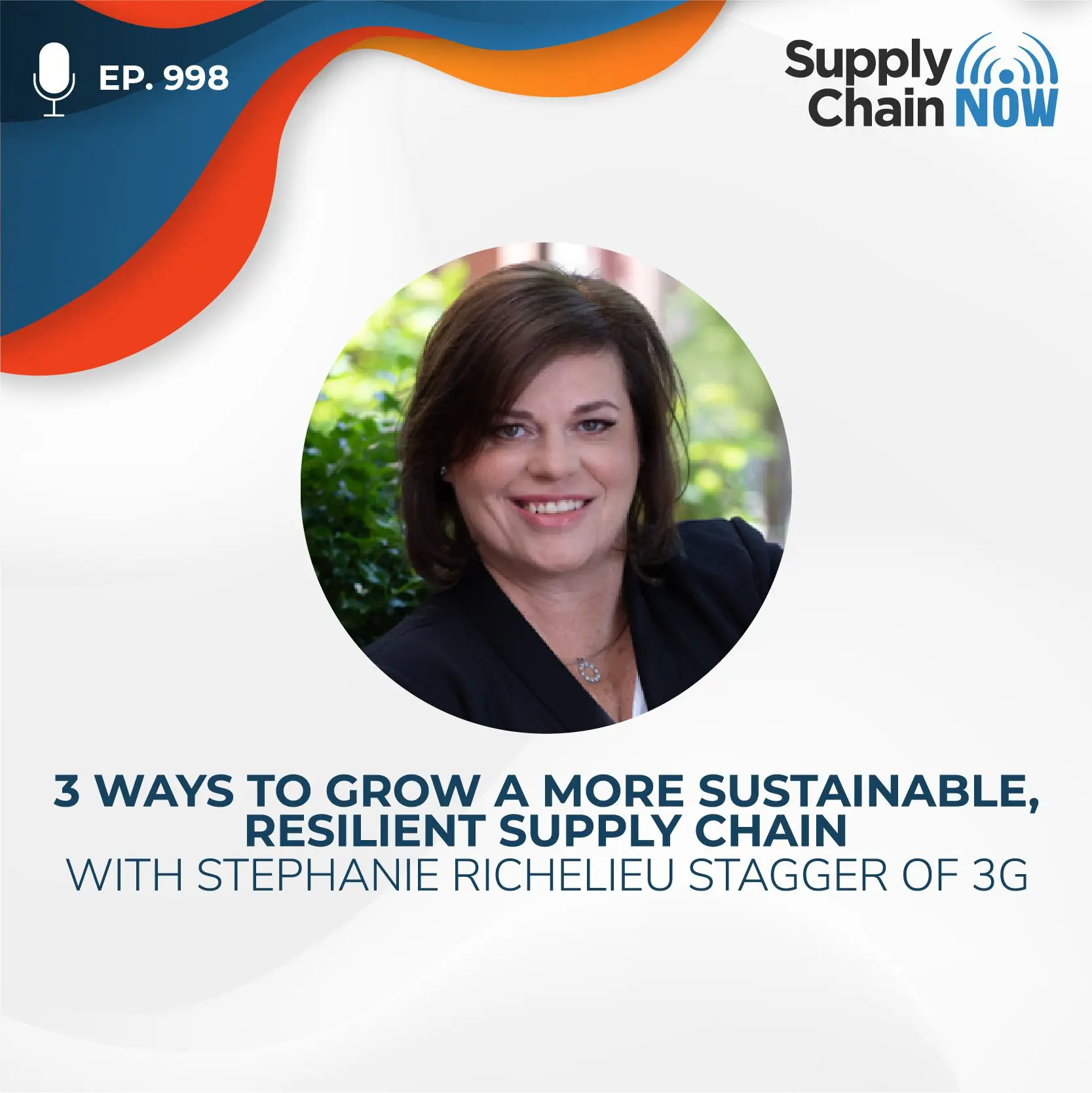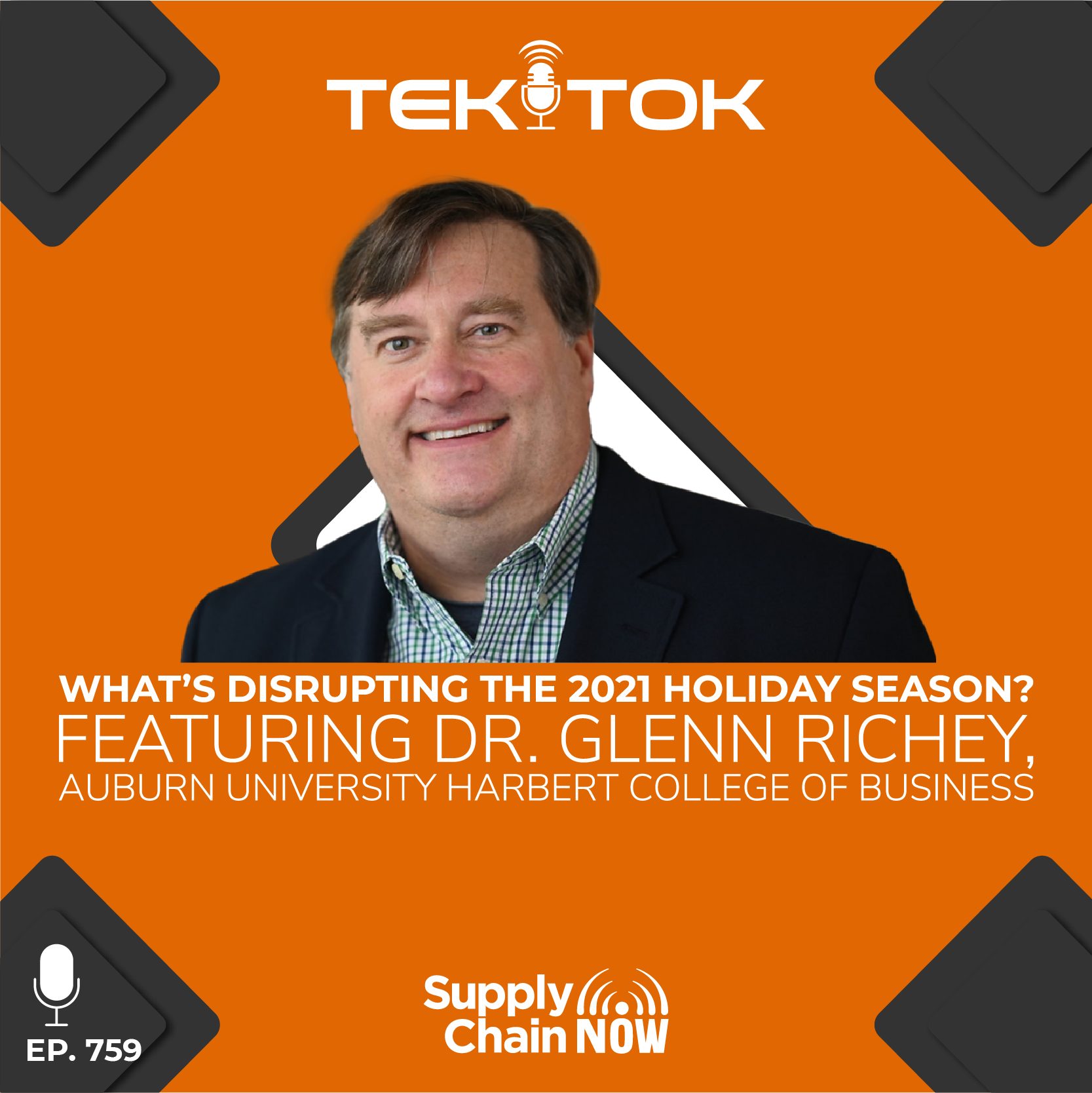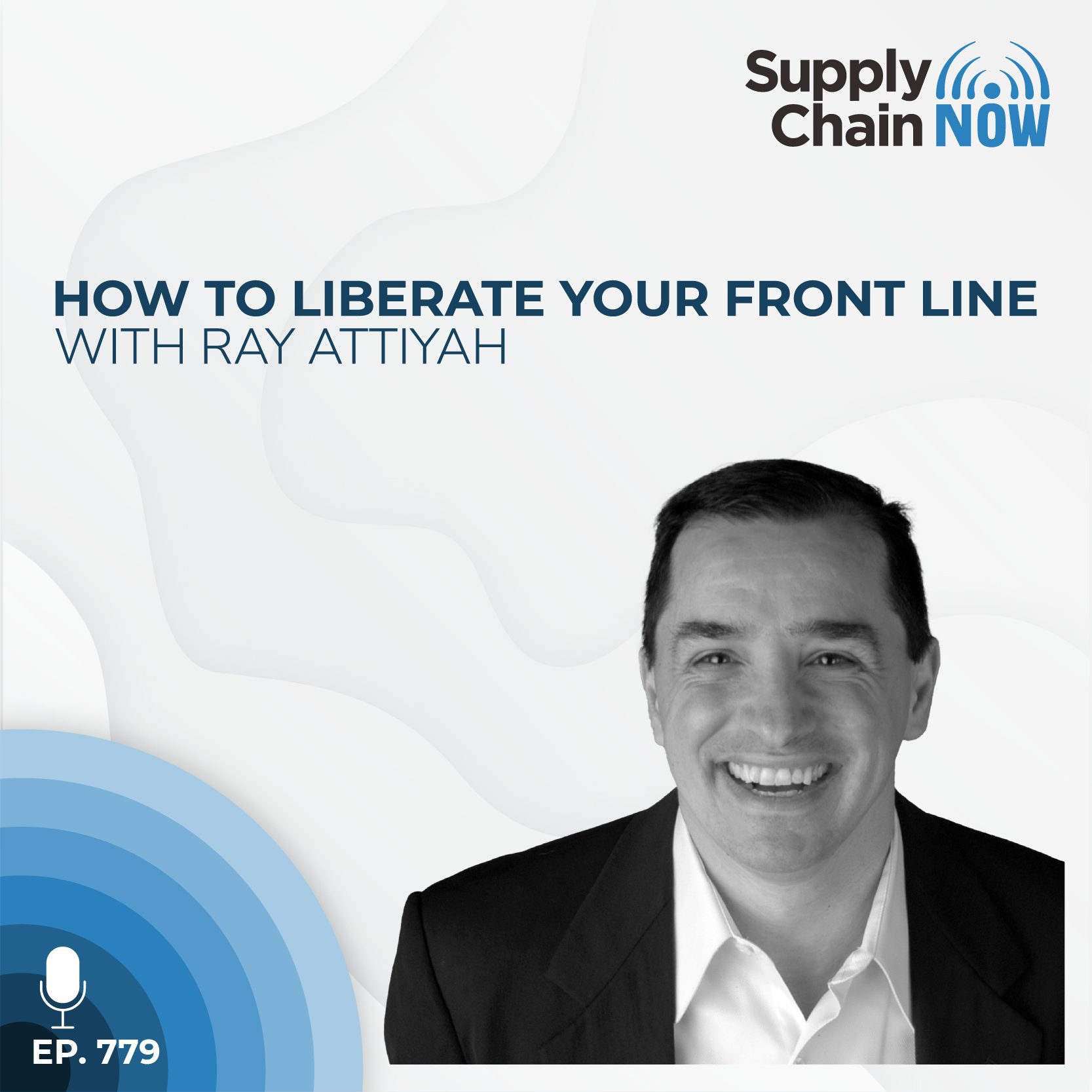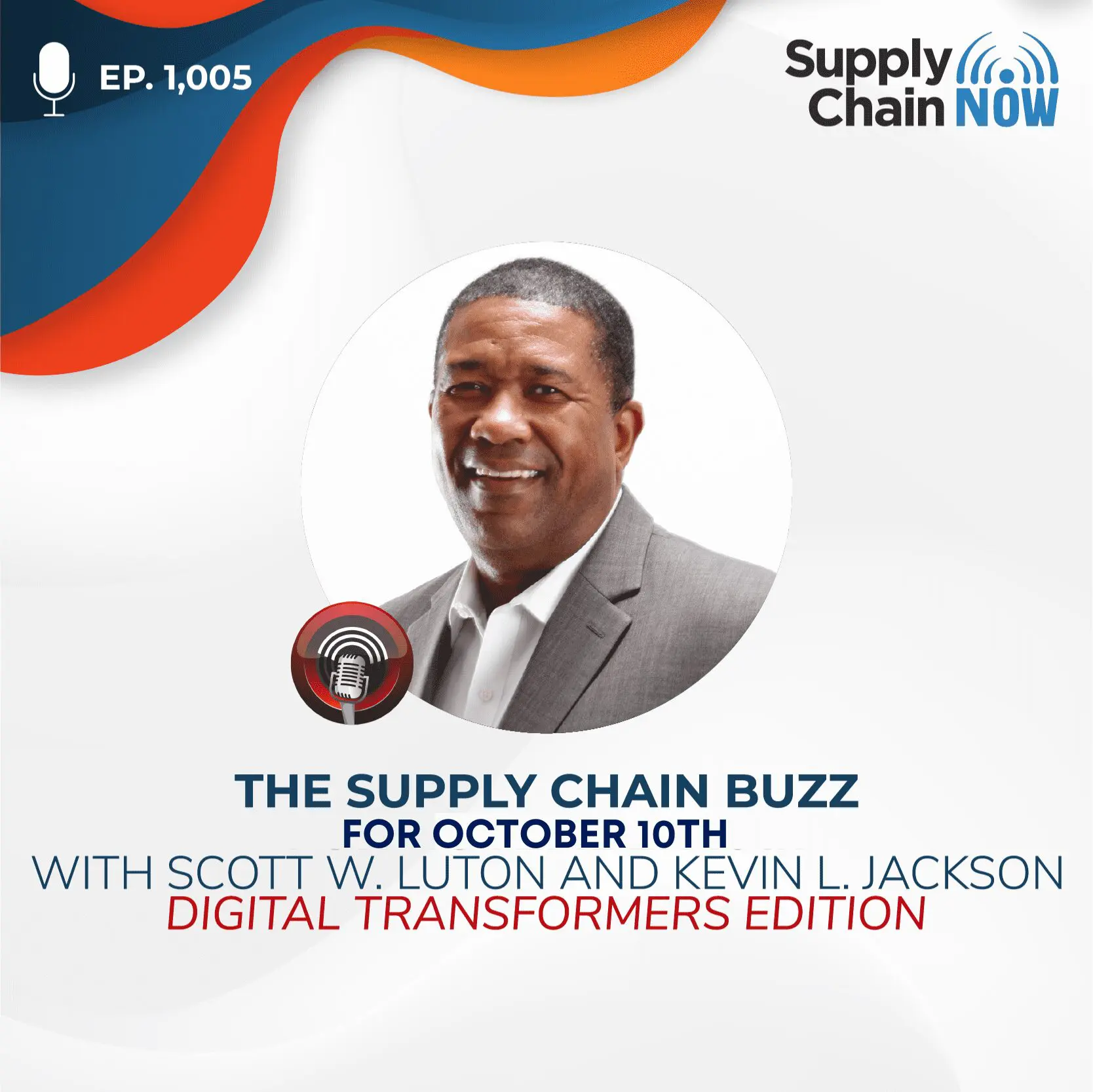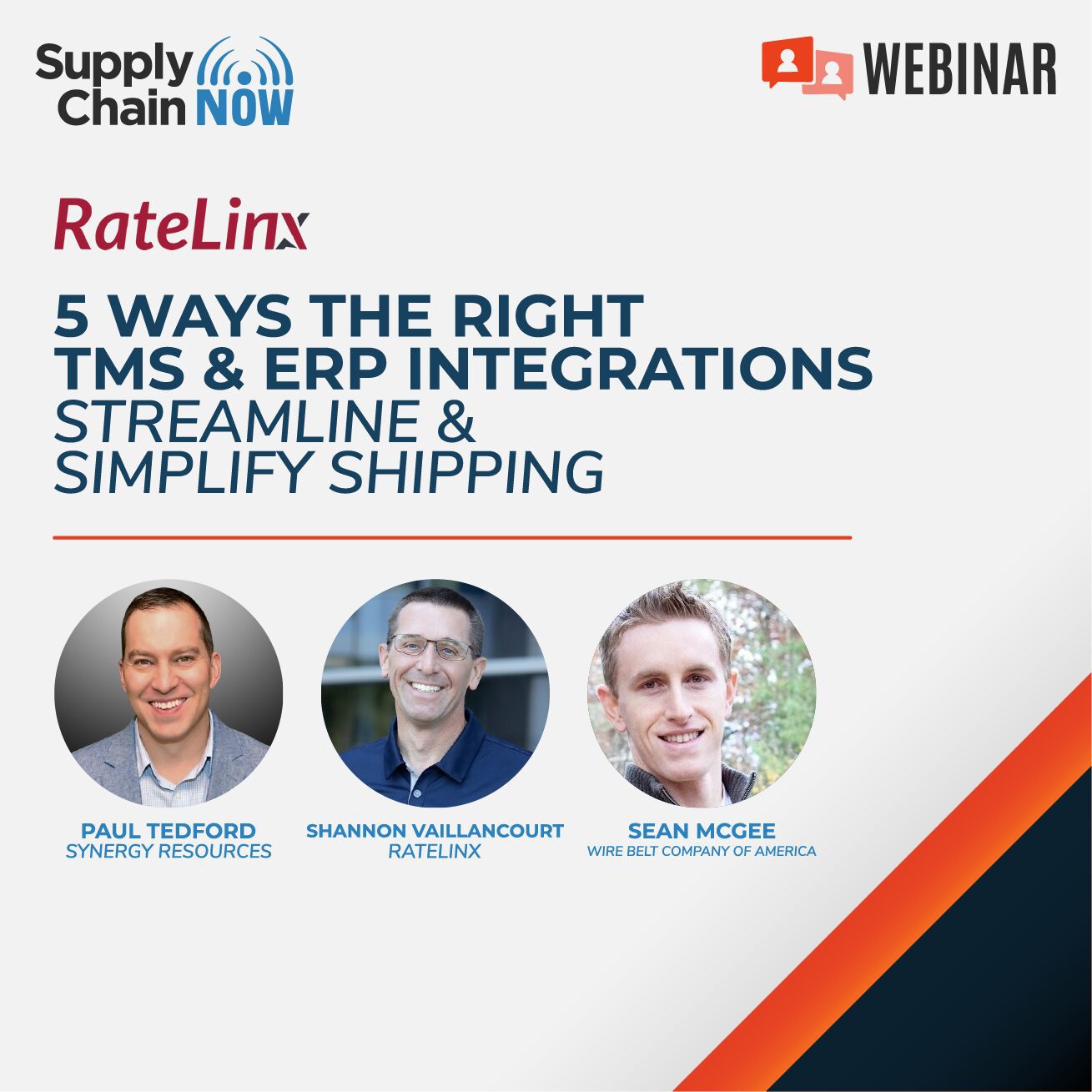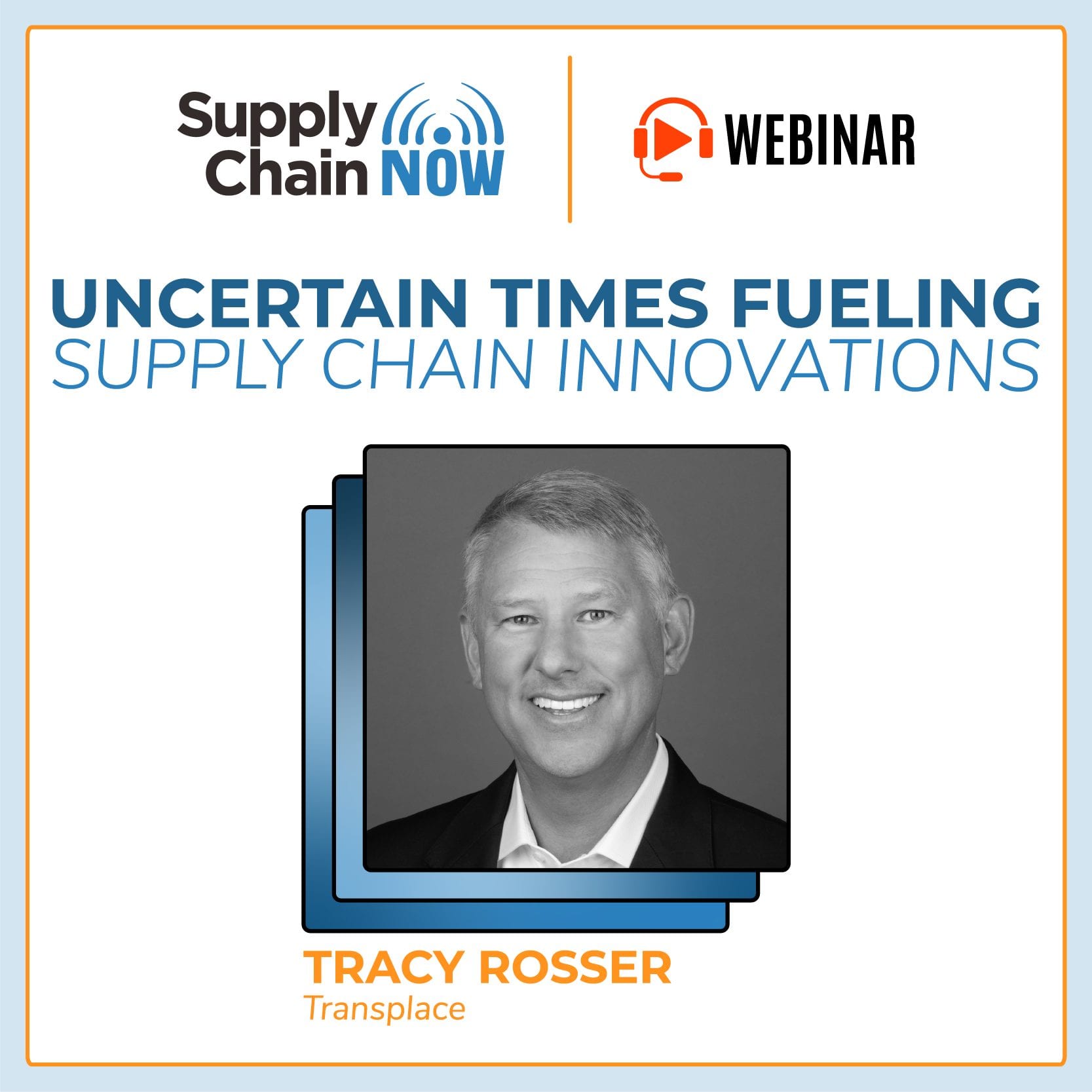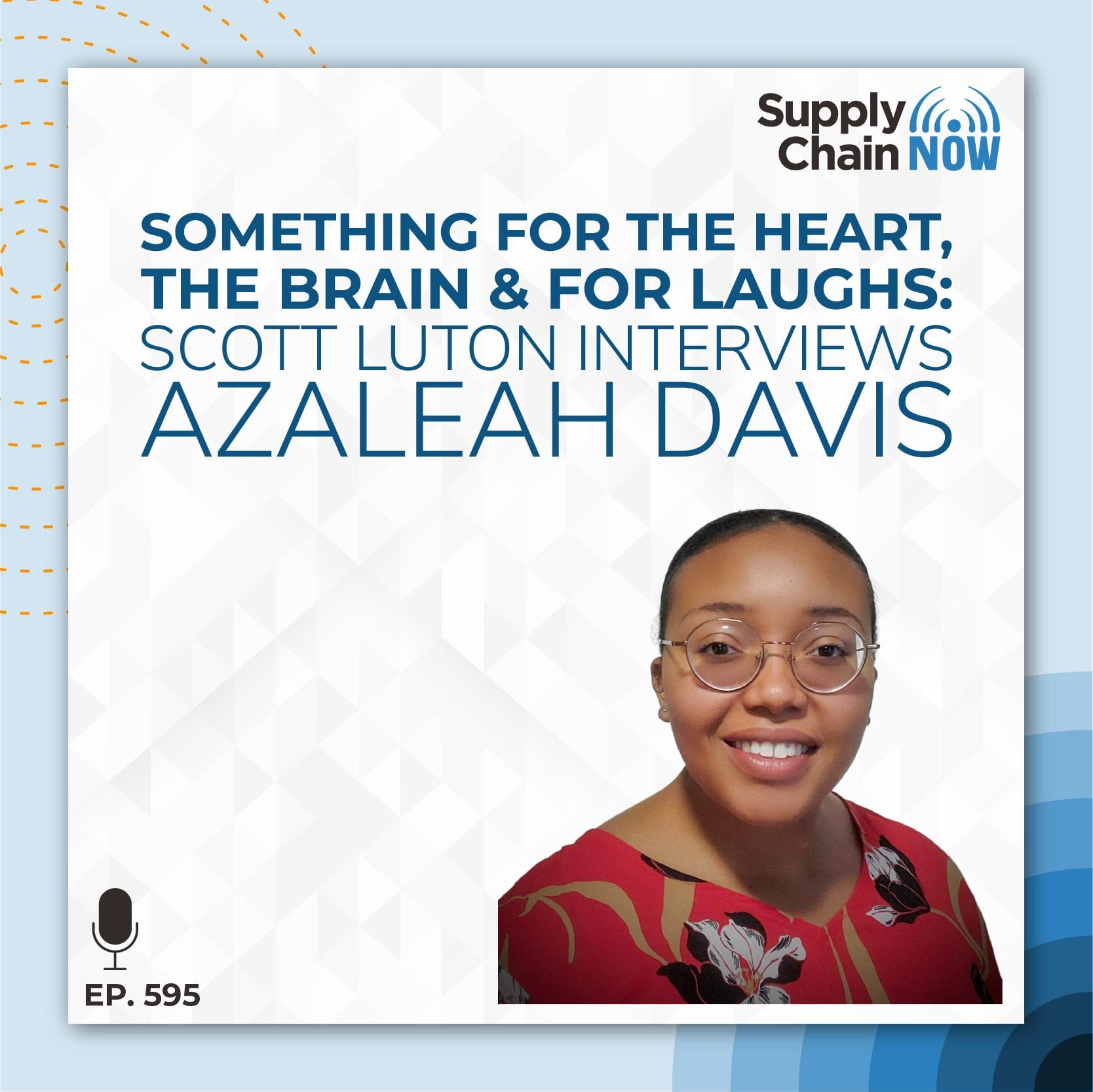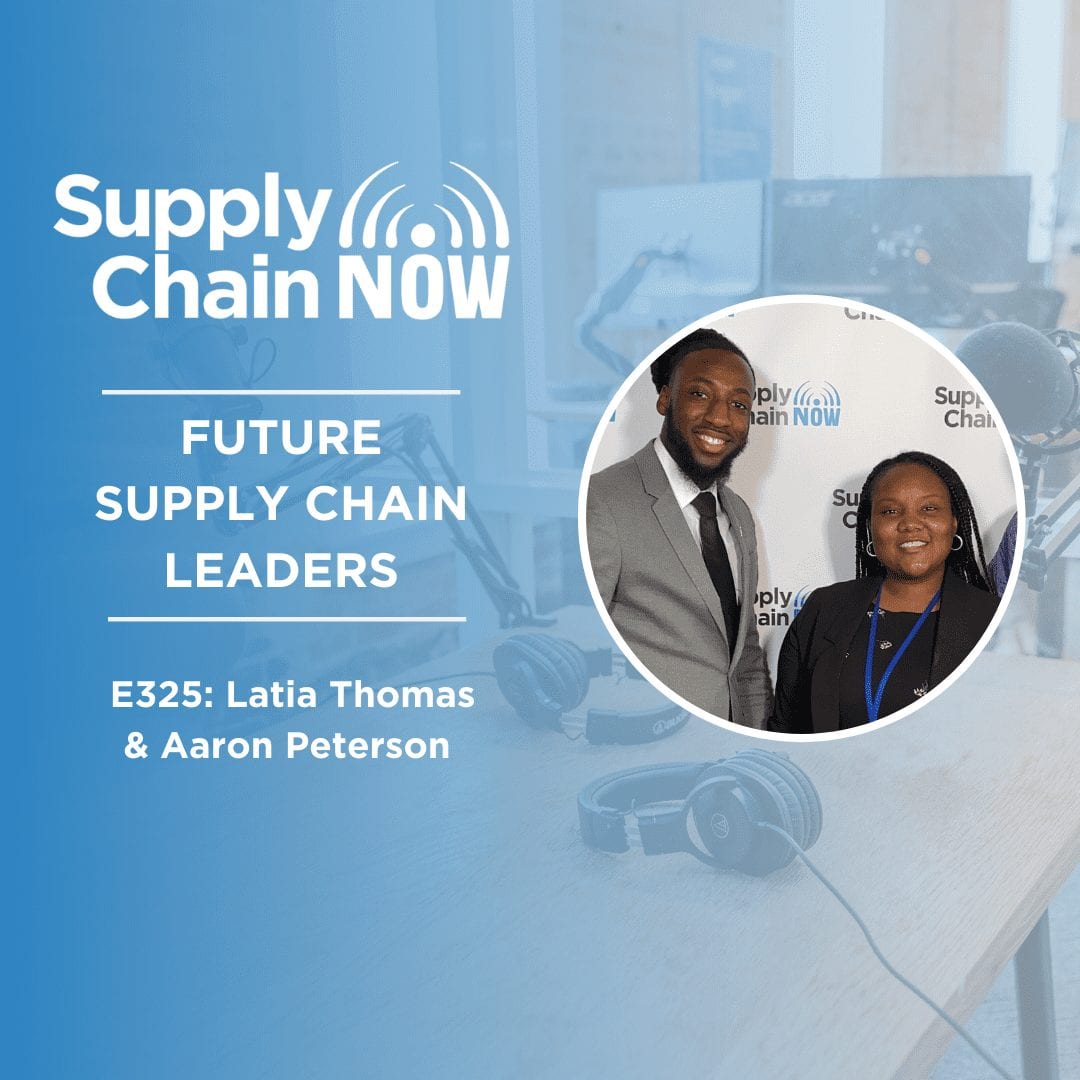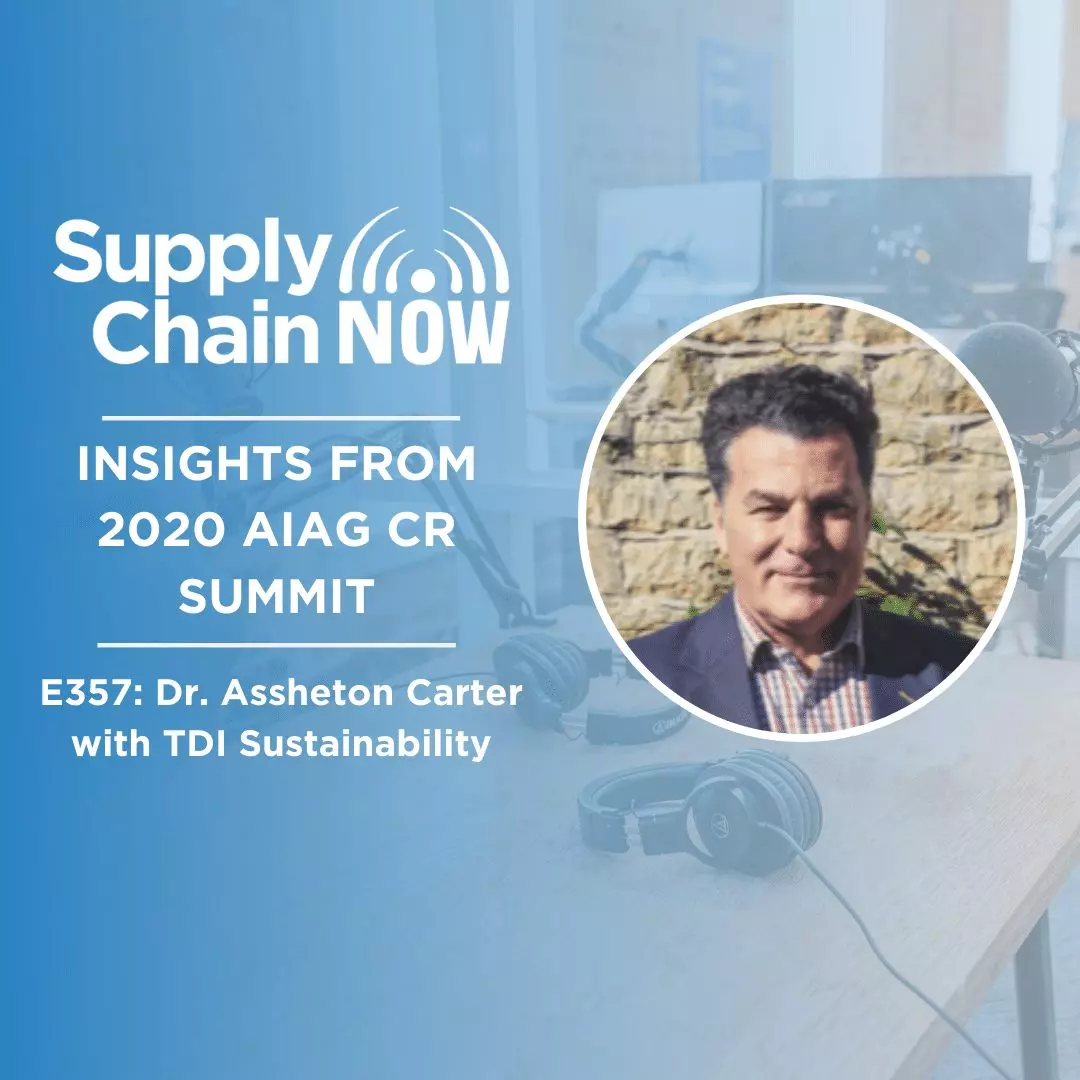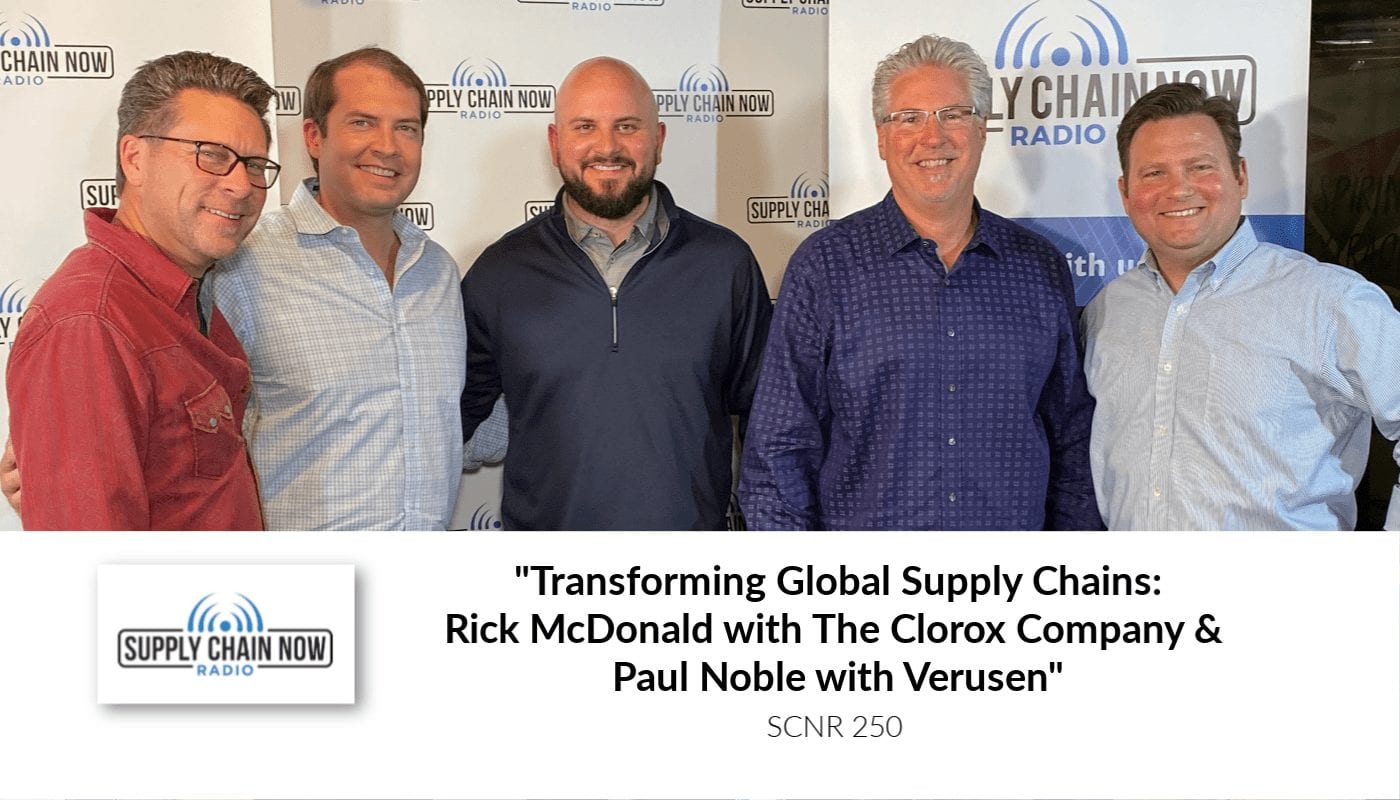
Episode Summary
“I have a real belief that you have to be out in the field. It’s really hard to run a supply chain from behind a desk.”
– Rick McDonald, Vice President of Global Operations at the Clorox Company
Rick McDonald has worked at the Clorox Company for nearly 28 years. He is currently responsible for their global operations group, 5,000 professionals dedicated to contract manufacturing, planning and logistics, engineering, quality assurance – essentially covering all of the supply chain disciplines except strategic sourcing.
In this podcast, Rick is joined by Supply Chain Now Radio regulars Ben Harris, Director of Supply Chain Ecosystem Expansion for the Metro Atlanta Chamber and Paul Noble, CEO of Verusen.
After covering some of the latest topics from the supply chain news desk, Rick shares some of the wisdom he has gathered during a long career in supply chain with Supply Chain Now Radio Co-hosts Scott Luton and Greg White:
- Why time is the enemy
- How companies today are in a talent ‘arms race’ whether they realize it or not
- Why every company should aspire to build a frictionless supply chain
- Common misconceptions about digital transformation
Episode Transcript
[00:00:05] It’s time for Supply Chain Now Radio Broadcasting live Supply chain capital of the country, Atlanta, Georgia. Supply Chain Now Radio spotlights the best in all things supply chain the people, the technology’s the best practices and the critical issues of the day. And now here are your hosts.
[00:00:29] All right. Good afternoon. Scott Luton here with you live on Supply Chain Now Radio. Welcome back to the show. On today’s show, we’re continuing our Supply chain City series where we dove into a variety of supply chain stories with roots right here in Atlanta. But regardless where you work, live or play, we’re offering news, ideas, best practices and really some of the neatest stories taking place in the global world of India in Supply chain. Quick programing note, like all of our series and Supply Chain Now Radio, you can find our replays over audio channels, Apple podcasts, SoundCloud, YouTube. Really? Where UPS you get your podcast from. As always, glad to have you subscribe. So you only missing thing. All right, really quick. Let’s thank our sponsors that allow us to bring these best practices and innovative ideas to you, our audience. The Effective syndicate Verusen. Vector Global Logistics, talentstream. And many more. You can check out each of our sponsors on the show notes of this episode. OK, so let’s welcome in my featured co-host here today. Greg White Serial Supply chain tech entrepreneur, chronic disruptor, trusted advisor Greg. Hey, Don, I’m doing great. How are you doing? Scott Ausland Fantastic. Great week. Where is it? It feels like Friday, but it’s Tuesday and we’ve had a great earlier show with a Midwestern entrepreneur doing big things. And look forward to this conversation here today.
[00:01:45] Likewise. Always good to have the Supply chain city crew and a house.
[00:01:50] The Mayor. Yeah. Blockchains City. Ben Harris, director. That Supply chain ecosystem expansion with the Metro Atlanta Chamber also is, as you mentioned, part of the Supply chain city crew.
[00:02:00] Yeah, BNA doing and doing very well. It’s always good to be back.
[00:02:03] It is. Show everybody your new jewelry. Cash. We have video. Yeah, that’s right. Jenny a hardware. Yeah.
[00:02:12] What’s funny is, is when last shows that we’re about to publish that your own someone made a joke about newly married and it went completely over my my head. So congratulations officially officiate at your Supply Chain Now Radio family. That’s going to be. OK, so that’s Greg and Ben. Marcoses, welcome in our featured guests here today. Rick McDonald, Vise President, Global Operations at Clorox. Rick. How you doing? I’m doing great, Scott. Appreciate guys. Habited. You bet. I’m excited to dove into some of the neat things that the core UPS companies up to and get you to weigh in on your supply chain insights, especially from a global perspective. And of course, a longtime friend of the show that’s vying for most appearances. Yeah. Yeah, that’s right. It comes with a heavyweight title. Yeah. Too. Well then. Paul. No. Paul Noble, founder and CEO of Verusen. Paul. How you doing? I’m doing well. Glad to be back. Great to have you. And for our audience, we are broadcasting from Sandeep, the Supply chain Innovation Center here at King Plow. And King Plow is a 19th century plow manufacturing or a facility that was repurposed in the late 80s, early 90s.
[00:03:19] Well, and that’s what that’s what you hear right now. Firstly, the repurposing has gone to say the key where there’s repurposing. Yes.
[00:03:25] So we’re we’re big fans of of, you know, protecting these facilities and repurposing them. We’re in the middle of a roof renovation. So that sound you hear is progress. If we can verify that it needed a roof because of the fuck place, various places around it. Well, we love King Plow and we love Sandia and our friends Vector Global Logistics who hosted us here.
[00:03:47] So, OK, so before we dove in with Rick and Paul and then in an interview, both of these gentlemen, let’s see what’s going on from the Supply chain now radio news desk. It’s more about stories and developments.
[00:04:01] Yeah. So it’s not I mean, it’s not what you it’s what you need to know.
[00:04:05] Yeah. Yeah. Whenever you whenever you hear it, you still need to know it. So it’s not just about now. Well you want me to go first. Go ahead. Great. Okay. Fade off here. So this is really interesting.
[00:04:16] John Deere announced that they are keeping their inventory low. So they are keeping their inventory to sales ratio or for those of us in the industry turns at the lowest ratio in five years.
[00:04:32] And this is an interesting dynamic. So usually when you have good news, the CEO delivers it. And when you have bad news, the CFO delivers it.
[00:04:41] But this was on an earnings call with their CFO, Ryan Campbell, last Wednesday. And I think that is an indicator of how things are sort of going and what they expect they expect to do additional cost cutting into 2020. And, you know, I think we’re going we’re gonna go into. Undeniably, some sort of temporary dip in the economy. It happens here and there’s nothing too nothing to be particularly concerned about. It’s just time we’ve been on a, what, 12 year tear economically. So we’re all just time to draw back a little bit. But anyway, there they are pulling back their inventories and planning for some additional cost cutting into 2020. More detail we can go into. But I think what’s important is that John Deere is kind of a leading indicator of where things are going in the in the in the country. Agree.
[00:05:36] You got something. Now, I see I hear the same thing about Caterpillar is like, yes. A source from so many different places all over the world as well. It’s had such a complex supply chain when it comes to that. So, yeah, makes a lot of sense. But now is going to add just about the, you know, the drive in e-commerce right now. Here it is. We just had Cyber Monday, so figured something around the holidays would be appropriate this time. Here’s your number of the day. And this is from appall page LLC you got. I’m sure you guys have already read this this morning. You get the daily download there. But yet $9.2 billion sound, that is the estimated Cyber Monday spending by U.S. consumers, according to Adobe Analytics. That’s sixteen point six and a half percent, more than a seven point nine billion spent a year ago. And that’s higher than they were expecting, isn’t it? You know what’s interesting, I think that’s the. I’m not sure that was today’s or yesterday’s if those forecasts or if that’s the actual number, because if it’s actual, I’d love to hear what the. If this is it or if there is an updated number.
[00:06:32] Yeah. Well and you know, what’s interesting about that is that number continues to climb on Cyber Monday. But the deals continue to spread out. I don’t know if you if you get e-mail, you’ve been getting e-mail for the last two weeks with here’s our Black Friday or here’s our Cyber Monday deal. You know, go ahead and buy it now or here it is Tuesday. And they’re still doing cyber. Right. Cyber way.
[00:06:53] All right. For B to that number was driven by one household and Walton County. Amanda was was on her toes. So I wonder what the top item was.
[00:07:03] That’s my question. You know, I don’t nothing jumps out at me now.
[00:07:07] Anyone else? Probably not something electronic. I would imagine.
[00:07:10] Mm hmm. Well, I know that. Good morning, American Oprah. They haven’t released their top gifts of the season just yet. So that’s that’s forthcoming pretty soon. Yeah. Not to say that’s going to be the best selling item, but those things do they tend to they better have some inventory on. Yeah, sure.
[00:07:24] This is a really interesting year, too. So being a retailer, the number of days between Thanksgiving and Christmas is always really important. We have six fewer days between Thanksgiving and Christmas this year than we had last year. That’s as far as it can go. By the way, it’s with 32 days between Thanksgiving and Christmas last year, 26 this year. The way that I know that is because I’m an educated retailer. No, because my wife made us buy the Christmas tree early, because we weren’t going to. It was going to be up for long enough. If we didn’t if we didn’t have it before Thanksgiving, that was probably a driver for the marketing to come out as early as it did.
[00:08:00] I think Black Friday stuff on middle of October is good to say.
[00:08:04] I like review of the preview of Black Friday. Yeah. Right. For Halloween. Unbelievable.
[00:08:09] Yeah. I guess the CEO also dictates Christmas tree buying patterns to write everything. Sheer. Dickerson dictates everything.
[00:08:16] That’s so funny you mention that. I was thinking that was the story I was into as my second story was actually the the late crunch basey this year from the amount of days that we just don’t have. And it’s funny because we all talked about RLA. I feel like Thanksgiving is a little bit later this year. Yeah. But yeah, that causes major siplon in crunch.
[00:08:33] Yeah. The pressure on Logistics is. Yeah. And see that dramatic. Right. It really is.
[00:08:38] Well if you member been speaking Christmas trees a year and some change ago, one of the new segments we tackle was a Christmas tree. Supply chain. Yes. Now there’s so many there’s so many fewer U.S. base farms, which is adding a lot more lead time, which might be why we’re seeing some of these things so early. Malindi, I’ll get fresh trees or to use artificial, usually fresh out of artificial every here.
[00:09:01] So get started on that out. I mean, you know, a lot of that. I’m a chronic disruptor. And a lot of what’s happening is that because those trees take between three and seven years to grow to the height people are taking that land in North Carolina is a great. Is it one of the top producers of Christmas trees, at least in this region?
[00:09:22] They’re putting that land in hemp because in the last couple of years, hemp has become legal. Right. From whom? We’re making rope again. And and you can harvest that crop multiple times now rather than wait for hurn Christmas trees. All right. So I think we may see a push towards more artificial trees. I don’t know. I mean, you guys. Well, supply and demand. Yeah. And then you haven’t experienced it yet. But I’ll be interesting to hear your report on what’s left in the marketplace when you when you act, measure Musri late to the game.
[00:09:55] Yeah, that’s right. You could you could get one of those Charlie Brown tree with. Are the grants? Yeah. Yeah.
[00:10:03] All right. Anything else from Malcolm in the News team?
[00:10:07] Nothing. No, I don’t think anything else.
[00:10:10] Well, I was just going to say, you know, the last town that we had this crunch, basically, you know, the way the calendar is just turned out, the Sheer was back in 2013 when e-commerce was half as far from a demand standpoint out it is now. So you talked about the demands and the strain that it causes on on e-commerce with retailers. I mean, it’s can completely different ballgame any numbers and how that’s affected the brick and mortar output. I have not seen yet, but that’s a good question. We should get Malcolm on that for sure.
[00:10:37] Why? The projections I read was that brick and mortar shopping would be down about 20 percent this black for a while prior to the 50s to the 30s. So Tony Sciarrotta, the chairman of the Reverse Logistics Association, is a big Black Friday shopper. He really does that not surprise you?
[00:10:56] I mean, first of all, I have always despised Black Friday because I used to work in a retail store. And being on the other end of that is anyway hellish.
[00:11:06] Yeah.
[00:11:07] And I hardly go out and shop for anything. So I think I’m guessing by the reactions, nobody here went out on Black Friday shopping. Did you know anybody, anyone in your household?
[00:11:16] You know, and there’s this whole opt out, you know, area that the outdoor company has been doing it for years where they’re actually encouraging folks to get outdoors. And if I’m not mistaken. I saw this on Twitter, which means it’s absolutely true. Yes. Is that they give their employees a paid day off on Black Friday. So would you really need some help? Okay, so let’s dove in. I’m really excited to hear from where to start with Rick McDonald, BP global operations with the Clorox Company and work as we’d like to do all of our featured guests before we kind of talk shop and dove into your supply chain insights. We want to know more about Rick McDonald, the person. So tell us more about where you grew up and and give us some some anecdotes about, you know, some some stories about your your upbringing. Yeah, for sure.
[00:12:04] Well, I I grew up mostly here in Atlanta. You know, as a kid, I was always involved in various sports, baseball, basketball, high school, volleyball. So very competitive. I loved team sports, also played piano and drums. Israeli scout, Eagle Scout. So.
[00:12:21] Yeah. Yeah. A little bit of everything. Yeah. That’s impressive, Matt.
[00:12:25] Yeah. What school year at Georgia Tech. And when I got out of work for Frito-Lay and spent about 10 years there in five different manufacturing facilities. And then for the last twenty, almost twenty eight years now. But Clorox.
[00:12:38] Twenty years did you. We featured a member of the Clorox team. It’s been a while, but seems like there’s a lot of tenured folks there. It’s a it’s part of the culture, right, that you get good talent in and you’re in good company. Good companies like Clorox are able to kind of keep them, right?
[00:12:54] Yeah. One of the things we’ll talk about is we really believe that our people are our biggest advantage. And it’s not just a slogan. We don’t ride alone in our documents. We really try and live it every day. And the culture is what keeps people there. We also have a lot of people who boomerang. They’ll go and see an opportunity and they’ll run for something they think is more interesting couple of years later, many of back. And I think that’s a great testament to the guys that really have the way we work together.
[00:13:20] I think it’s cool that you’re open to bringing them back. Also, a lot of companies, it’s kind of, hey, you left and that’s it. And you know, but I think that’s awesome that you guys are okay with them going, you know, getting some other experience out there and say, you know what, I’d like I’d like to bring that back.
[00:13:35] So, no, I’m not I’m not sure we’re OK with it because there is a there is a call for it.
[00:13:41] But but the point is, if if someone has been has done a good job while they were there, they leave in the right way. Yeah. And they have an interest in coming back. And we have an opportunity that fits their skills and expertise will entertain that.
[00:13:54] So going back to you’re talking to all the different activities you’re enjoyed doing. Well, as you were growing up, what was your favorite? What was out of all those? I mean, from music to sports. What was your favorite?
[00:14:05] My number one love was basketball was. Yeah, yeah. I love that sport played pickup until I was in my 40s and then my back’s at stop. And so.
[00:14:14] But yeah, great sport. And let’s talk about so. So Frito Lay Spit. How many years of Frito Lay prior to Clorox? 10 years, 10 years in Supply chain functions, always in manufacturing, five different manufacturing plants over 10 years. How did you see when you’re at large companies like Frito-Lay or Clorox or some other they have multiple manufacturing plants across the globe. Some of them are able to to really maintain a cohesive culture. And then you see other companies where each single plant has its own culture and they can be very disparate. What was your work in the five plants to Frito-Lay? What was it like?
[00:14:51] The plants were very similar. Frito was all about best practices. They were all about consistency and commonality from the technology. The training to the employment methods, to retention approaches and performance management. And so it was. There was a lot of consistency from site to site to site.
[00:15:10] Ok, so fast forward to now back to the Clorox Company, where you’ve been now 28 years. That’s a feat in and of itself. What’s what do you do in your current role?
[00:15:20] So my current role, I’m responsible for our global operations group. It’s about the company’s got eighty eight hundred employees, about 5000 over in my shop, manufacturing, contract, manufacturing, planning and logistics, engineering, quality assurance, all all the supply chain disciplines excepting sourcing.
[00:15:37] Wow. 5000. Yeah. Now are you able to get out a good bit and see the different sites and facilities?
[00:15:44] I do. I have a real belief that you have to be out in the field. It’s really hard to run a supply chain from behind a desk. And so the travel internationally is is always interesting and always a great chance to see what’s happening, other parts of the world and things that we can rip and reapply here.
[00:15:59] Yeah, absolutely. Benchmarking. Where are you producing around the world? I mean, where whereas what are your most common international destinations?
[00:16:08] So Latin America, we have plants throughout Latin America. We have joint ventures in the Middle East. We’ve got a couple of manufacturing plants in Asia and a number of contract manufacturers in the Asian region.
[00:16:18] Ok. All right. So everyone’s the mayor with the Clorox Company and many of the products, probably plenty of us here have them in our houses right. To sit here today. But what are some of the things that folks may not know about the Clorox Company might present?
[00:16:33] Well, a couple things. First of all, we we we don’t make a big deal of this, but we don’t aid in either cash or products or volunteer hours. Over 20 million dollars in communities around the world each year. And we’re pretty proud of that. We’ve had a really good culture of people giving outside of work. And so that’s one item. The second is we we achieved all of our environmental goals, a reduction in greenhouse gases waste a landfill ahead of our ahead of our planned target. And in fact, we have 15 0 to waste factories, which we’re we’re excited about. And we just made a declaration we’re gonna reduce our plastic packaging by 50 percent while outsourcing.
[00:17:12] That’s five years. So, Ben, we’ve got to make sure we get Clorox nominated for the Sustainment Sustainability Excellence Award, part of the Terry 20 Atlanta Supply chain works FHA which quick departure. Congrats to Verusen Paul Reales recent nomination year, the same program. All right. So let’s pivotal a bit, Rick. Let’s talk about executive education for Supply chain leaders at Clorox. And for starters, why is this important?
[00:17:36] Well, it’s critical for all organizations and certainly ours. There is a there’s a dearth of supply chain talent, especially at senior leader levels. And, you know, we know that we’re going to win based on the quality of our people and how well we train them in, how well we retain them.
[00:17:51] And so we were really looking at how do we plus up our approach to developing our more senior leaders in the supply chain so they can be good end and thinkers and really understand kind of being a master of orchestration for the supply chain versus a discipline expert, where they become more big picture thinkers and they can they can not, you know, think about in this supply chain, whether it’s procurement through production or through engineering or product design or whatnot, into production, into transportation, reverse Logistics. It sounds like you’re gonna want a more well-rounded leaders that may know, you know, deeper and deeper pocket pockets of understanding across those functions. Yeah, that’s that’s right, Scott.
[00:18:38] It’s it’s really about making sure that at the leadership level, a decision made at one point in the supply chain. You understand the implications throughout the supply chain. Sometimes you optimize in one part of the supply chain to the degradation of other parts. And we worked really hard to make sure that we see the entire end to end supply chain and make good choices that are positive throughout this budget.
[00:18:59] Interesting. You know, we not too long ago we interviewed Agro. Yeah. Right now with Dell, you know, he graduated from Georgia Tech’s I s Y E program, engineering program. And he really talked about many of the reasons why millennials are perfect for supply chain. Right. And one of things he touched on and one things we read probably was I’ve read a lot about is how these generations come into the workforce. Now, won’t exactly what you describe, which is that bigger picture where they fit in upstream and downstream. And are you seeing that as well as you bring people on board?
[00:19:35] Yeah, we are. We are. And we’ve developed a few programs that are really trying to cater to those individuals who are coming into our organization as recent college graduates. We have a Supply chain leadership development program. It’s a three year rotational program started about seven years ago. And most of the folks who started the program, maybe six to 10 per per year, have have remained. And they’re valuable contributors are now they’re they’re learning how the organization works and they’re contributing across the supply chain in various locations. The first year of the program is either a manufacturing or staff assignment. The second year is the opposite. In the third year, as this assignment that we pick mutually with fits their interests and their needs and the interest needs that we have.
[00:20:19] So we’re gonna dove deeper a little bit more within into overall talent development. Supply chain talent billman at the Clorox Company. But before we leave that executive education. Anything else that that we might have missed that you are doing to continue to develop your senior leaders? Yeah.
[00:20:35] Ten, ten years ago, we we do an engagement survey through Willis Towers Watson every year. And 10 years ago we discovered this gap in developing our senior supply chain leaders. And my my then SVP of Supply chain grabbed me and said, let’s go down and talk with Georgia Tech about SEUS good developer program. And we did. It’s a strategy and leadership forum. It’s a two week and residency program. We have 250 graduates so far. And this is plant manager between the plant manager level and director level with an organization. We’ve invited other functions to come in and participate with us in these two week program, 22 modules. It’s built on the strategy, pillar operations, excellent leadership and management and applied technology, which is our sort of our clever way of saying we get free project management work out of them. Yeah. They’re all assigned to a project team and these are real, real projects, many of which we have activated. So it’s been a it’s been a fantastic thing for us in terms of developing that into thinking, having them think about the Supply chain as an orchestrator s and and really have the discipline to understand how things connect and what the implications of their actions are.
[00:21:47] At one point, the supply chain on the rest of Supply chain is that more valuable and important today with this global business world we live in where you know you’re not necessarily one department is not gonna be fifty feet down the hall. It’s maybe on the next continent, right? Or the the neighboring state. How important is that now? More than ever before to understand, you know, the whole the big picture. Yeah.
[00:22:09] Geographically dispersed. He has a lot to do with making this a really important thing, as does the pace. So the pace of the supply chain has increased. It’s going to continue to increase. You know, one of the things I really believe and it’s part of our digital transformation is time’s the enemy. You know, time’s the enemy. We’re really the person as a manufacturer who has to figure out how to carve out all the time we can so that consumers can have their demands met as as quickly as possible. And so that’s part of our digital strategy.
[00:22:38] Look, I was going to ask Rick Habiger each of the classes I classes. But, you know, when you talk about Nemr modules, these photos go through. Is it 12 folks from your team? Twenty four or five.
[00:22:49] Forty. Forty five at a time. At a time. Yeah. And we’re going to run our eigth class starting in January. The second week will be in March. And Georgia Tech’s been an absolutely great partner on this. They helped us co-develop all the modules we teach, some of them professors or industry experts will teach others. And, you know, we’ve home the content over the years as we saw what worked and what didn’t work as well. We do a survey at the end of each of the classes. So we’ve continually improved it as we’ve gone through the through the years. And that’s employees from Clorox all from all over the world to correct us. Yeah, I know it’s a it’s a global cohort and we make sure we involve we’ll have general managers or people from finance, R&D, sales, marketing, along with supply chain professionals. It makes for a an incredible cut. This is not a lecture series. This is a night when I when I kick it off on Sunday night, I say, you got to find your voice and find your voice early because it’s a no holds barred. Let’s have the debate. Let’s have the discussion and learn from each other as we go. I love that. That’s great.
[00:23:47] How about your team members love it, too. Do you get good feedback on it? It’s been fantastic.
[00:23:52] I’ve been investing in people like them. That’s what people really want these days. And that’s what I think as we see, you know, as we talk about talent development and so forth. Each of these companies, it’s almost like an arms race. I you think about, you know, who has the best development program and how can you show really a true path for each employee in different companies? I think that it sounds like you’re your development program does just that.
[00:24:13] Yeah, that’s right. But we’ll put it’s been keeping keep going on that path. Now we got some questions around overall overall talent picture, right?
[00:24:20] Yeah, I was going to say so, you know, when we talk about development programs, you know, we talked about obviously, you know, for your more your executive team and folks that you see as high net worth individuals as far as, you know, what they bring to the table from a value standpoint. The other parts of the company, you know, not just say Supply chain, I’m more so. Are there different, you know, other parts and manufacturing, I should say. But are there other parts or other development programs that are being instituted in other parts of Clorox also?
[00:24:48] Yeah. So we like the we like the Strategy and Leadership Forum program so much. We developed another program called the Global Operations Leadership Forum. It’s for the next couple of great levels down. I don’t. No, the number of classes we’ve taught, but it’s a three day in residency course is a lot of online content. And we’ve moved there 750 people in that group within the Supply chain, and I believe about half of them have been through the program at this point in time. So it’s another big investment that we made in helping people understand how that End to end Supply chain works and what their role should be in it.
[00:25:21] It sounds like, you know, the Georgia Tech used to have a program. I think it was the Masters in international Logistics or something similar. And it started there. And I married a couple people I knew that went through it. And it was a great program. But, you know, two years to your standpoint, all it means from your standpoint, it has to be catered to what each company really needs for their employees. Guess it’s not a one size fits all approach. Yes. I think that’s why Georgia Tech really pivoted away from that program and did more executive education. That was, again, much more catered to, say, Clorox needs.
[00:25:50] Yeah, that’s right. And the way we developed it, we developed it. So about 80 percent of the content was not about us. We can talk about ourselves anytime, any day. Right. And the first couple of classes really wanted to do that. They wanted to talk about the Clorox examples. This was really to give us all exposure to what’s happening in industry, because many of us are trying to solve the same problems and figuring out how others have done that is really instructive and valuable. When you think about it in the context of your work.
[00:26:14] Mm hmm. Mm hmm. But still relevant to your business. Right. I mean. Correct. And you’re because you’re able as you’re able to structure the coursework, then you can make it relevant even if it’s not specific. Clorox example. Let’s that’s doing that more and more. And I think that’s really valuable. Yeah, right. Because it’s it’s learning on the job in a way. Right. It’s very relevant and very practical. But but it gives you skills and it’s embedded in a way, you know, with professional educators that you absorb and keep it right. That’s right. Not not like sitting in a in a company meeting for four hours.
[00:26:59] All Rick, last question. I mean, we talked about, you know, great wins, you know, for these this programing and this talent development. But it was there maybe a great story or maybe one thing you could point to this and that that really, you know, here here’s a great story that came out of this talent development program. More I can point to this, you know, examples, personnel.
[00:27:18] There are multiple examples. You hear people referring to something they learned in the strategy and leadership form with some problem. They’re trying to solve some problem. Project their on. You know, one of that one of the most interesting things that happened, I think was year three. It was right before the beginning of the first week in residency. And one of the former, you know, previous class members saw me at the Bank of L’Arche. He goes, hey, it’s it’s coming. As it’s happening. I’m thinking, well, it’s my wife’s birthday. And I say, well, okay, John, I give up. What is it? Is next week. It’s the first week of us L.F., isn’t it? I said, I wish I could go again. And that thought pervades through a lot of people who’ve had that experience. And so it’s been a really neat program for us and a great way to help us develop our our senior supply chain and give us an ownership. It does, yes. And we’re investing in them and they recognize that it’s a it’s a it’s a material investment. And we’re we’re not alone in doing this, but not a lot of companies are.
[00:28:17] And so we feel it also differentiates on it’s great institution like Georgia Tech right here in Georgia Tech.
[00:28:24] How much better could it be? Right. Yeah. All right. So now we want to shift gears. You’ve already mentioned the Supply chain digital transformation. I know that’s really important to the Clorox Company. And you’re making progress.
[00:28:36] And there’s as many companies are figuring that out, right. That journey first, for starters. What are your objectives with Supply chain digital transformation? And in kind of what’s your approach look like? How are you going about it? Yeah.
[00:28:48] So they’re really they’re really three things. First of all, we want to build a frictionless supply chain. This is really about taking out anything that slows us down. I mentioned before the time is the enemy and saying we’ve got our we’ve got a keen focus on how do we make ourselves faster? How do we make processes run smoother, run better. That’s number one. Number two is we don’t take touch his out. We don’t want to touch paper, data, product, equipment, anything we can do to minimize touches. That’s that’s the second part. The third part is kind of a combination of the elimination of data latency, which will lead to us seeing our results more. Real-Time. Today we don’t have those tools and those capabilities. And so we’re we’re left wondering how well we perform for a certain period of time. And I think many others are in the same way. We’re we’re really trying to get the data latency out so we can see our results faster and adjust quicker.
[00:29:41] You know, some of the folks we’ve had on the show and some of the articles we’ve been reading lately, that is how 5G is going to be on the third point is going to be able to enable that better and allow folks to move faster. I love how you put time. Enemy is kind of what the earlier podcast was about under. If your goal is you survey the 5G technology and it’s already been rolled out here in Atlanta, how does that impact is that you’ll see that as a big enabler for your transformation efforts as well?
[00:30:09] You know, I believe it will be at the moment we’re working on switching our transportation management system, changing our planning tool to world class planning capability. We’re digitizing all of our quality data. So we’re gonna get away from the thousand fireproof file cabinets. Same for our safety, quality and regulatory content. Environmental content, that’ll all get digitized. We’ve got an artificial intelligence solution we’re working on and part of our order to cash process. And then we have we have just a number of other interesting ideas that are part of our roadmap over the next two or three years.
[00:30:42] Outstanding. Full disclosure, I’m a big fan, but you probably ought to be talking to him. Data is important. Yeah. Living. Breathing thing. Yes. Yes. Yes, sir.
[00:30:54] So you’ve really appreciate you sharing your approach as well. Some of the projects for 2020 in particular, not just for, you know, that twelve months around the corner. What what’s the biggest project that’s part of the transformation that now that will get accomplished.
[00:31:09] There are there three of them. And they’re actually on top of each other, which is a little bit interesting, a little bit challenging. But we’ve got great people working on and we’ve got really good integrators, third party integrators. So are we’re changing our teams. We’re going live with that this quarter and we’ll bring it on region by region by region. And we’re very excited about that. It’s gonna give us some incredible Real-Time capabilities that we haven’t had in the past. So we know that’s gonna help us from a service in a cost perspective as well as taking time out of the equation. Second thing is on our planning tool, we’ve already brought two businesses up. So we’re gonna continue that march every six to eight weeks until all the businesses are on this planning tool. And that’s a.. It’s a massive it. It’s fundamentally changing the way that our demand and supply planners will work.
[00:31:56] Sorry. Going from spreadsheets to a system we won’t ask them to.
[00:31:59] And we are. So we’ve publicly announced we’re using can access rapid response. Okay. And so we’re moving to that. One of the biggest things, we haven’t touched on it yet, but this this I think a lot of people are really quick to run to the toolsets. They aren’t the shiny object in the corner. It’s the neat, cool thing. It’s different. The biggest issue and the biggest challenge in making all this stuff work is a change management approach. And a lot of people underestimate what’s necessary. They are kind of the leadership mindset and your colleagues skill set to be able to make the toolset work. And if you don’t have the mindset right and the skill set, you leave people behind, the tools will not be leveraged to their fullest capability. So it’s really something we’re focused on is making sure we’ve got that change management component right as we go through the TMX change, a planning tool change in the third one is our electronic quality management system and getting everything digitized. That is just as you lay it out.
[00:32:54] The level of change that your team is managing is is it makes my eyes roll in parallel. Yes. Yeah. Yes, that’s dramatic.
[00:33:03] And if you touched on this already, I may have missed it. But that change management part of that 22 week, is that a big element? You bake into that 22 week program that you’re doing with your senior leaders?
[00:33:14] It it is it shows up in three or four different modules, different ways. And so they’ve all been getting a dose of that for some time now. But I would say in a transformation like this, where we’re changing people’s work, we’re changing the tools, we’re changing what’s familiar and comfortable. This is the biggest challenge that we’ve undertaken. And, you know, so far, so good. But we know there’s a lot more heavy lifting to go.
[00:33:38] Outstanding. Well, we look forward to having you back on and talking through maybe a year down the road, how just how far you’ve come. Very ambitious. So let’s let’s let’s go look more broadly, more agnostic here, because you’re living in a lot of us are writing about it and are talking about digital transformation. I mean, your team, your Team one Embree and breathe in it. What do you think are some of the common misconceptions about digital transformation out in the marketplace in general?
[00:34:03] Yeah, I’ll come back to a lot of focus on the toolset. Everybody gets really you know, we had a I’ve given a presentation a few different times. I’ll ask people like what? What’s the you know, what’s the big. So what about digital ego tools? That’s like yeah that that’s interesting. But that didn’t it. It’s the leadership mindset, thinking and acting like a digital thought leader every single day, figuring out how your work needs to change so you can set an example for the rest of the organization. And then helping everybody else come along, because today we have five generations in the workforce. Not everybody is as comfortable with this as as all of us. And it’s not always who you think. It’s not always who you think. So you can’t make assumptions about, you know, where somebody sits from a generational standpoint and their comfort and dexterity and using tools like this. So we’ve really had to go and we actually had a third party to come in and help us develop some personas so we could speak to people about the change, manage. But they’re going to need to undergo really kind of market. The message to them in a way that they would hear it and understand it because you want to eliminate fear and you want to generate excitement. And so that’s been our approach around change management. I think that’s a I think that’s a common thing where people get so fired up about the tools, rightfully so, but they miss out on the other elements that will actually help them be successful with the tools they tend to.
[00:35:21] The effort tends to go away once it’s plugged in. Implementation is done.
[00:35:25] We’re done right. But everything right better. That’s right. And there starts start.
[00:35:30] There is a long, long process. Right. Because adoption is difficult as you as you were talking about. It depends on the level of adoption that an individual can undertake. Right. And then and then when you implement a Trident change like this, it starts to uncover problems. Opportunities in the other parts of the businesses are already prepared for that. Right. That’s right. Greg White.
[00:35:53] All right. So as we wound down with Rick McDonald here, Rick, how can folks learn more about the Clorox Company? I’m sure you are hiring. You have all these exciting initiatives where a couple of places folks can learn more.
[00:36:04] So for for hiring anybody interested in working with us, Indeed.com is where we post all of our jobs. So feel free to go there and have a look. We’ve got an office in Alpharetta. We’ve got another one in Kennesaw. We’ve got manufacturing plants around the world. And we’d love to talk to interested people relative to Twitter, Instagram, Facebook, Clorox, Co Ciello, R.O. X SEO is where you can find this outstanding.
[00:36:30] Well, thanks so much for joining us. Don’t go anywhere. Looking forward to you piggybacking on some of our conversations were about to have with Paul Noble, but really appreciate what you shared. Rick McDonald, BP Global Operations with the Clorox Company. Thank you very much. Thank you, Scott. OK, so now we’re going to switch over again to one of our favorite guests and friend of the show, Paul Noble, founder and CEO, VeriSign. Paul. Good afternoon again. Hello. Good to see you. Thanks for not disappearing earlier. So, you know, our listeners have heard you’ve been on the show and Daryl, who’s been on show a couple times. Yeah. You’ve had a chance to kind of learn more about you. But in a nutshell, for starters, tell us more about yourself and kind of where you grew up and all.
[00:37:13] Sure. Sure. So I’ve been in Atlanta for about seven years, grew up in Cleveland, Ohio, went to school in Tennessee at Lincoln Memorial University, played basketball there. Mm hmm. And that’s why he loved basketball. Don’t challenge it. There was a shooting guard, small forward. Really? I started out around the arc.
[00:37:34] And so you actually had tall people on your team? Yes. So I played like powerful dad. Oh, I’m only about six, too.
[00:37:43] Yeah. Supply chain city team here. I just get the water fixed. Go, go. Roll out the ball. So what school in Tennessee is Lincoln Memorial University?
[00:37:56] Harvard of the Cumberland Gap.
[00:37:57] Harvard. And well done.
[00:38:01] Yeah. So no, went down there, spent four great years, met a lot of great people, and then went back to Cleveland and started my career with the Sherwin-Williams Company, spent 12 years there, spent most of my time with an supply chain and selling into the Industrial manufacturing sector. A book of brands that many people don’t know within Sherwin-Williams was diversified brands. Now their consumer group. Mm hmm. And we saw through distribution partners like Granger, Fast Aknowledge, New Supply, those types of things. So a lot of maintenance, repair operations type stuff. And and that brought me here to Atlanta when I was running our eastern U.S. group and saw a lot of things that I felt could be changed as it pertained to how the different parts of the supply chain work together, how data was harnessed for the materials and supply chain. So led me to look into a different way. Right. Greg, you know, Hescos when you see opportunities and ain’t broke, break it. Yeah. And then. Yeah. So that the time time was right for me and where I was in a great ecosystem, great environment to go try it. So I founded the company a couple of years ago, found our way. And today we are a supply chain intelligence company for materials. We help global organizations better understand the materials they use, both on indirect, ultimately direct basis and kind of the up the nodes of the supply chain. But start typically with indirect for a handful of reasons, but really understanding the data that lives in their current systems, which is usually this frankenstein. of of C17 play jerai.
[00:39:46] Yeah, especially in today’s world where economies grow by acquisition. Right. Yeah, right. You end up with Vedi ERP system. This thing is called I think Daryl the other day was saying that it’s we call it red. They call it dark pink. Yeah, right. Yeah. Whatever you say, I’m in.
[00:40:01] And we manage it as this name, but our supplier calls it this name, their supplier calls it this name. And so you end up getting the same material represented 100 different ways and a hundred different system as you stack processes on top of that manufacturing facilities. On top of that, you get a bunch of silos and a bunch of disparate data that gets buried and is not really well understood. Right. And that leads to a bunch of different inefficiencies from a byproduct standpoint. So that’s really what we help organizations. Target is going in understanding the data and then delivering that through byproducts of better. Understood.
[00:40:42] Real quick. Greg, I know you got some questions for Paul. Just for our audience has been a fit Verusen v e r u s e n correct.
[00:40:49] Yanai cool logo EFT. Well I said logo on cam. Yeah. Yeah, yeah. Yeah. It looks it in the right spot. They’ve got really nice swag. Yeah. Great product.
[00:40:59] Also my dad owns a promotional products company so it was very nice. That’s very nice.
[00:41:06] So but yeah. So that’s what we attack essentially have developed this platform. And so we we understood the business problem. I lived the business problem and spent many years on, you know, how should how should we attack it? So really took technology to the problem rather than the other way around. Ryder building a hammer and looked. Exactly. So we said, how do we harness all this data and make every decision count?
[00:41:38] Because there’s thousands, tens of thousands, if not millions of decisions throughout the globe, global supply chain every day for every organization.
[00:41:45] And so we developed this platform we’ve been working on for the past couple of years with customers and service providers that takes multiple A.I. models to remove all the heavy lifting, go into a supply chain, whatever your current supply chain stack is, understand materials, the dirty data. Right. Mm hmm. And I mean, for some of that, there’s a lot of too much of it. But that’s where a little bit where we’re different. Right. So we look at, you know, the traditional model is right. I have to cleanse my data in isolation to drive business results.
[00:42:23] We’ve developed this procedure that allows us to go in structure a lot of unstructured data across an enterprise, understand the data and deliver fast results, speed, scale, accuracy. That’s why we use A.I. is to make sure that we can use the expertise from an organization like Clorox and all the knowledge that lives in the heads of individuals. Yeah, and doesn’t live in the system is very labor intensive to maintain and transfer to the system, allow them to be presented with intelligence and train the system accordingly and get smarter and scale this across their operations.
[00:43:03] So it’s really about how we treat data and that is really this foundational aspect.
[00:43:12] And then the byproducts off of that, which are vendor optimization, procurement, optimization and this transition to industry X thought or 4.0.
[00:43:20] But however you want to talk about, I got to see what Verusen does the other day and they combine A.I. with A.I. artificial intelligence, with actual intelligence. What they do is, is they provide a recommendation that then a human being has is the final authority. Is that a fair estimation?
[00:43:40] Yeah, it’s simple. It’s simple, Zack, because there’s a lot of and you’ve probably seen it, Rick, where, you know, you know what you want to do, but to actually get it done with different parts of the business procurement operations, it’s often difficult to do. And there’s a lot of other things. Again, to that point of maybe 5 to 10 percent of what goes into a decision actually lives in the system. So if you’re only using bad data and and elements in the system to drive results, change min max safety stock levels and you’re gonna get pushback because you know, people to feel level know what’s going on. Loans are buried, all that type stuff. So what we do is we essentially give them recommendations, allow them, and that’s where we’re different from an optimization standpoint and present. Here’s the information.
[00:44:29] If you have some something else that’s important to tell us, please disagree and let’s let the system know. And and then it kind of just creates this consistent feedback loop around data harmonization across those sites are those instances and sources and combining that with driving, you know, what is first a lot of reduction and opportunity to keep going route work, work to keep going back to that Coca-Cola commercial every time we hear of the harmonization piece.
[00:44:56] I had the image of everyone singing on the heels of. It’s like a supply chain nirvana.
[00:45:02] Well, there are a lot of Asians in in Verusen because we’ve had we’ve had Daryl on the show as well and very likes democratization. Right? Transformations. You guys do a lot of Asians. Yeah. And, you know, I can see the benefit of what you’re doing. Ultimately, if I and I saw this on the screen, if I’ve got five descriptions that equal one item, imagine what that might mean. And, you know, you probably don’t have to imagine, Rick. But imagine what that means in a facility somewhere that ends in a facility somewhere. There are at least three of those in different boxes. Right. That are essentially the same down. And, you know, I again, come from retail and distribution. So I see I’ve seen a lot of that as well.
[00:45:43] Importantly, I was just gonna say sorry if it’s it’s not only what’s inside your own shop. But it’s also what’s at the retailer. Yeah. Yeah. Their descriptions, the cleanliness of their data, their ability to feed that to you and take your updates. All right. I’m making all that synchronized. That’s a challenge.
[00:45:58] Yeah. Yeah. And that’s an important thing that we’re trying to lay. Is this more, you know, the vision of the company? Is this intelligent, connected, supply chain, all of the data that you want and need to harness lives in your supply chain, as you know, as an organization like Clorox. So you should be receiving that and be able to receive that in a in a more connected, intelligent way. Tom, we know where we can lay these lay brick by brick and can lead these organizations to theirs. Is our approach just a little bit different from the interactions that it gets from the direct?
[00:46:32] Yeah. So it continues to make extrapolations based on what it learns from the response that it get and the humans as well.
[00:46:40] So you those multiply models, each one doing a lot of heavy lifting from what is traditionally manual processes or infrequently looked at information. And every decision has a neural net. So it allows each facility, each business unit, each organization to learn and apply those learnings appropriately.
[00:47:03] So what I love about what you’ve done is you relive the problem, as you said. Yeah. And you developed a solution. Sheer from your expertise in the problem. So so it seems to me like you get involved in a lot of aspects of the business. So tell us. I mean, you’re founder and CEO, right? But based on the kind of business when you’re live in startup life, based on the kind of skills that you have or whatever, that’s can be a very different role, even though it has the same title.
[00:47:31] Yeah. So Chief everything. Chief everything, officer. So give us an idea of what your day, you know, stay on the Froome or hit in threes all the time. Yeah. Oh yeah. Yeah. He’s point guard and shooting guard.
[00:47:42] We got a lot of good point. Guards that can teaming up now, which is good. We built a great team. So a lot of great engineers. Data scientists. Great CTO in place. And then obviously you guys have met Daryl. Yes.
[00:47:56] So I come from a sales and marketing background, so I tend to lean there. I’m comfortable there and get a lot of heavy, heavily involved in customer interactions and obviously and in the game we’re in. And as a venture backed startup, there’s a lot of interactions in terms of advocating for what we’re doing from a vision standpoint. Fundraising is what you’re doing now, right? Yeah.
[00:48:23] We’re always wondering always 16 months through your schedule.
[00:48:29] But, you know, and we we do that for specific reasons as we’re going.
[00:48:34] The key milestones we’re looking to hit are important to our vision. Yes. There are certain things. Right. Revenue and all those types of things. But it all builds to our how can we get to the vision faster? And that’s why we partner with great venture partners and investors. Like we have a great channel partners and great customers that allow us to all come together, sit at the same table and innovate and take advantage of key problems, not to be duplicative of things that exist today. Right. But to fill the gaps and how we can really be that intelligence of record that connects the dots moving forward across their systems. Now, let’s. That’s fair. But yeah, so it’s something new every day. Learned a lot through trial and error. And I empathize. Man, I’m right there with you. And we’ve survived and and are really hitting a good velocity right now. Love, love where our teams at, where we’re going, where we’re growing. And so tell us a little bit of our energy and then customers. What’s 20, 20 look like for you guys? Yeah. Twenty twenty were right now kind of heads down. We’re seeing a lot of interesting use cases that lead us to our vision faster. So we’re we’re looking to prove those out. I’m still going to be hiring early 2020, some more engineers and building out the business side of things from a sales. And marketing perspective and then really preparing to pour gas on the fire, so we’ll be looking mid 2020 to be targeting a series, a fund raise, which is exciting and and really take what we’ve learned over the past year and a half or a couple of years yet and apply that towards really transformational be bringing a solution to our customers that let’s solve some major pain points and problems is there.
[00:50:33] So when you contemplated this company in the solution for it, I know there had to be some sort of surprise. You saw something that you didn’t expect to see when you applied it to the marketplace. You think jump out at you.
[00:50:45] It’s completely. Yeah. We had this vision of a connected supply chain, but we were very much more supplier focused to start. That’s where it came from. That’s what we saw. And then as we joked, I think prior to being on air, pivoted to where we are today and began building this and assembling assembling our team and and the technology and understanding, you know, what the market needed. And again, how how can we be transformational to that. So, you know, going from a supplier SABL sales enablement platform, which was wrong place, wrong time a little too early, maybe come back to that and swimming upstream against the data problem. We went to the source mix, too. So someone like Clorox that has systems of record uses the product and can then connect back downstream to the different parts of the supply chain. We saw that opportunity in an interesting way to do it. And I’ve just been confirming and building the product ever since.
[00:51:52] So you have got we had Daryl Lu on the show. You’ve already mentioned a couple times now. Yeah, he’s great. He is one. He Lu one of its right. Do you Lu one of a kind. He’s also a scientific connoisseur of donuts some years. I mean by that it’s he takes a scientific approach to measuring the quality of all kinds of donuts. I love his website. So you’re you keep the donut pipeline flowing. Yeah. The Verusen team, right? Yeah, we do and we do.
[00:52:19] And funny there weren’t any donuts there when I was there. Yeah, it’s been really good. I need to live that part of our culture.
[00:52:29] We brought we brought the book donat book at all. Yeah. So Greg’s reference in your new digs at ATDC, right.
[00:52:36] We are. Yeah. Moved into a new space and expanding it ATDC over the next step, you know, near future. And a great environment, though, do a lot of things that you talked about, Rick Froome relationship with Georgia Tech.
[00:52:47] We embrace and love that aspect of being a part of ATDC being in tech square relationships that we lean on to to greater understand. We know, you know, we’re building technology to allow the expertise of, you know, complex global supply chains to be able to harness what they know they want to do, but just maybe can’t do it from a technology standpoint. But we want to understand what’s. What the best practices are so we lean on the Supply chain Logistics Institute, Tim Brown and and all the great talent there. Georgia Tech and Georgia Tech and and lean on specific things that have been tried.
[00:53:25] What we can implement into a product that can help again, move things faster and drive things faster, less touches, less processes and present intelligence and decisions to be made to individuals across a lot of disciplines with an organization.
[00:53:40] Love it, Tim. In fact, Tim Brown’s coming on the show. He’s one of the numerous things he does is sit on the board for the reverse Logistics Association. So you have your own in his integrated order of ours. And I really look forward to how that’s gonna help us grows as we continue to build our team. Yep. So before I ask you to the in more questions for asking Morsi what Ben wants to ask.
[00:54:01] Well, I was just going to say that of course the reverse Logistics. SCAC Maureen. Lucky to have them based here in Atlanta. Of course, Tim Brown in Georgia Tech here in Atlanta as well. We’re just talking about him earlier on the show. Initially, no. ATDC. Yeah. We mentioned also, you know, for some of our folks who aren’t, you know, our listeners here who might not be from the Atlanta area. Could you tell some of our listeners a little more about ATDC in kind of how it’s helped you guys?
[00:54:25] Asher Yeah, so we’ve been at the ATDC, which is the Advanced Technology Development Center for the past couple of years and we get some work program Rob Cook larger as you can hear at the progress.
[00:54:42] But it’s a it’s a great environment. So as a as a new entrepreneur, first time or, you know, repeating or cereal, you have a lot of the things that can disrupt you essentially in your process. A lot of resources available and a lot of a lot of resources to lean on there. So we went from a little closet and a team of one to, you know, going and growing. Now, you know, they have to educate, accelerate and signature level or the signature level now stand. It’s you know, they’re a key part of our team, you know, and, you know, really from across the board to the industry, connect that corbet I think that’s been on the show. Yes. That runs and introduces us to two great potential partners like Clorox or any other Vetlanta atlanta-based. And actually they come from all over the world. You were just in New York Tech. Yeah. And then. Right. Yeah. And then we were just with a bunch of other great founders up in New York and Boston showcasing our with bat in. Yeah. That right there as well. Joined us in Boston. Yeah, right off. Fresh off his honeymoon and. Yeah, it’s just, you know, really a key part of our team. Yeah. It’s a great place to be and we’ll stay there as long as they’ll have us.
[00:56:07] Well the dynamic of having other founders and and early stage companies now, plus the entrepreneurs and Reddit’s residents and people who’ve done it before, where you can just step in their office and helps keep keep you focused on business. So it definitely is a help.
[00:56:23] So you referenced a couple of Daryl who’s been on the show for listeners. Episode 2 0 7, Episode 1 54 and also Corbett Gilliam corporate developed manager with ATDC Mel was also on what Daryl own UPS 1:54. If you will go back and listen in. Blaine Melor actually was with Clorox. Yeah. Yeah. Yeah. Yeah. Thank you for connecting, but. All right, so working folks learn more about Verusen.
[00:56:49] So yeah. VeriSign dot com is an easy spot to come. He is. Come see us at the ATDC Abril points in our direction or on social at VeriSign. Underscore a-I really across every platform. Outstanding. What about you? AG at Paul J. Noble wanted only a great, great follow on Twitter. Yes, I might add. Yeah.
[00:57:12] Well, in Verizon’s blog I love the blog articles. I’ll come out with an Yeah. The last ones that I dove into was a Halloween one about scary inventory I think. Yeah. I keep my mouth three and scream my brains sometimes. But great blog. Big thanks for coming on.
[00:57:27] Paul Noble, founder, CEO at Verusen, really enjoyed you and Rick both sharing kind of you know, I’m not a one startup early-stage whatever berra’s and whatever bucket y’all, you know, early sounds here like early growth.
[00:57:42] Gross Did you say?
[00:57:43] Chris Day Joshes But kind of seen it for your perspective and seen it from, you know, the global behemoth that the course company is. Very interesting conversation. So thanks for y’all’s time. We’re going to wrap up today on some upcoming events that network going to be streaming live from. All right. We’re doing right around this time. Yeah. Can I abbreviated think? Brown Yeah. So for starters, of course, Rick and Paul have shared where you call. More about the Clorox Company in Verusen been working, folks learn more about the chamber at its Metroliner chamber dot com outstanding. And the chamber, of course, is a huge resource. Not just supply chain, certainly it certainly supply chain, but across all the neat things that make up the metro Atlanta community. All right. So if you can’t found looking for those resources and if you heard something here today, you want more information on shoot an email to our our CMO Amanda at Supply Chain Now Radio dot com and we will try to serve as a resource for you.
[00:58:43] All right. So we’re gonna kick things off what we’re here through out into the year. We get a chance to catch up on that. We’ve got 20 episodes are still whip. All right. Yes. Crazy. Good stuff. But what’s our first event in January?
[00:58:56] So that’s the CSICOP Atlanta roundtable, January 25th, 15th. Fifteen club, sorry, plus 10.
[00:59:04] That’s been the theme today. Atlanta CSC MP data.
[00:59:09] That’s right. Open to the public. Nars track is sending a member of their leadership team. They’re out to talk about regulation changes in the transportation industry and what means for your company will be a great event. We’re gonna be interviewing board members and maybe the keynote. We’ll see January 15th, Atlanta, CSC and p_d_a_. Org. And then we’ve already mentioned Vegas, baby.
[00:59:29] Reverse Logistics Tony Sciarrotta. Tattoo’s. He is the most mentioned individual I think at in the last three months, even when he does silly stuff like go shopping on Black Friday. So that’s February 4th through the 6th in Vegas. Daryl. A dot org.
[00:59:43] And to Ben’s point it is that is a growing, fast growing global organization space right here in Atlanta and it’s focused on a white-hot component of India and Supply chain Sheer. Everyone’s looking for ways of and clearly Klerk’s doing some really cool things. But sustainability reverse Logistics handling returns. Ryder circular economy, you name it. It’s a still even some world class companies are are struggling with their approach and early is a great clearinghouse. They’re RLA or Suzanne to learn they’re huge.
[01:00:15] Yeah. And then our friends at Moto X, right? So that’s March 9th to the 12th at the Georgia World Congress Center. Moto X Show dot com. Free to attend. Free to attend. Thirty five thousand of your closest friends, the largest supply chain show in the Western Hemisphere.
[01:00:30] Really? Yeah, I like that. SCALLY Ringling Brothers feel to it like that. It is when you get there because they literally build little factories and little warehouse. Yeah, yeah, yeah, yeah. So no one swinging from trapezius is that you’re saying? I didn’t see any of that, but I wasn’t looking Nicholas mode x showed up com and they’re hosting. We’re really excited about a been as a partner. So Supply Chain Now Radio is partnered once again with Metro Atlanta Chamber Apex, Atlanta and CSC MP to conduct our second year. Atlanta Supply chain Awards on March 10 with Moad X as the backdrop.
[01:01:03] I think every partner big deal. And I mean you’re going to say this to Scott Ausland. I cannot reiterate how important it is. We were just talking about the awards earlier. Congrats to various now he’s been nominated. Yeah, definitely going to nominate our parents over here. Clorox. I mean, Rick, that’s a very exciting initiative from the student sustainability stand off, you guys. Also from a educational talent development standpoint, you know, we talked about earlier said we will definitely get that nomination in for you.
[01:01:27] Yeah. And that’s important. I’m glad you brought that up, because you know that the twenty nine county metro Atlanta area is huge. And really, the way we’ve approached the awards last year when we approached it this year is you ought to be headquartered here as long as you have some sort of presence here. You’ve got, I think, 14 different categories. We just added one in the last couple weeks. Technology Impact Award, right? Yeah. Which opens up a whole new spin on all the technology platforms, innovations that are on the promising results. That’s way. Yes. Good point. Atlanta Supply chain Awards WSJ.com if nominate to Red Shirt sponsor. It’s all right. They’re laid out and we’re excited about that. May 10th, March 10th, 2020. Finally, Amy, Atlanta, the lean summit is coming here, May 4th to the 7th. The associate for a for folks may not know Amy. The Association for Manufacturing Excellence, outstanding national organization, very passionate about continuous improvement and manufacturing best practices. They’re bringing their regional leaders summit here and we’ll be searched streaming love the evening of May 4th, 4th, talking with plant managers and BPP option. Well, a lot of folks doing some neat thing each other, actually.
[01:02:43] We’ll be talking. Yeah. Maybe then the week that we had it just get. All right. So big thanks to our guests here today. Enlightening conversation. I mean, you know, we could have easily made this a six hour episode.
[01:02:57] You know, especially with what both of y’all and your organizations are doing. Big thanks to Rick. Excuse me, Rick. You get in, Sam.
[01:03:04] I’m so choked up, Rick. That was an inspiring discussion. Gary Molcho.
[01:03:11] Mcdonald Vise President, Global Operations at Clorox, Paul Noble, founder and CEO at various and I finally figured out where that meat button is to or to two for on behalf of the whole Supply chain city crew.
[01:03:24] Ben Harris, of course, Greg White. We’ll hear why he’s not with us here today. He’s got a big concert coming up. Yeah. Looking forward to that. A mature audience. Be sure to check out other upcoming events, replays of our interviews, other resources at Supply Chain Now Radio dot com. Find this weird, Greg, YouTube and wherever you get your podcasts. That’s right. And be sure to subscribe. Going to see thing on behalf of our entire team. Scott Luton here wishing you a wonderful week ahead and we will see you next time on Supply Chain Now Radio. Thanks, everybody.
Featured Guests
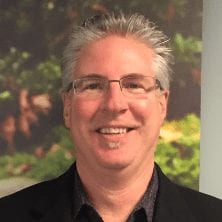
Rick McDonald is the Vice President of Global Supply Chain Operations for The Clorox Company. In this role Rick has responsibility for approximately 5000 people in 23 countries in manufacturing, contract manufacturing, planning, logistics, engineering, quality assurance, safety, health, environment, security and sustainability. His team is responsible for delivering against commitments in the areas of Employee Engagement, Personal Safety, Product Quality, Customer Service, Cost and Enabling Growth. He is the Executive Sponsor of SE ABLE, Clorox’s Black Employee Resource Group. Prior to this role, Rick had an International Supply Chain assignment, reporting to the GM of the International Division. He was accountable for Volume and Profit results as well as Safety, Product Quality, Customer Service, Total Delivered Cost and Enabling Growth. He and his team (located in Atlanta, London, Toronto, Sydney and Hong Kong) interfaced between the business and the function, creating business strategy, current and future year financial forecasts, driving execution and assuring alignment of Supply Chain plans and business plans. Preceding this role, Rick was Clorox’s Vice President of Global Logistics. In this role he was responsible for Customer Service, Distribution Center Operations, Transportation Operations and Supply Chain Management. He owned the company’s Order to Cash process. Rick joined Clorox in 1992. He has held numerous Supply Chain roles from Sourcing and Planning to Plant Management and Logistics as well as several roles reporting to Division GMs. Prior to joining Clorox, Rick worked for Frito-Lay for 10 years in 5 U.S. salty snack food manufacturing plants. He is a former Board member of the Yuhan/Clorox Joint Venture (S. Korea) and served on the Supply Chain Advisory Board at Atlanta Technical College and at Clayton State University. He is a past member of the Chlorine Institute Board of Directors, serving on the Membership Committee and as co-chair of the Customer Stewardship Committee. He served on the Board of Directors for the Barbecue Industry Association and was elected Vice Chairman. An Atlanta native, Rick holds a Bachelor’s of Science degree in Industrial Management from Georgia Tech and lettered as a member of the GT baseball team. His hobbies include go karting and high-speed performance driving.
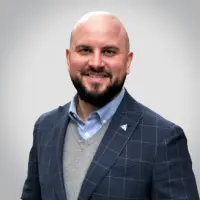
Paul Noble, As Founder and Chief Strategy Officer of Verusen, an innovator in supply chain data, inventory and procurement technology, Paul Noble oversees the company’s vision and strategic direction. He has extensive experience in the industrial supply chain and distribution space, as he was recognized as a Supply Chain Pros to Know by Supply and Demand Chain Executive in 2020, 2021 & 2022. Prior to founding Verusen, Noble spent over a decade with The Sherwin-Williams Company, where he specialized in supply chain/manufacturing and led its Eastern U.S. Industrial Distribution business unit. Noble graduated cum laude with a bachelor’s degree in Management and Marketing from Lincoln Memorial University in Harrogate, Tennessee. Connect with Paul on LinkedIn.
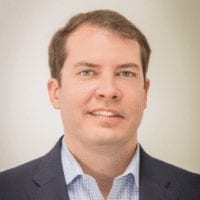
Ben Harris is Director of Supply Chain Ecosystem Expansion for the Metro Atlanta Chamber. Ben comes to the Metro Atlanta Chamber after serving as Senior Manager, Market Development for Manhattan Associates. There, Ben was responsible for developing Manhattan’s sales pipeline and overall Americas supply chain marketing strategy. Ben oversaw market positioning, messaging and campaign execution to build awareness and drive new pipeline growth. Prior to joining Manhattan, Ben spent four years with the Georgia Department of Economic Development’s Center of Innovation for Logistics where he played a key role in establishing the Center as a go-to industry resource for information, support, partnership building, and investment development. Additionally, he became a key SME for all logistics and supply chain-focused projects. Ben began his career at Page International, Inc. where he drove continuous improvement in complex global supply chain operations for a wide variety of businesses and Fortune 500 companies. An APICS Certified Supply Chain Professional (CSCP), Ben holds an Executive Master’s degree in Business Administration (EMBA) and bachelor’s degree in International Business (BBA) from the Terry College at the University of Georgia. Learn more about the Metro Atlanta Chamber here: www.metroatlantachamber.com
